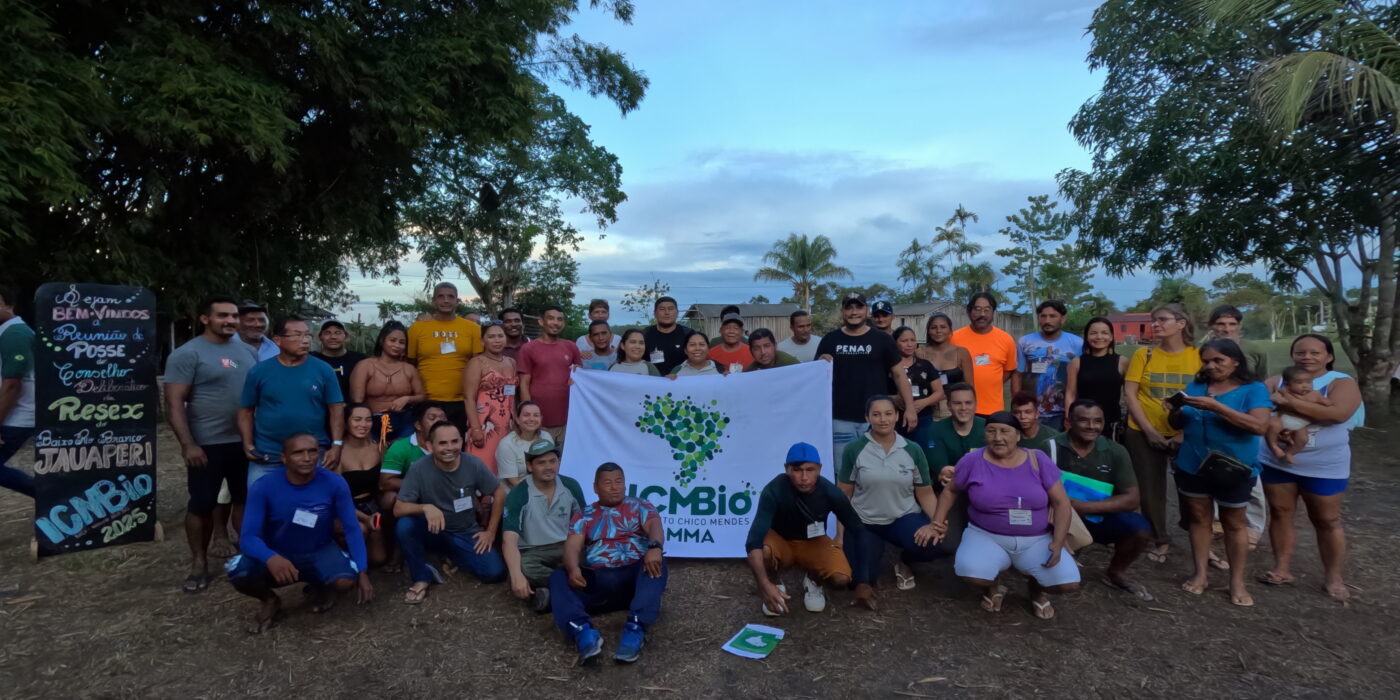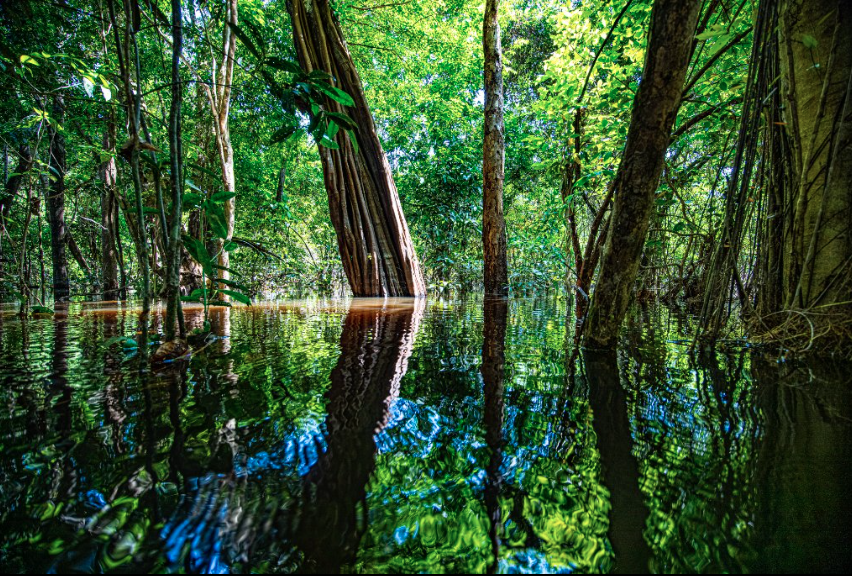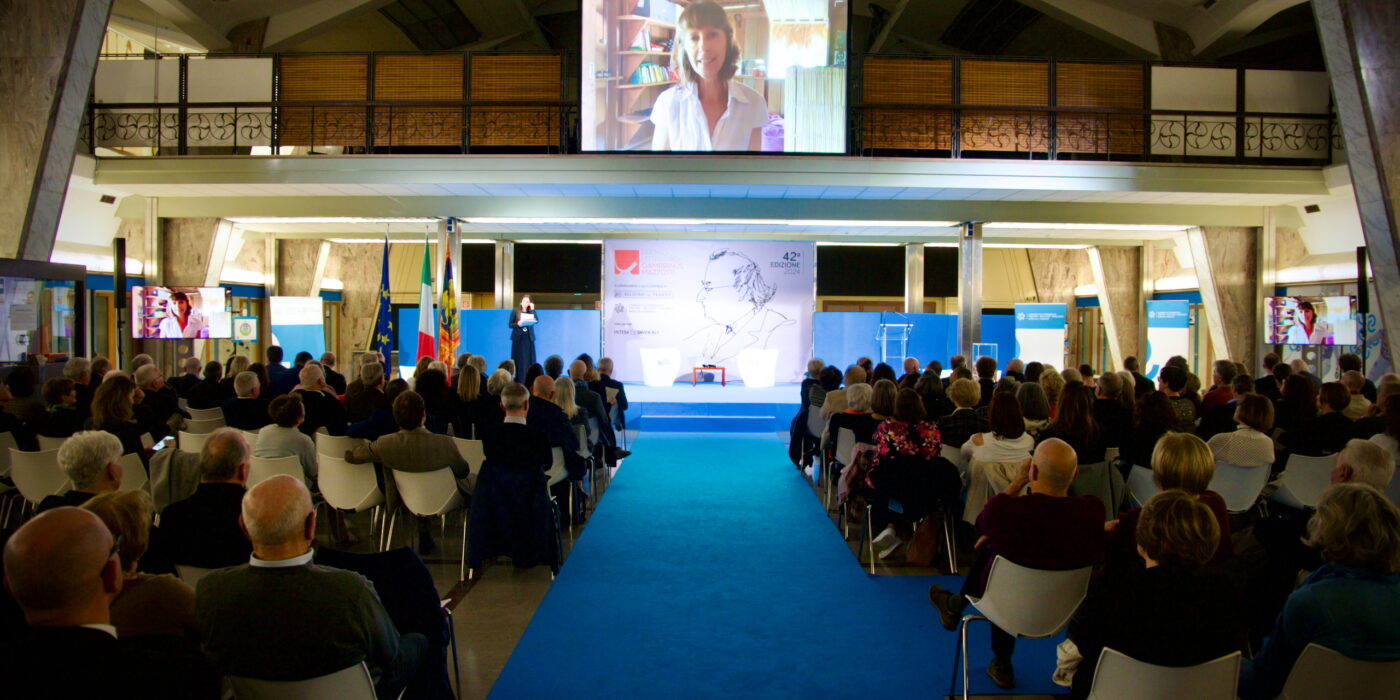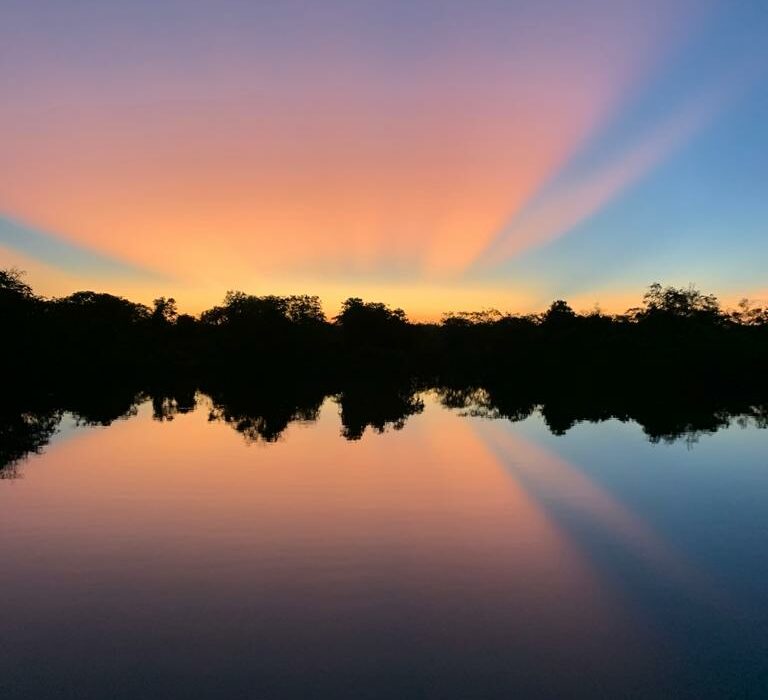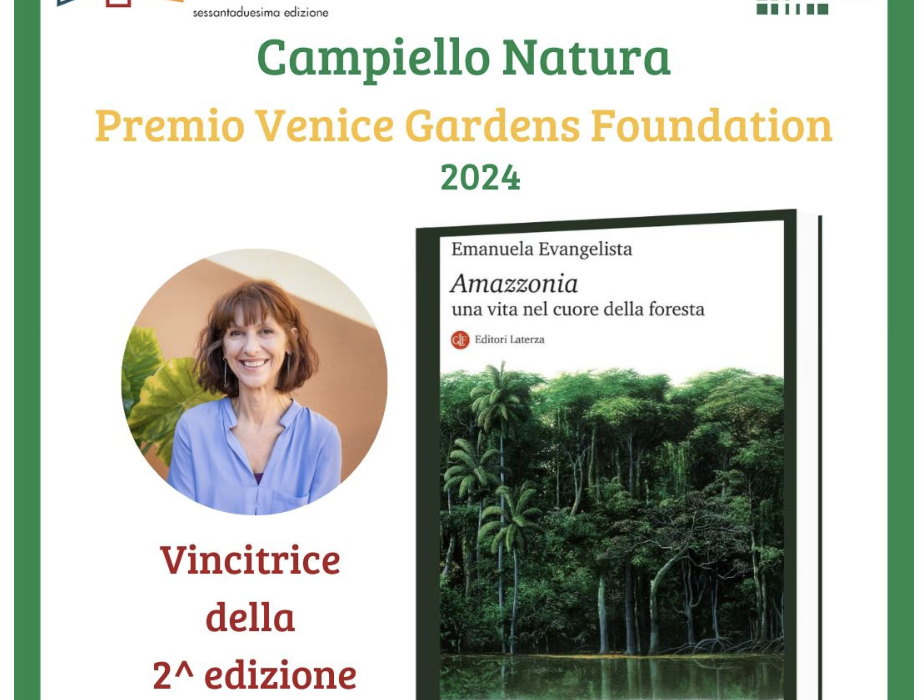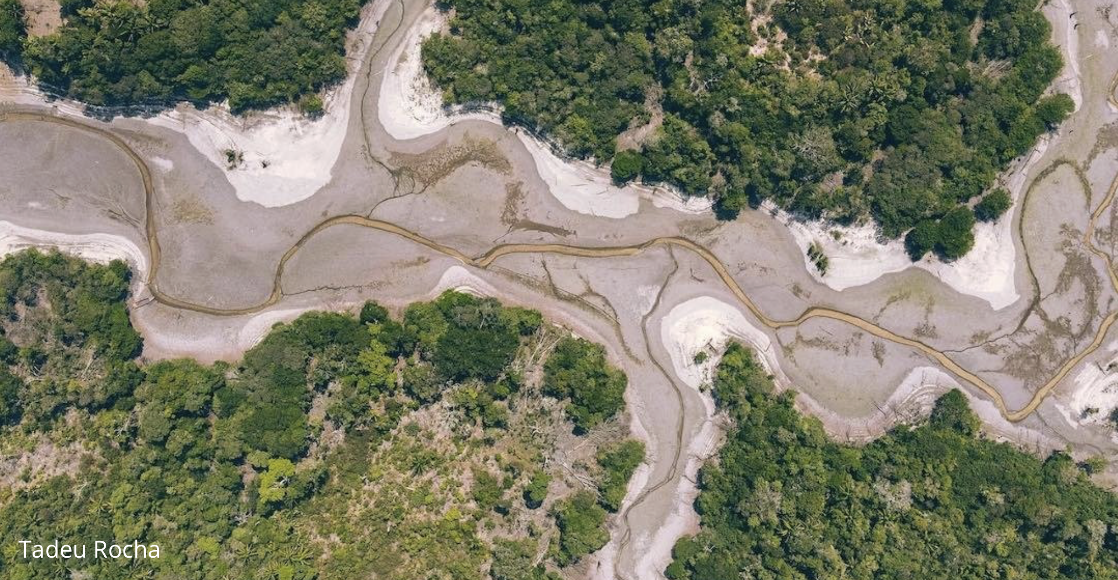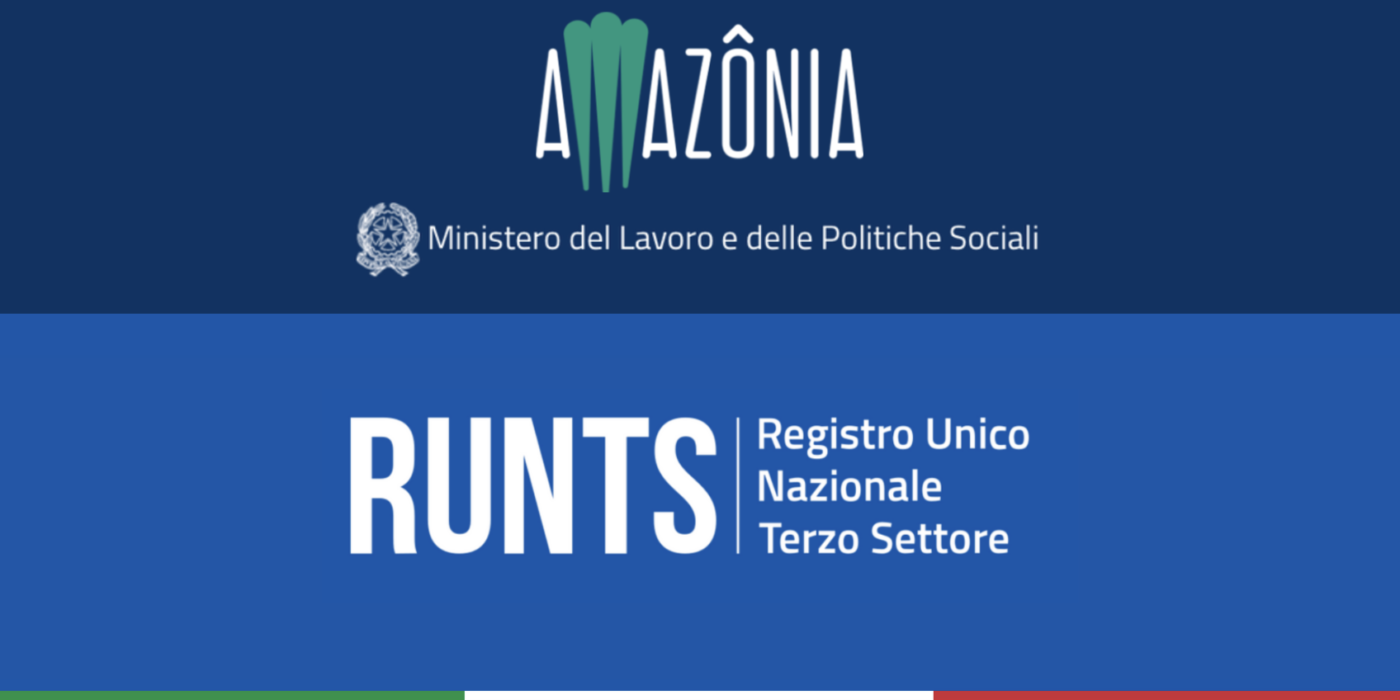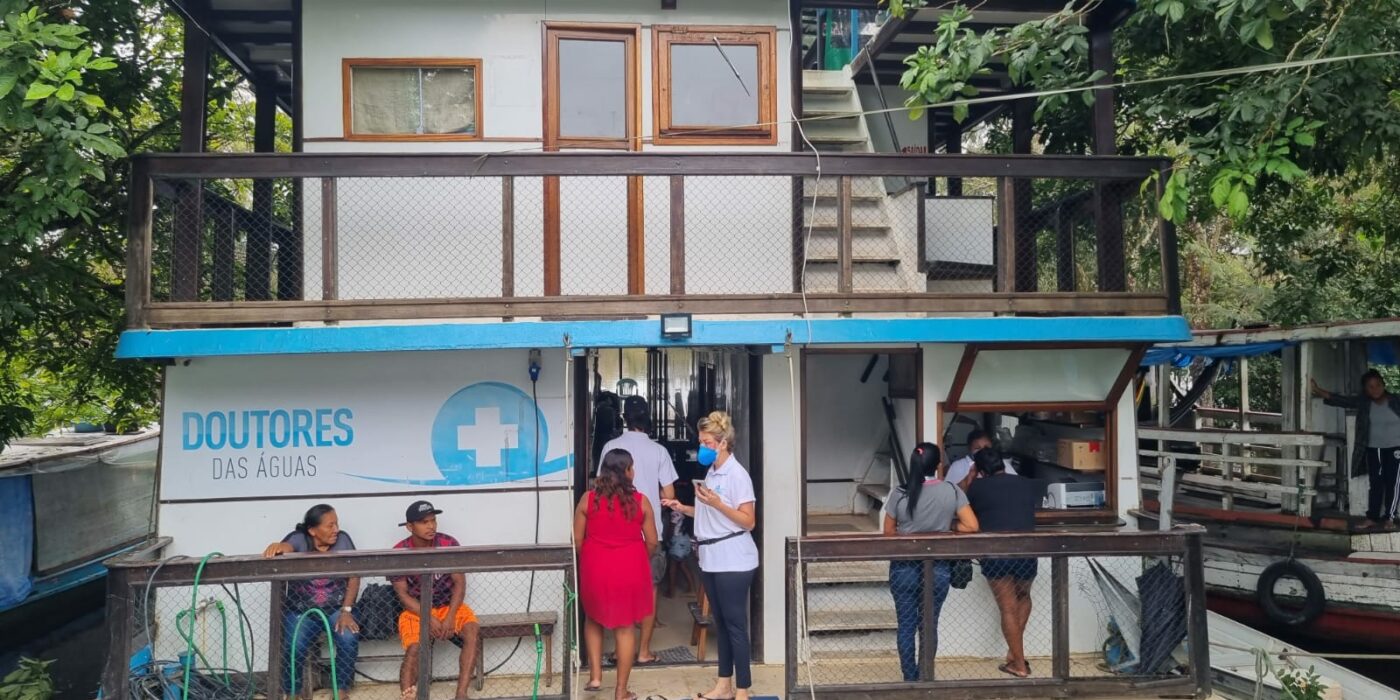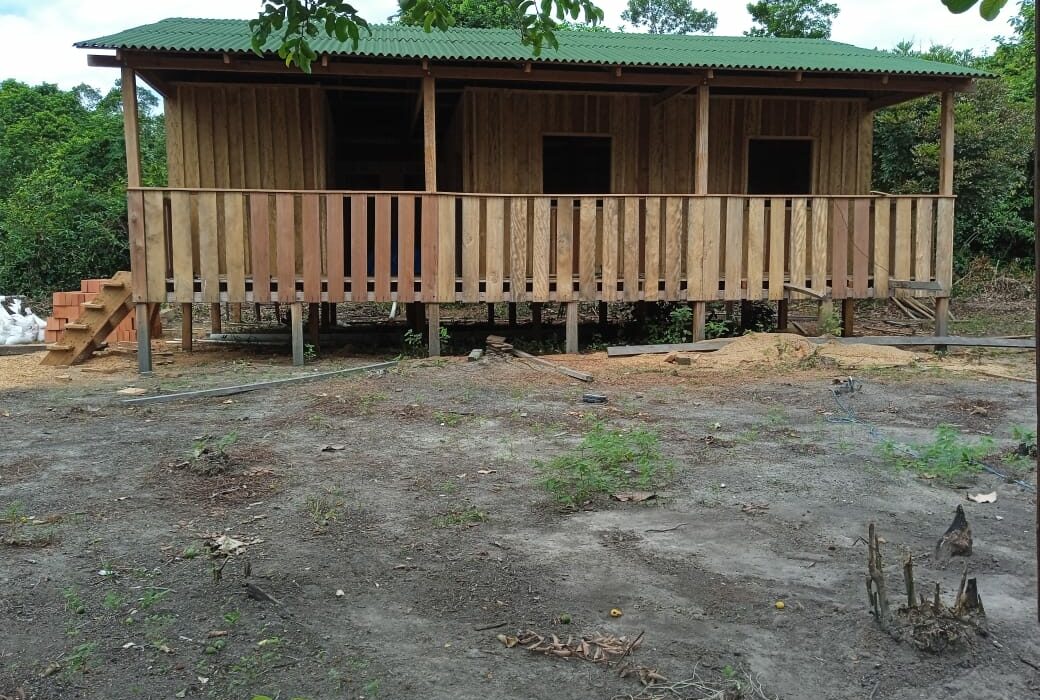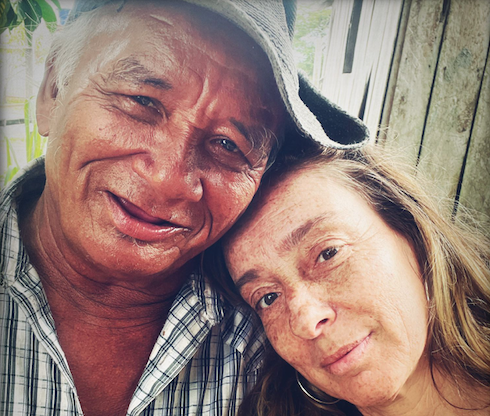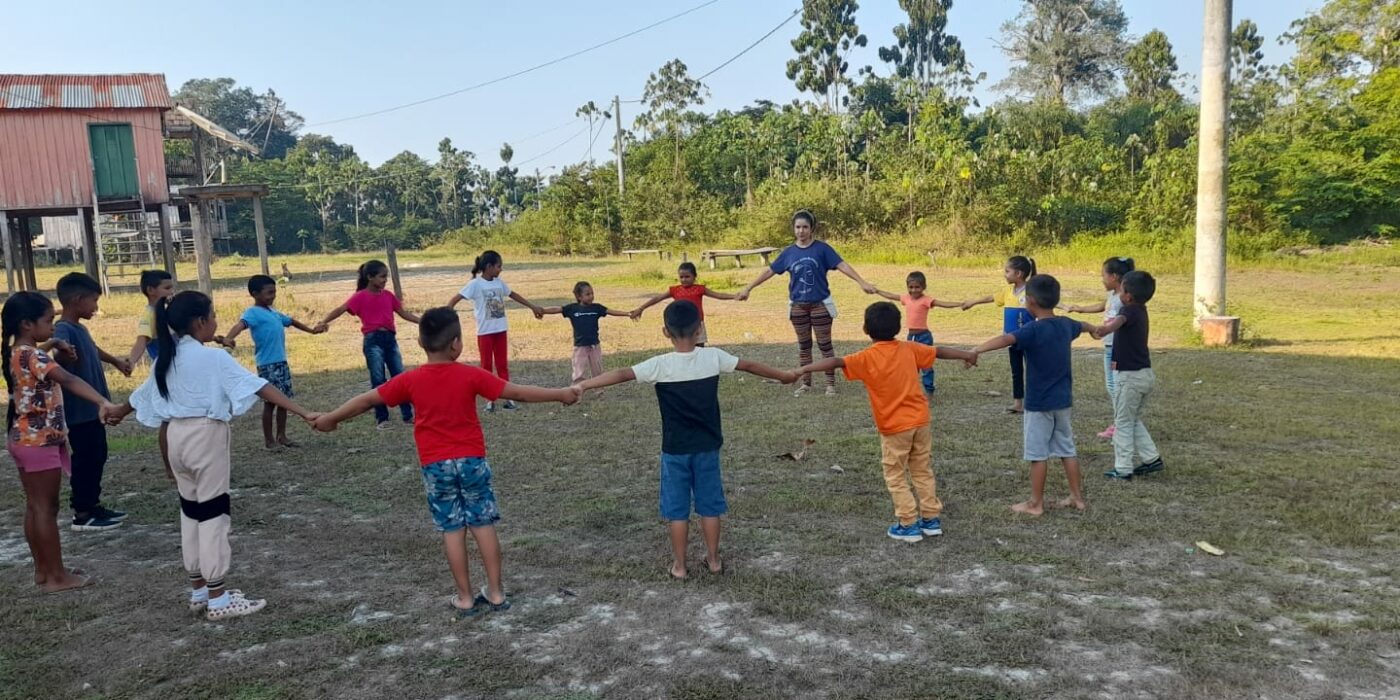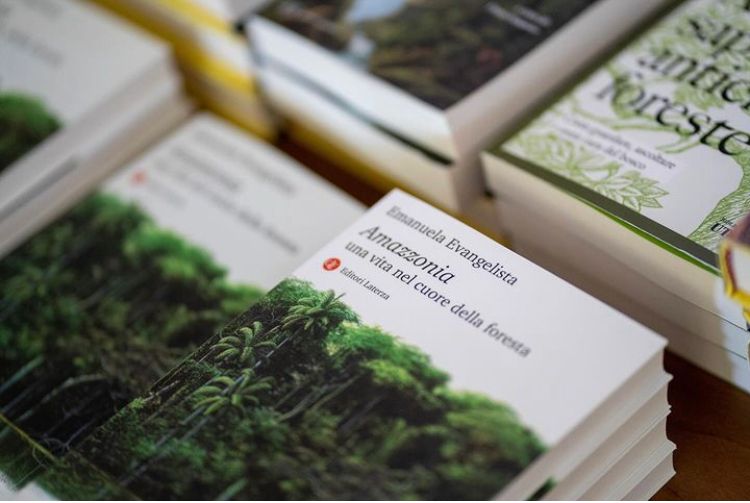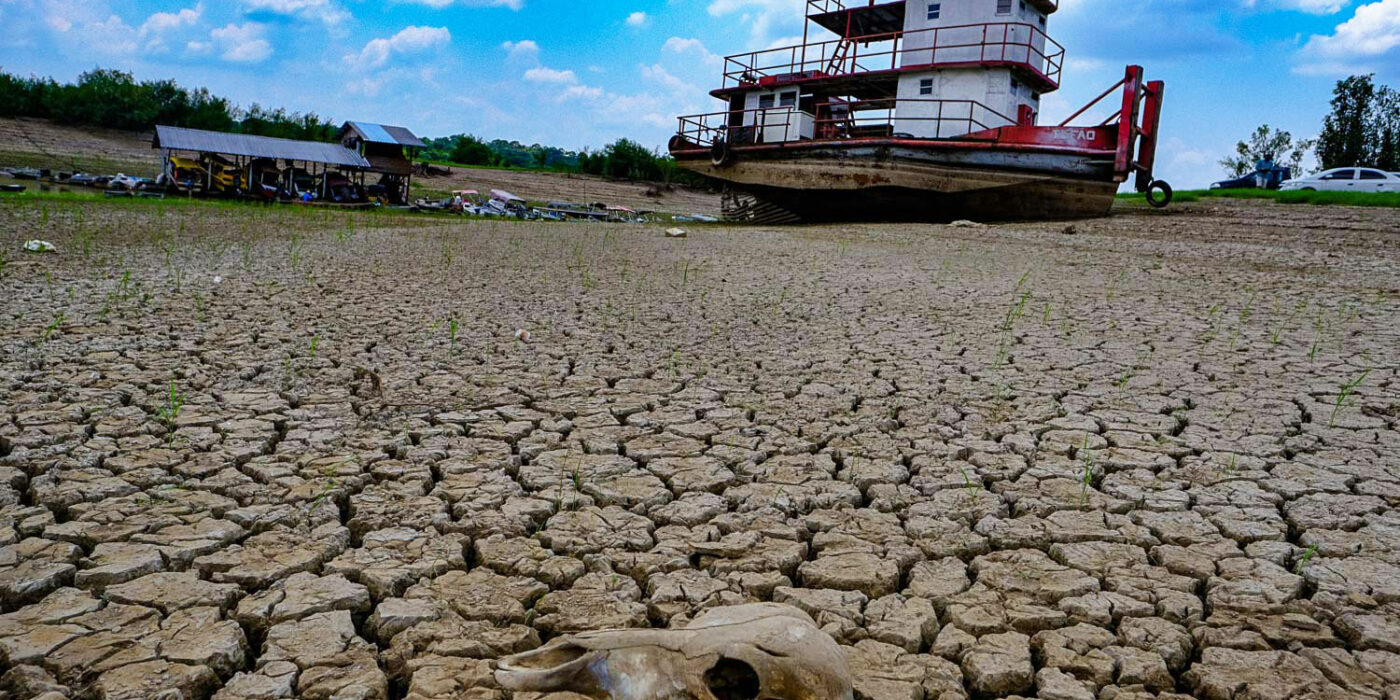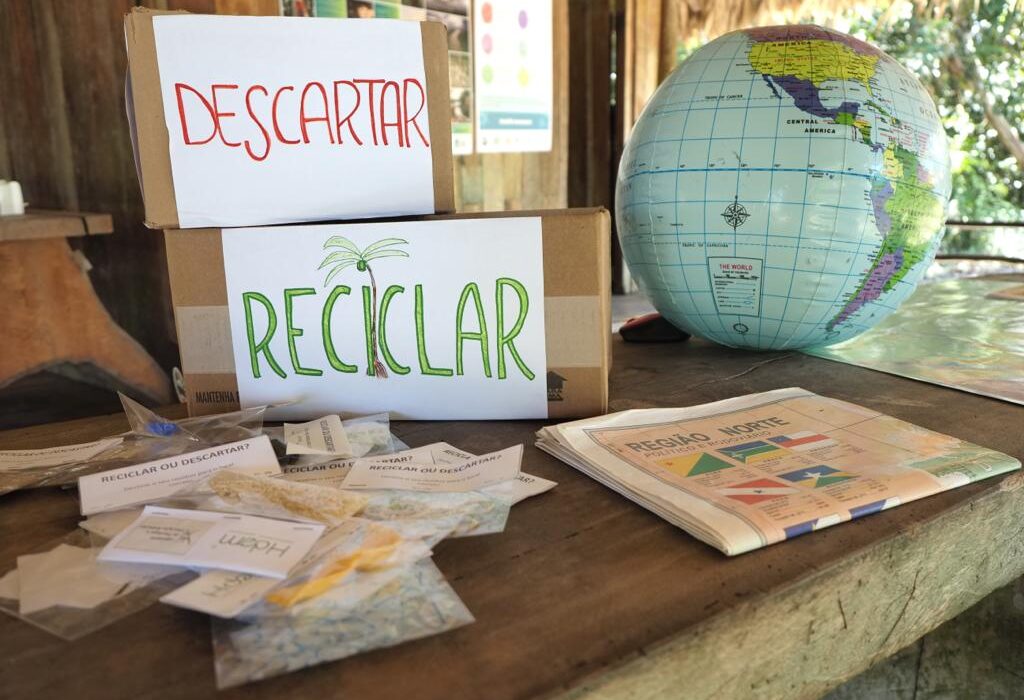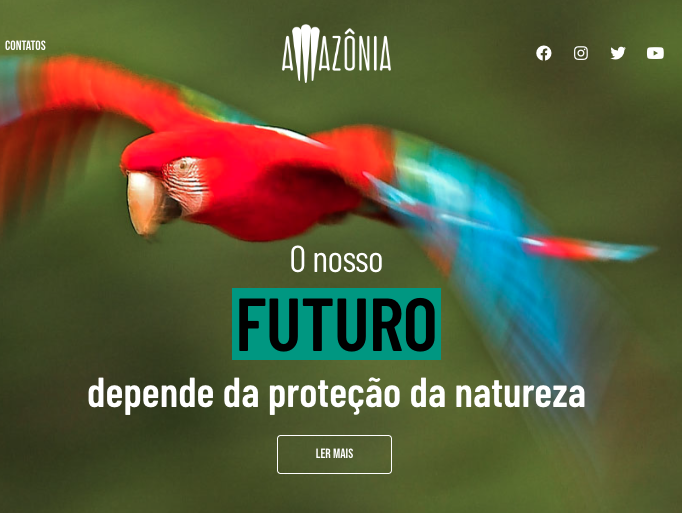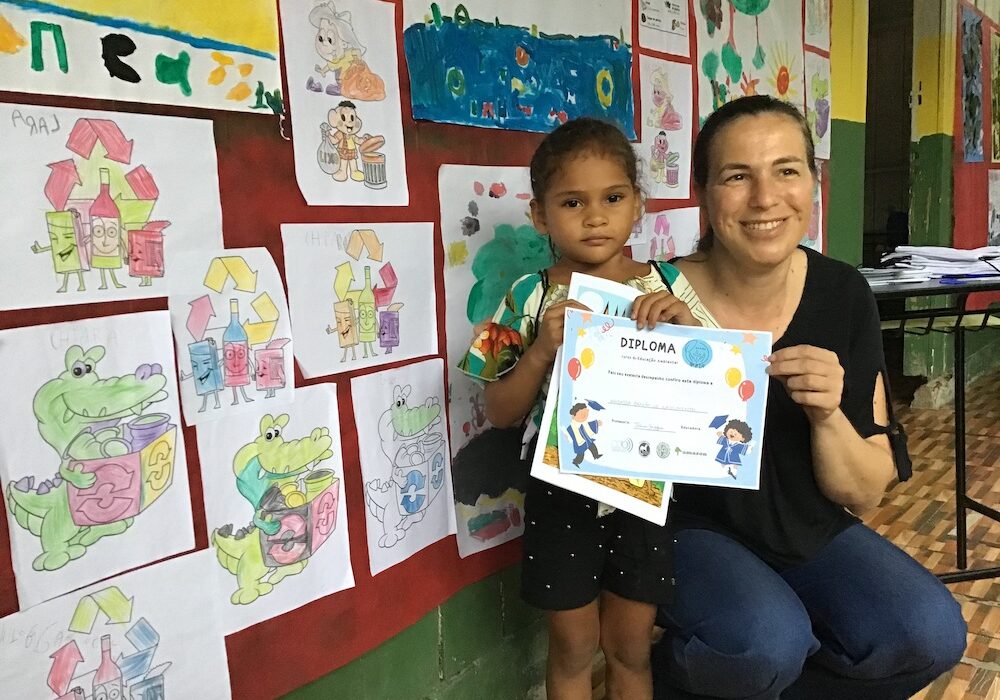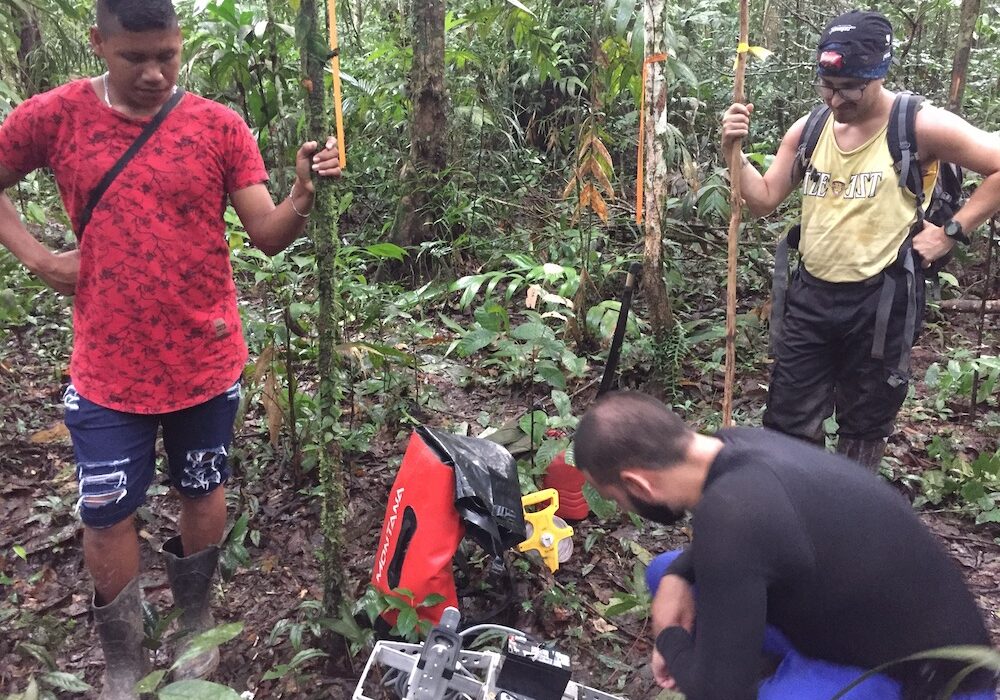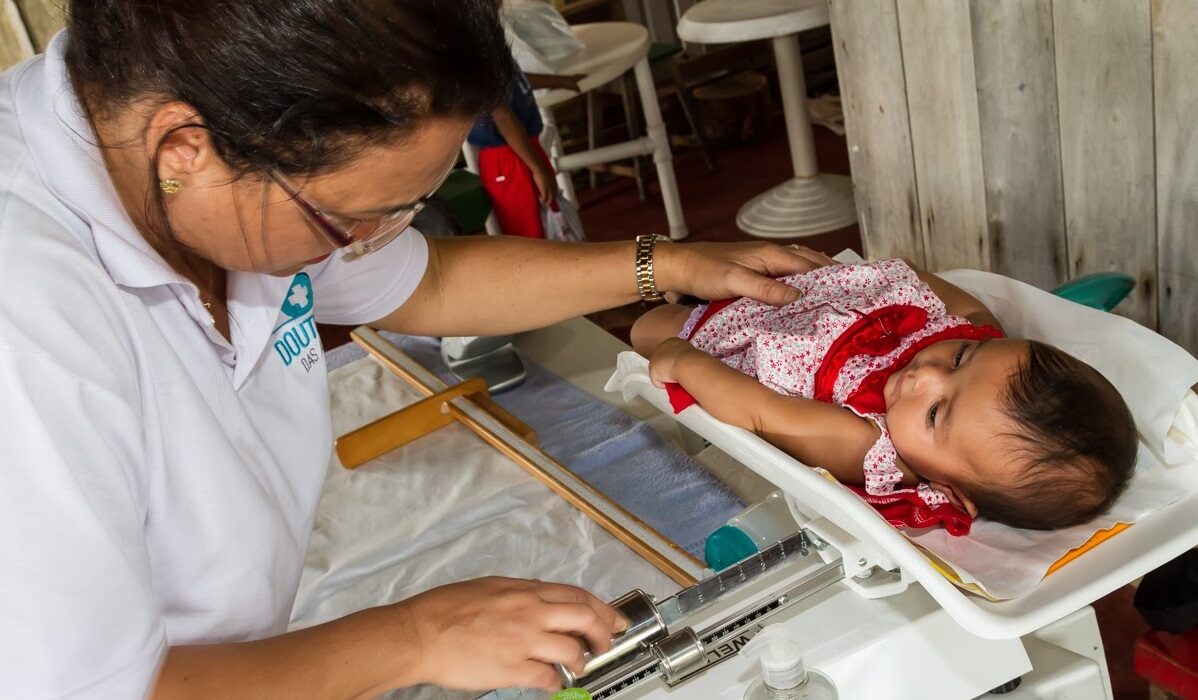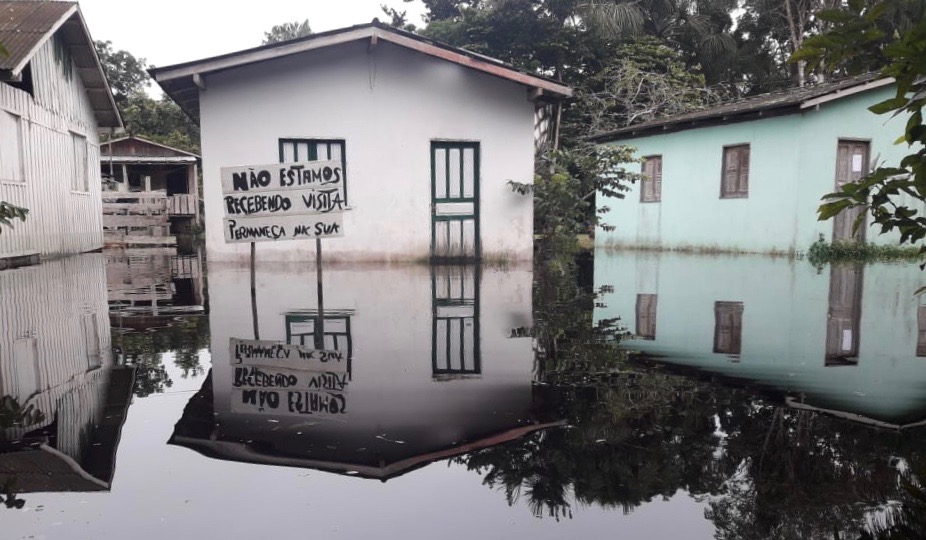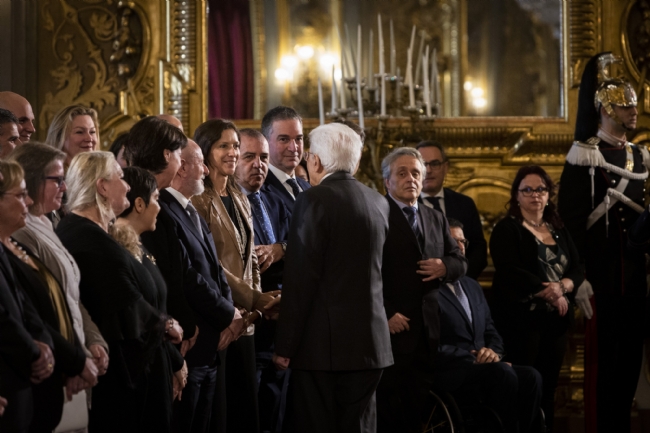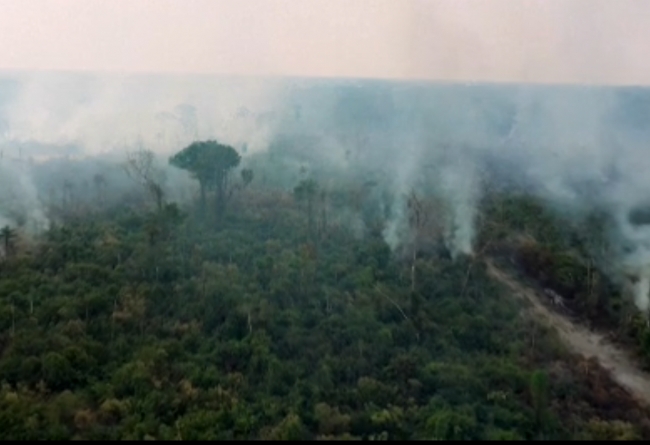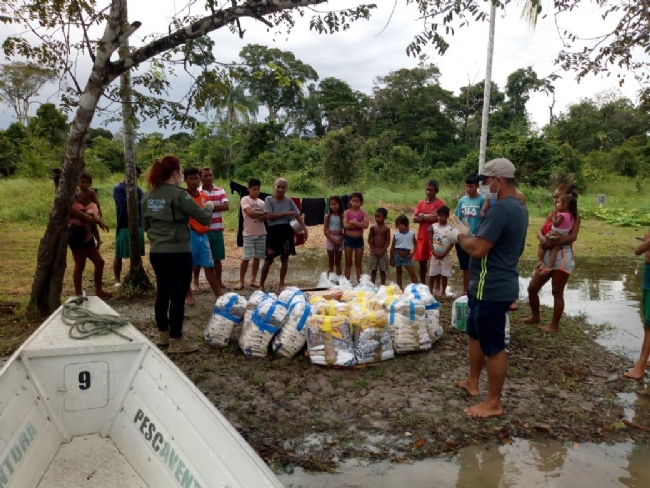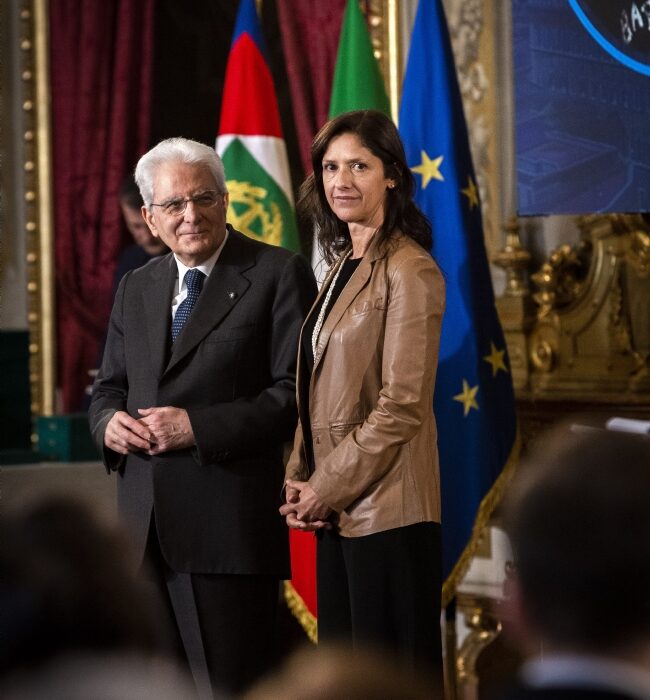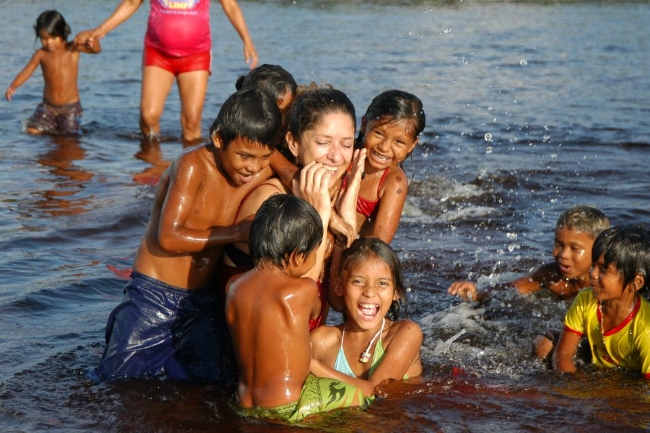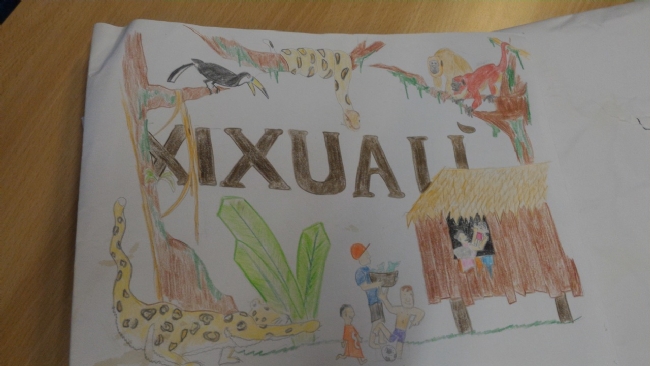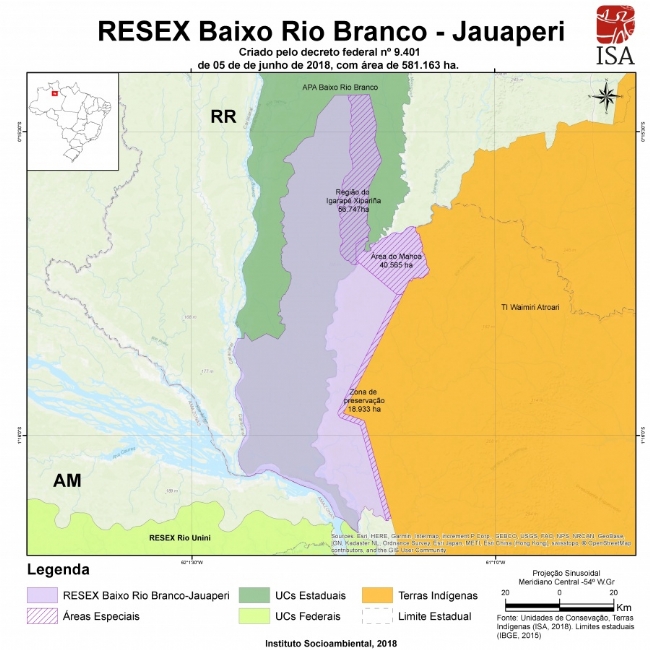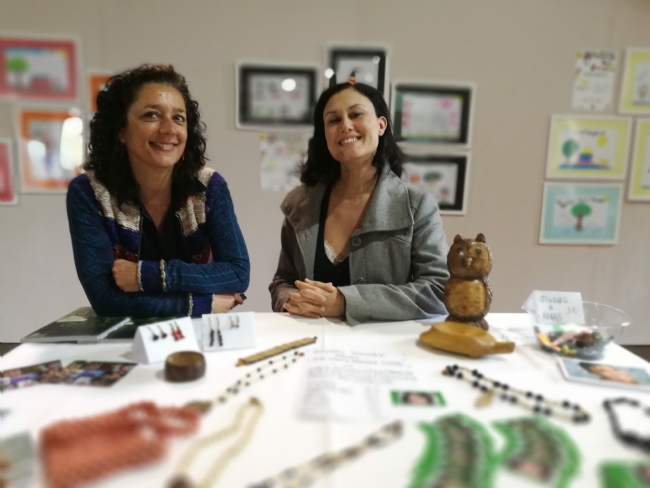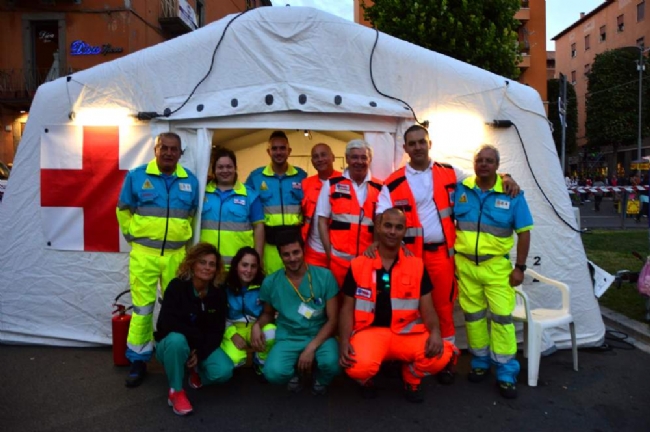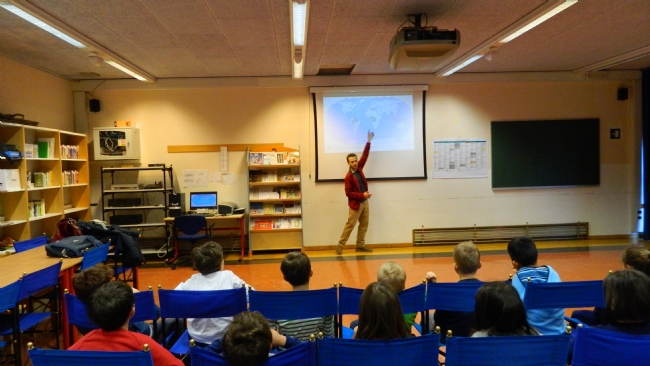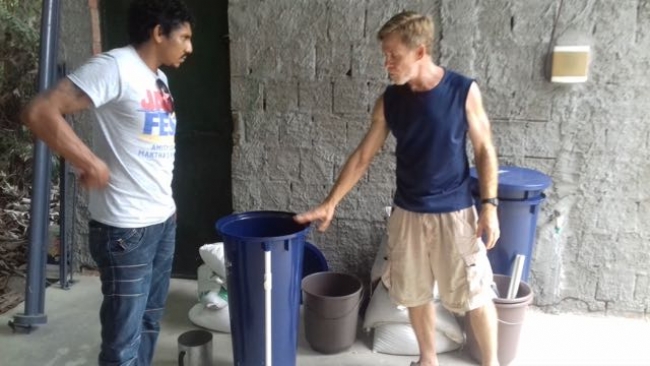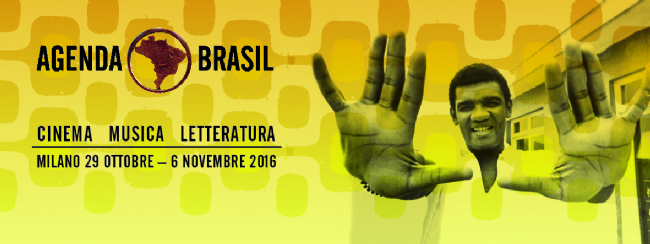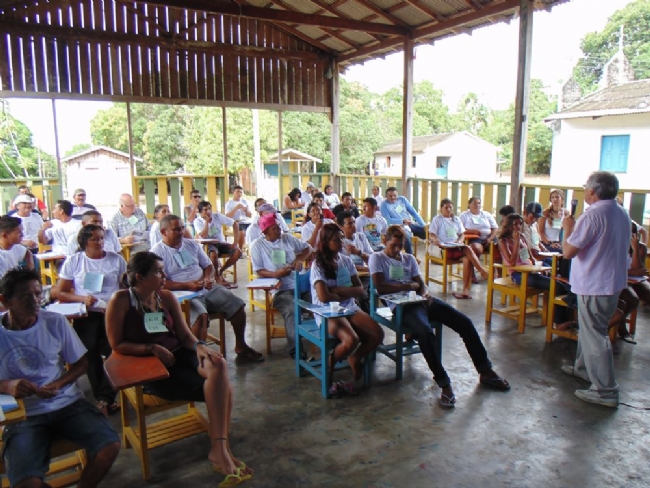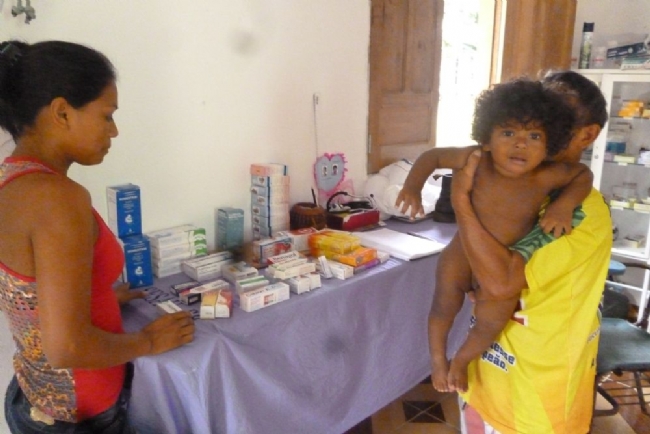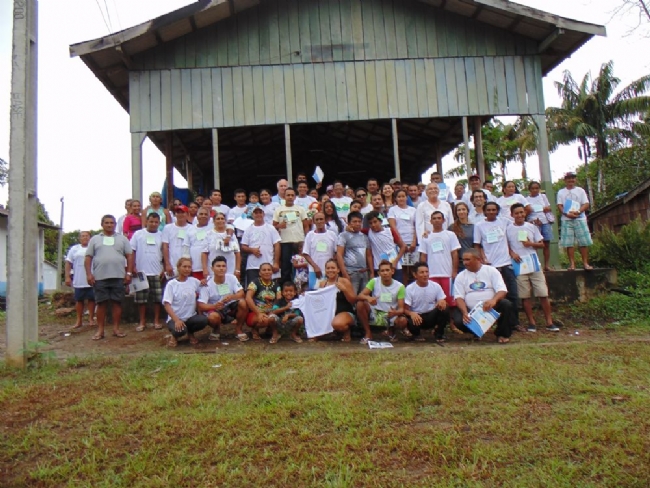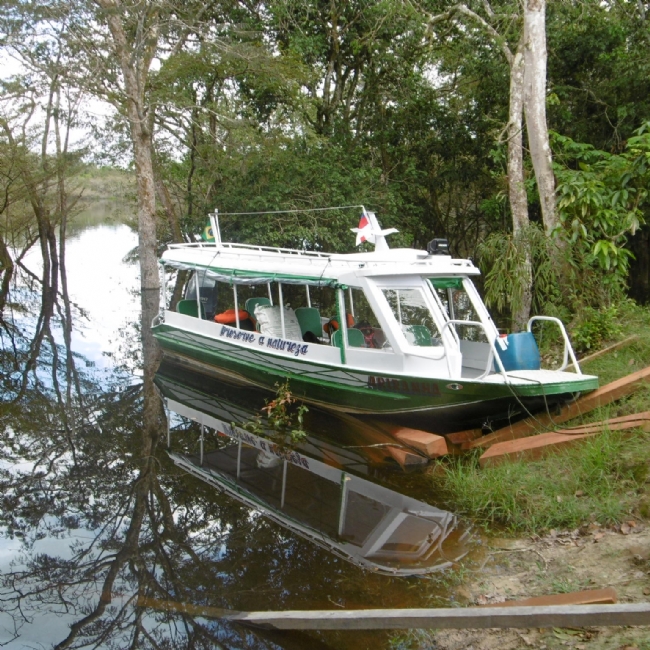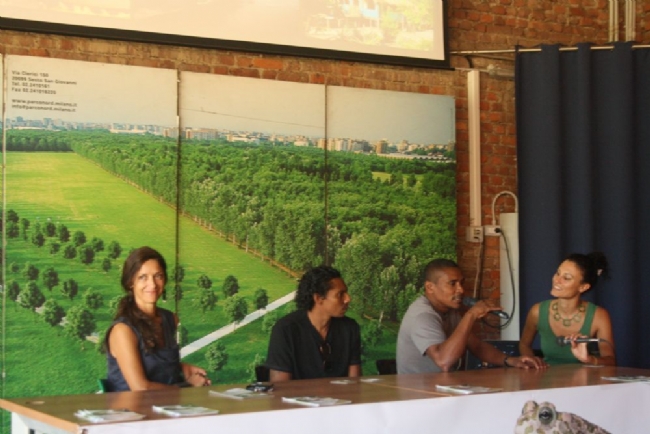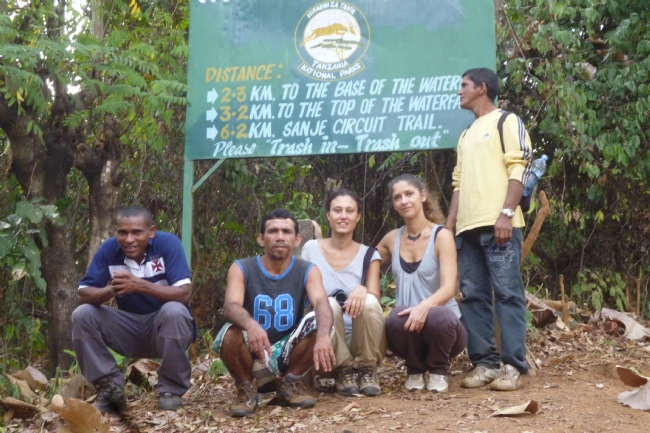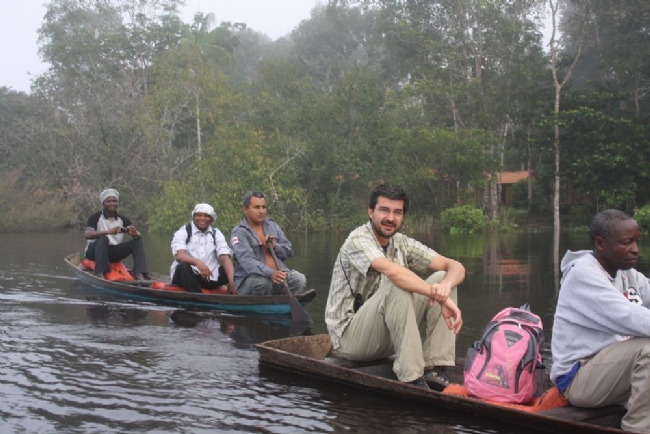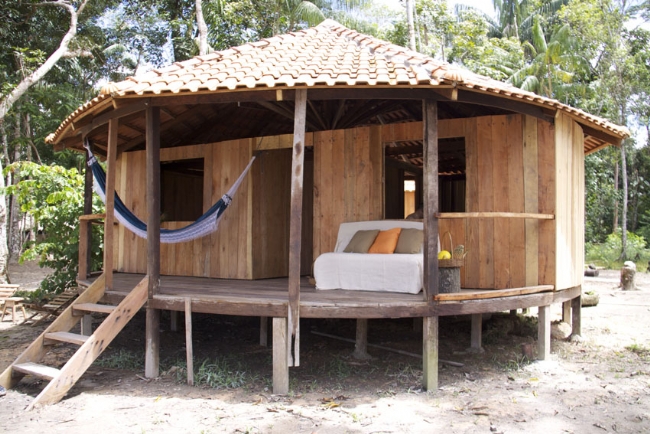A New Step Towards Conservation and Sustainability in the Baixo Rio Branco-Jauaperi Reserve: The Deliberative Council
Between February 19 and 20, 2025, the first official meeting of the Deliberative Council of the Baixo Rio Branco-Jauaperi Extractive Reserve (Resex) took place. The meeting, held in the Itaquera Community, on the Jauaperi River, brought together various community leaders and local grassroots organizations, as well as government representatives, researchers, and third-sector organizations—including Amazônia and its partner organization Amazon Charitable Trust.
Brief History of the Creation of the Reserve
The history of the Baixo Rio Branco-Jauaperi Reserve began in the early 2000s, when traditional residents, riverine communities and Indigenous peoples, supported by civil society organizations, initiated a mobilization process with the federal government to establish a Protected Area in the region. At the time, the territory—situated on the border between the states of Roraima and Amazonas—faced strong pressures from logging interests, agribusiness, and the intensive use of natural resources, especially timber and fishing, due to the abundance of fish in the Jauaperi River.
After 17 years of mobilization and resistance, in 2018, Baixo Rio Branco-Jauaperi Extractive Reserve was finally officially recognized, acknowledging the need to protect local biodiversity and ensure the survival of the extractive population in the region. Read more here.
The Importance of Planning and Management
However, the mere creation of a Protected Area does not, in itself, guarantee the effective protection of the territory and its traditional peoples. It is essential to have planning and investment in resources—both financial and human—to ensure the proper management of the region, under the responsibility of the Chico Mendes Institute for Biodiversity Conservation (ICMBio). Protected Areas in Brazil follow the guidelines of the National System of Nature Conservation Units (SNUC), which provides mechanisms for the participation of traditional communities in Sustainable Use Conservation Units, such as Extractive Reserves. One of these mechanisms is precisely the Deliberative Council, a forum for dialogue and decision-making that directly impacts the territory and its residents.
The First Official Meeting of the Deliberative Council
Seven years after its official recognition, the Baixo Rio Branco-Jauaperi Reserve took a crucial step: on February 19, 2025, the Deliberative Council was officially established. Composed of 38 seats—20 for communities and local organizations, 13 for government, research, and educational institutions, and 5 for civil society organizations—the Council was sworn in by Hueliton Ferreira, Head of the Integrated Management Center of ICMBio in Novo Airão. Over the two-day meeting, in addition to the swearing-in ceremony, training sessions were provided to the new council members, and priority topics for the protection of the Reserve were discussed, such as the installation of an ICMBio support base, as well as sustainable development for local communities, focusing on fishing, agriculture, and extractivism.
Key Topics and Priorities
During the meeting, the council members identified several priority areas, including:
- Development of the Reserve Management Plan
- Bioeconomy
- Lifting of the Fishing Restrictions on the Jauaperi River
- Strengthening Family Agriculture
For each topic, working subgroups and Thematic Chambers were formed, responsible for drafting action plans to be implemented throughout 2025.
The Bioeconomy Thematic Chamber
Amazônia and Amazon Charitable Trust took the lead in coordinating the Bioeconomy Thematic Chamber, alongside other civil society organizations and some local community representatives. The objective is to strengthen and develop extractivism and sociobiodiversity chains, meaning alternative income generation opportunities for local populations while preserving the forest and respecting traditional ways of life.
Among the planned actions, key initiatives include: mapping existing initiatives in the region, collaborating with research, education, and technical assistance institutions, promoting exchanges and market access that enhance the value of sociobiodiversity products and ensure fair prices.
Next Steps and Acknowledgments
Amazônia expresses its gratitude to the residents of the Baixo Rio Branco-Jauaperi Reserve, who have actively fought for and supported the development of initiatives in the region, and to its partner Amazon Charitable Trust for its continuous support and participation in this process. It also congratulates the team of the Integrated Management Center of Novo Airão of ICMBio for this important achievement, as well as all the other partner institutions that now form the Deliberative Council. This represents a significant step towards the protection of one of the richest and most important regions in the heart of the Amazon Rainforest, promoting a participatory management model that values and protects both the biodiversity and the traditional communities that inhabit it.
To learn more about the actions of the Deliberative Council of the Resex of Baixo Rio Branco-Jauaperi and follow the next steps of the project, continue following us here on the blog and on our social media channels.
To learn more, read this article (in Portuguese).
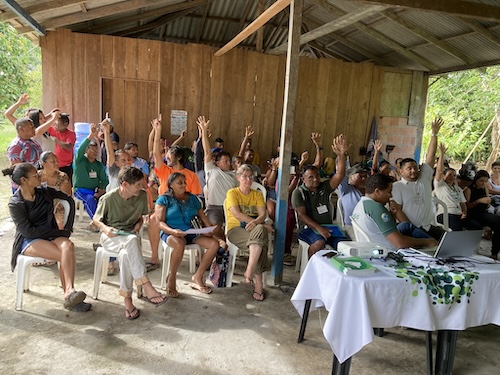
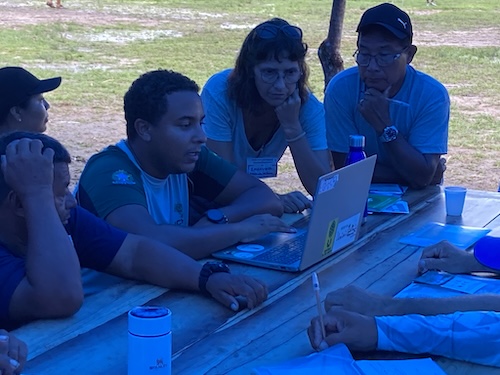
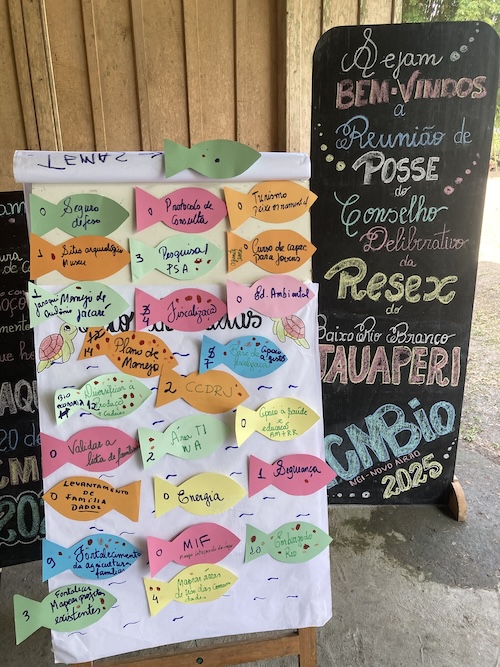
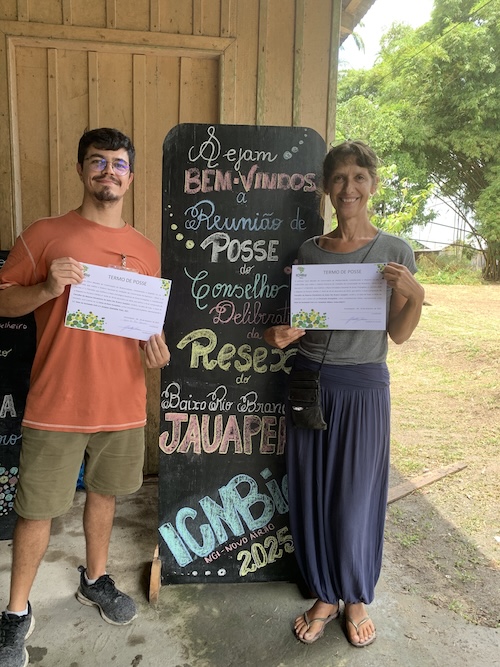
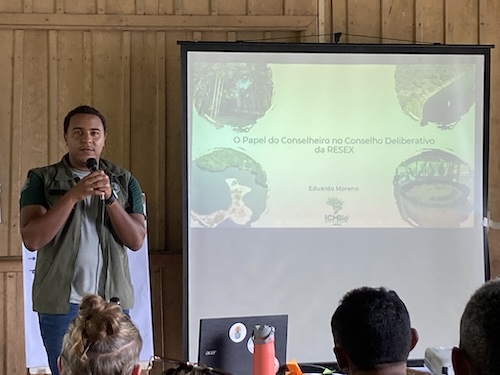
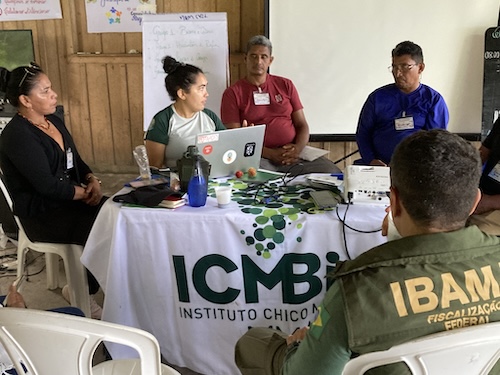
RESTORING NATURE’S BALANCE: REWILDING
What is rewilding and who theorized it
The term “rewilding” refers to the process of rebuilding a natural ecosystem, following human interference, so that, through the restoration of its natural processes and its original biological community, it becomes self-sustaining, self-sufficient, and resilient. Human management within the ecosystem should therefore be minimal, limited, for example, to the reintroduction of wild animals or the reopening of old water routes.
The concept emerged in the 1980s, but it was through an important study in 1998 by two American biologists, Michael Soulé and Reed Noss, that it was given a concrete scientific foundation, based on three fundamental characteristics, known as the ‘3Cs’: cores, which are highly protected natural reserve areas; corridors, which are large areas that allow wildlife movement and their search for food, connecting the cores, which typically are not large enough on their own; and carnivores, species whose importance in ecosystems was supported by several scientific studies, showing how major changes in ecosystems, such as species loss, were often caused by their disappearance.
The Example of Yellowstone National Park
An example of successful rewilding that highlighted the fascinating complexity of how ecosystem elements intertwine was the repopulation of wolves in Yellowstone National Park in the United States. Wolves had become extinct in Yellowstone by the 1930s due to indiscriminate hunting. One of the direct effects was a reduction in predation pressure on elk, whose population then increased significantly, leading to negative environmental effects: exceeding the park’s carrying capacity and a failure to migrate during winter, which in turn caused them to feed on willow plants, a winter food for beavers.
With the reintroduction of wolves in 1995, the entire chain of events reversed: elk began to move again, beavers resumed feeding on willow, and through building ponds, they had a positive impact on the hydrology of the waterways.
The Yellowstone case demonstrated how delicate and essential the ecological role of a single animal species in a specific area is for maintaining ecosystem balance.
Environmental and Social Benefits
The benefits of rebuilding a natural ecosystem are numerous and extend beyond the environmental sphere. Transforming natural ecosystems into truly functioning ecosystems, made up of a wide range of interconnected plants and animals, primarily enables the mitigation of the environmental crises affecting the planet, including biodiversity loss and climate change. Properly functioning ecosystems also ensure filtered air from trees and clean water.
In addition to the fundamental environmental benefits, important positive effects are also seen on the social front. Restoring lands and seas can create a thriving ecosystem of employment. Some examples include livestock management through naturalist guides, organizing community activities, and offering the possibility to visit the area to observe the rebounding wildlife, enjoying unique ecotourism experiences.
Rewilding in Brazil
In Brazil, several rewilding projects have been implemented, some promoted by the association Re:wild, and others carried out in the Santa Catarina region, where iconic species of the territory, such as the bird Amazona vinacea, have been reintroduced since 2010. Additionally, Amazônia, through the “Together We Plant the Future” project, has participated in the conservation and ecological restoration of the Amazon rainforest along the border between the Brazilian states of Maranhão and Pará, combining these environmental goals with the socioeconomic development of local communities.
Photos: Alberto Cambone, Roberto Isotti, Barry Cawston, Emiliano Mancuso, Sandro Santioli, Homo Ambiens Isotti
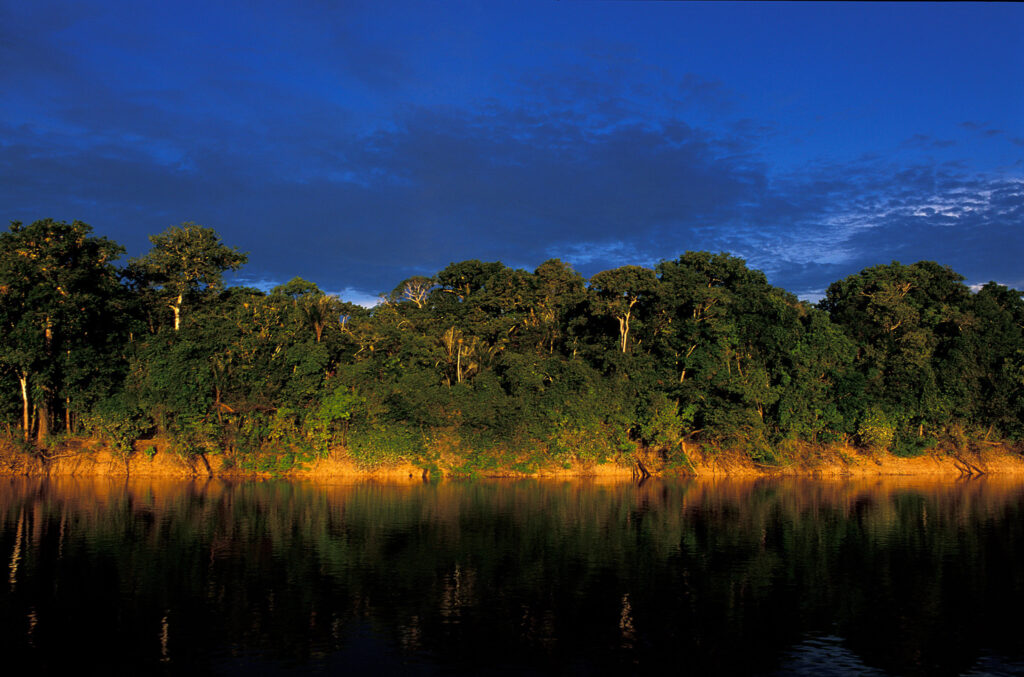
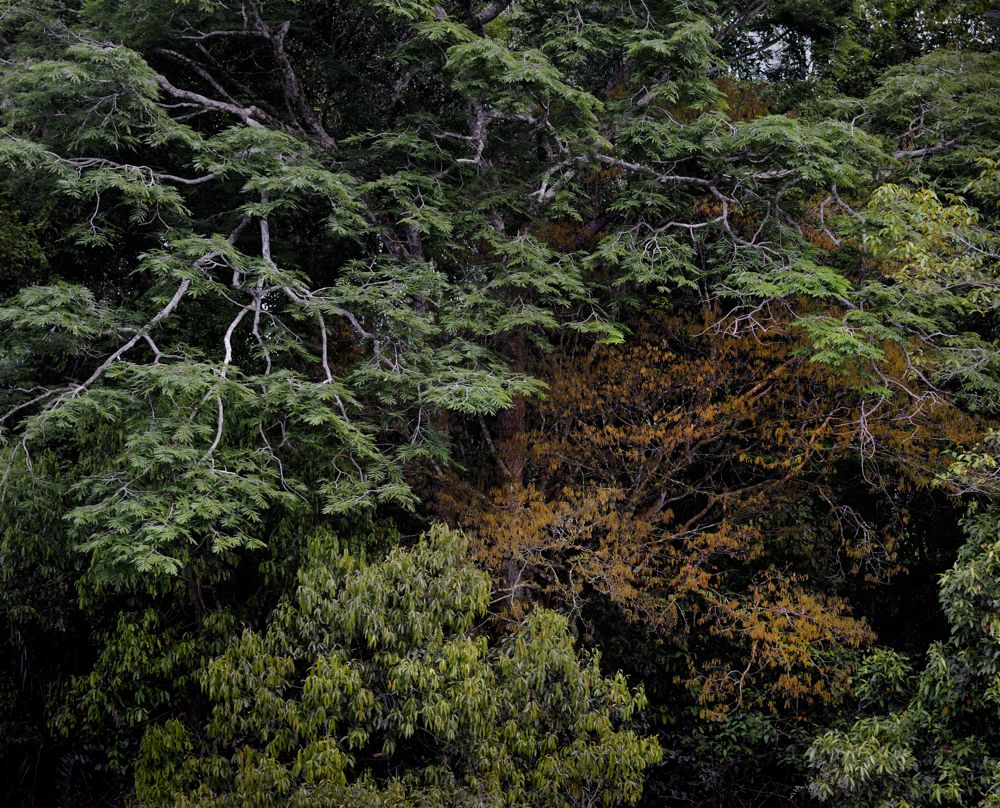
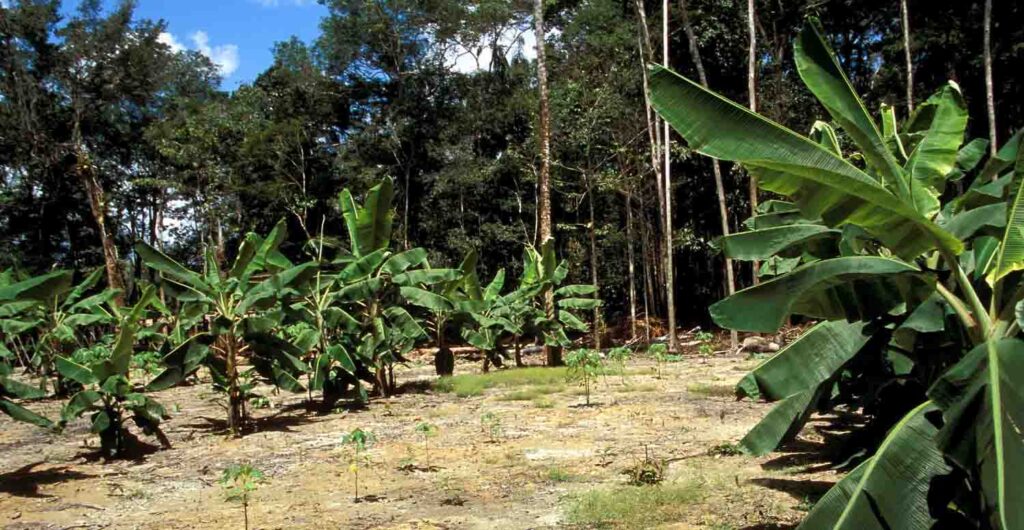
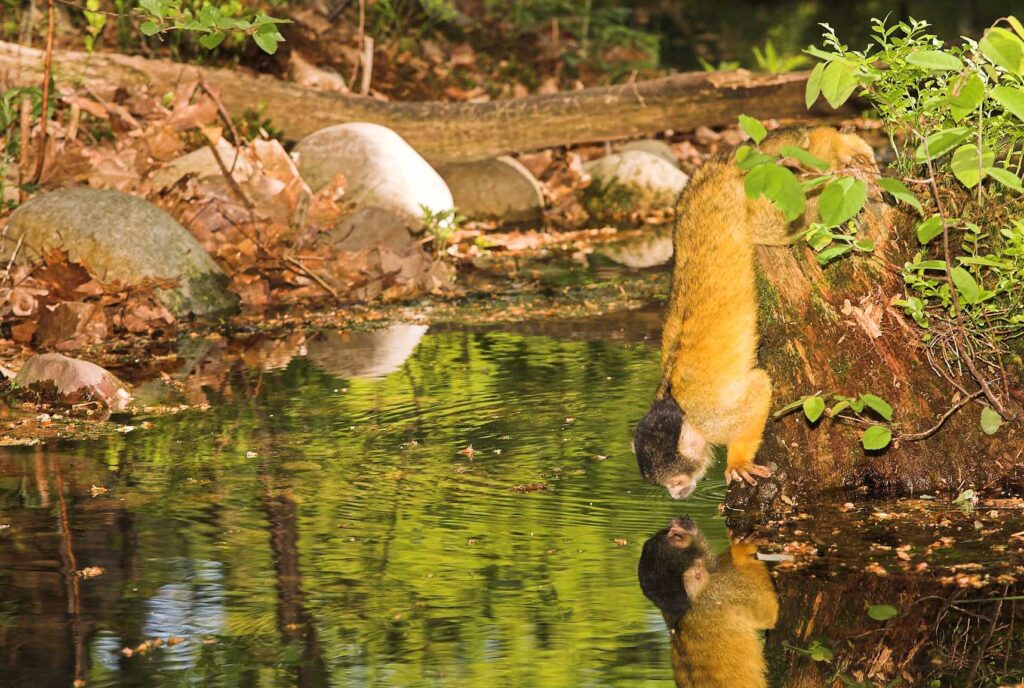
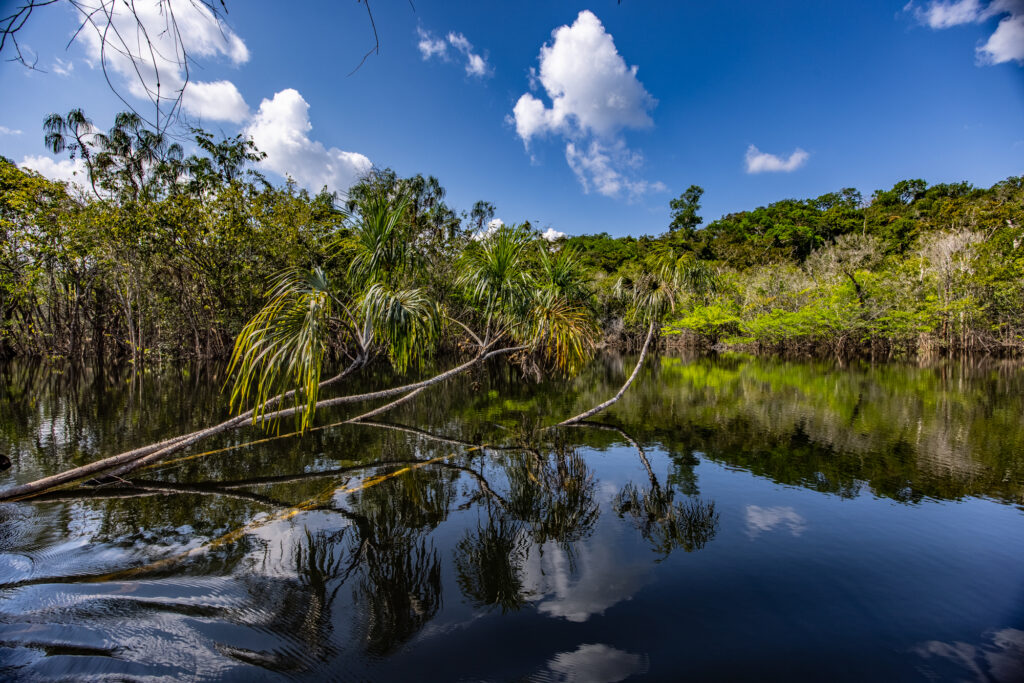
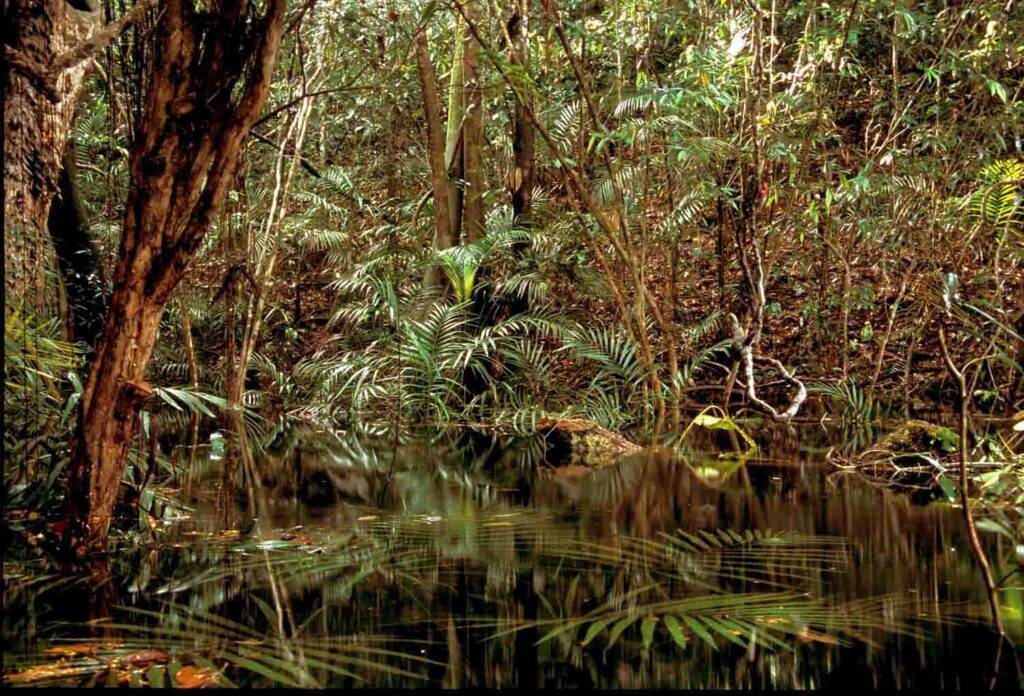
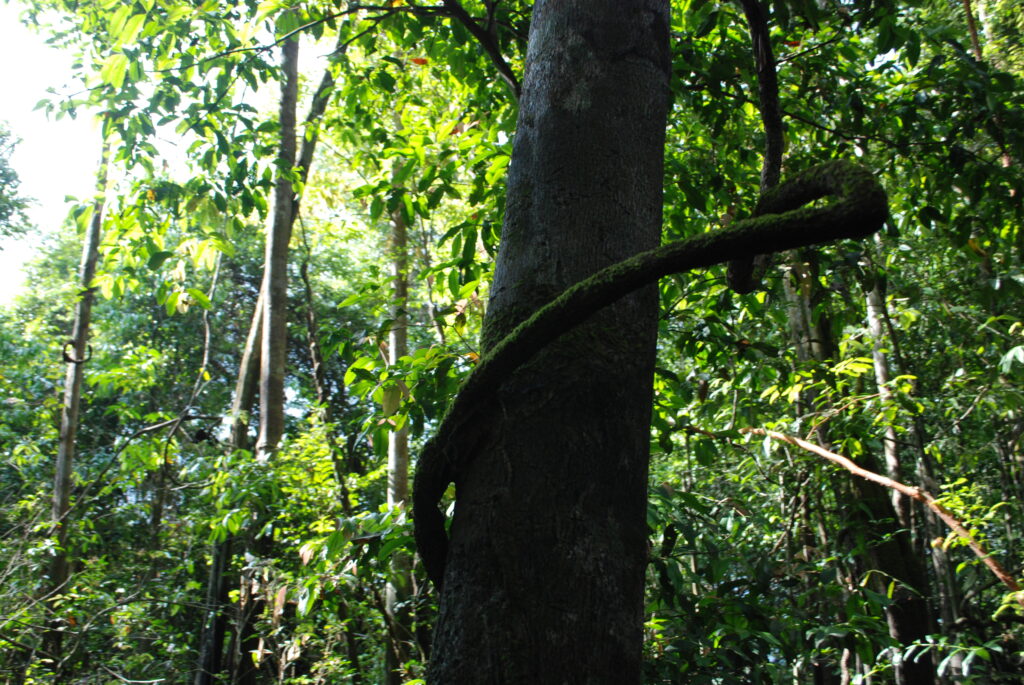
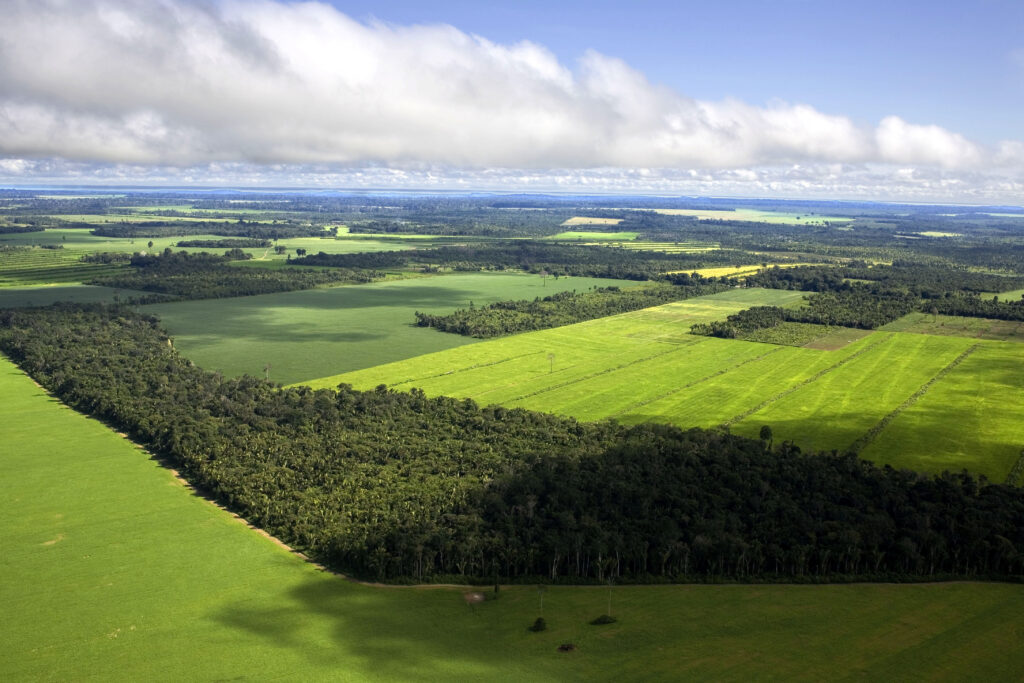
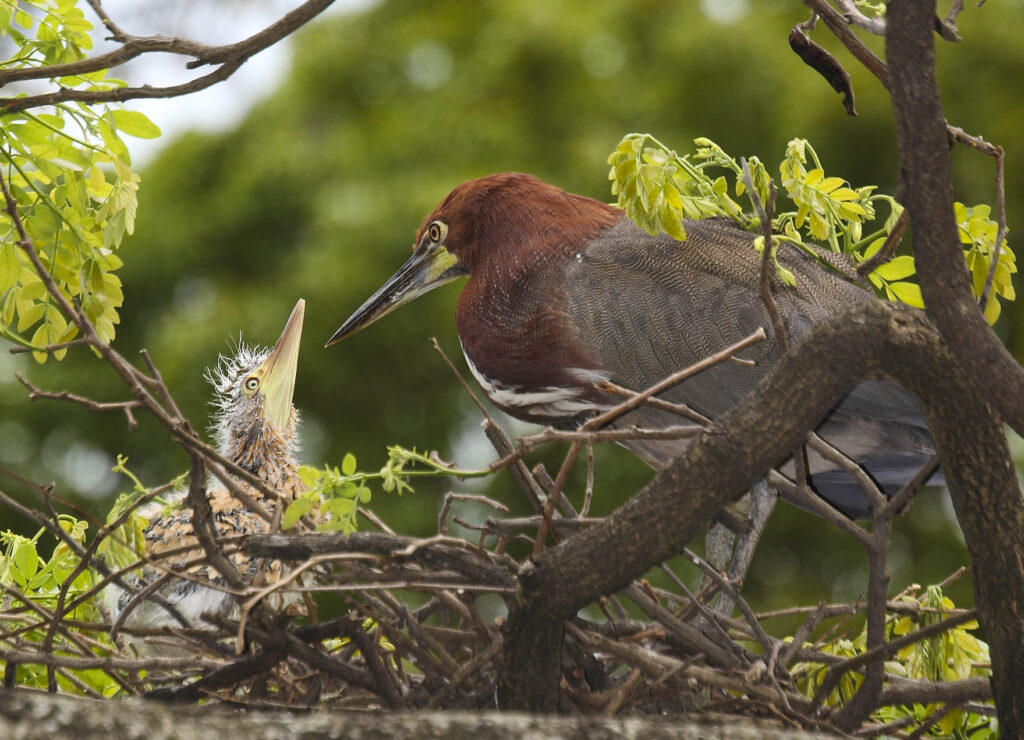
Amazon Mission 2024: 3BMeteo’s Journey to Document Climate Change

“Traveling through the Amazon means confronting a unique, fragile, and essential world for global climate balance. Protecting it is a task that concerns all of us.” – Emanuela Evangelista, biologist and mission coordinator.
The Amazon Mission 2024, led by the president of Amazônia, took the Italian meteorological services company 3BMeteo team on a journey of study and awareness to document the impact of climate change on the Amazon rainforest. Crossing four Brazilian states—Mato Grosso, Roraima, Pará, and Amazonas—the team of meteorologists gathered scientific data, local testimonies, and images to highlight the need to protect one of the world’s most critical ecosystems.
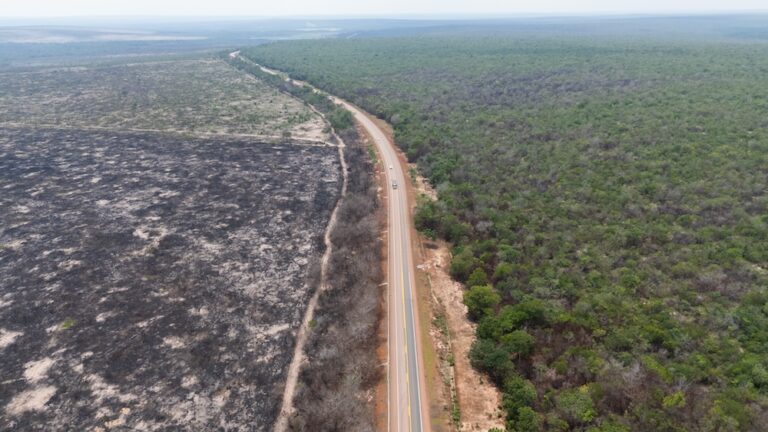
Key Stops and Testimonies
1. São Paulo: kickoff and preliminary meetings
In the vast southeastern Brazilian metropolis, home to over 12 million people, the team addressed the first two major themes related to the Amazon. The first explored the health of the rainforest, analyzed through a census conducted by the specialized center MapBiomas, with an interview featuring researcher Marcos Rosa. The second topic focused on the epidemiology of the Amazon basin, explained through insights from Dr. Fernanda Maffei, an infectious disease specialist at São Paulo Hospital.


2. Sinop: deforestation for intensive agriculture
In Sinop, Mato Grosso, the group observed deforestation caused by soybean plantations. Interviews with farmers and local producers revealed the economic pressures driving the conversion of forests into agricultural lands.
3. Novo Progresso: the broken promise of development
Carrying a name full of hope, this city was founded in 1973 along the massive road that cut the forest in half to facilitate the transport of agricultural products to export ports. Here, Indigenous leader Doto Kayapó spoke about his community’s circular development model, which opposes urban approaches that prioritize consumption and waste production.



4. Itaituba: the Munduruku and mercury in the rivers
In Itaituba, along the Tapajós River, the team visited a remote Indigenous village and met with community leader Juarez Saw Munduruku. The locals shared the dramatic consequences of illegal gold mining, including mercury contamination of the river. “The water is no longer drinkable, and children suffer severe health problems,” Juarez explained.
5. Santarém: drought and fires
In Santarém, the group spoke with Caetano Scannavino from the Saúde e Alegria project and Bruno Delano from ICMBio (Chico Mendes Institute for Biodiversity Conservation, responsible for managing 340 protected areas in Brazil). They provided data on devastating forest fires caused by drought. “Climate change is amplifying the region’s vulnerabilities,” Caetano emphasized.


6. Manaus: biodiversity and urban threats
In Manaus, the largest urban center in the Amazon, researchers from INPA (National Institute for Amazon Research)—Renato Senna, Luiz Candido, and Leonardo Ramos—explained how Amazonian weather systems work and how climate change is altering the biome’s balance, making both the rainy and dry seasons increasingly extreme.
7. Xixuaú: the beauty of the Amazonian heart
After days of difficult navigation caused by the severe drought, the team arrived at Xixuaú village in the Jauaperi National Reserve, in the heart of the Amazon. Here, they interviewed several local community members to understand how they perceive the ongoing climate changes and the practical challenges these bring to their lives in the forest. The mission concluded with a return to Manaus aboard a seaplane.


Conclusions
The expedition aims to raise awareness of the importance of the Amazon rainforest, not only through scientific data but also by engaging the public with reports and stories.
The Amazon biome, essential not only for the survival of local ecosystems but also for humanity’s well-being on this planet, plays a crucial role as a giant global climate regulator. Therefore, it is vital to increase global public awareness on this issue, which affects not only those living in the Amazon but all humans. Concrete solutions exist, including promoting a more sustainable global economy in import and export processes.
For more information about the expedition and to read the interviews, visit 3BMeteo’s official blog, in Italian.
Photos: 3B Meteo, Archivio Amazônia, Caio Vilela
Gambrinus Mazzotti Award: Special Recognition to Emanuela Evangelista for Her Work in the Amazon
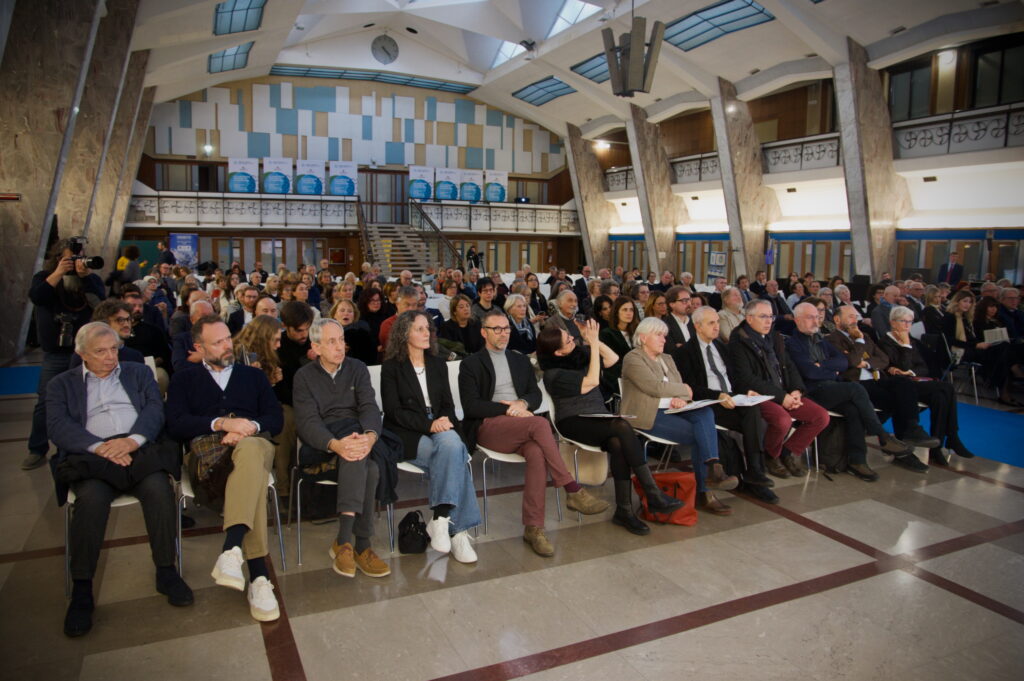
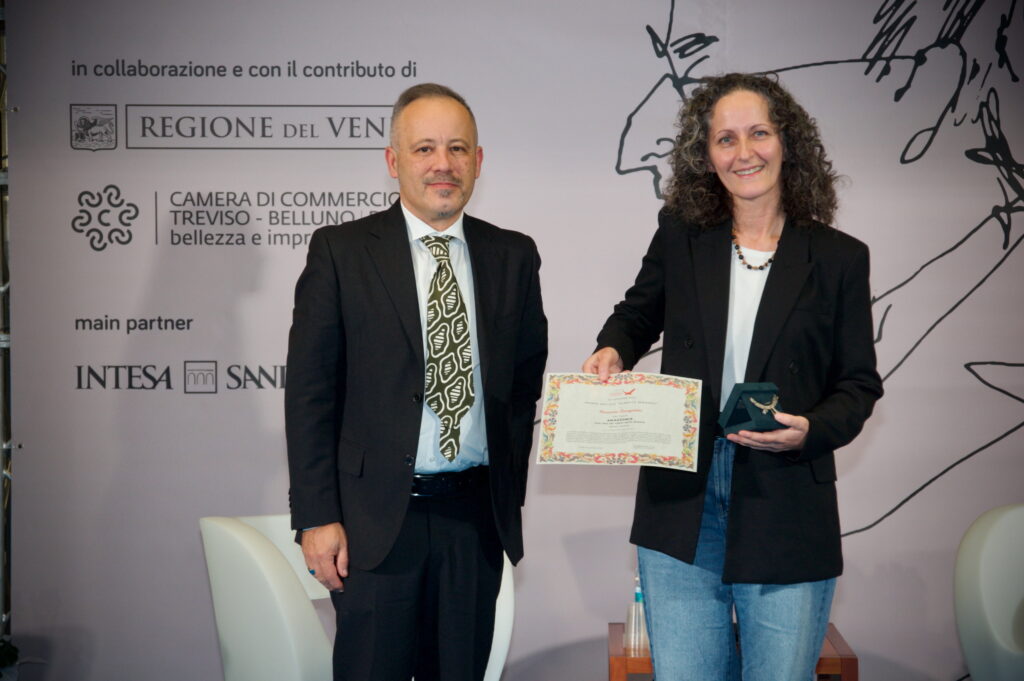
On November 16th 2024, the award ceremony for the Gambrinus Mazzotti Literary Prize, in the “Sala Borsa” of the Chamber of Commerce of Treviso-Belluno | Dolomiti took place.
The Gambrinus Mazzotti Literary Prize, a prestigious award dedicated to topics such as mountains, exploration, travel, ecology, landscape, traditional crafts, and Venetian culture through the “Window on the Veneto” section, is promoted by the Giuseppe Mazzotti Literary Prize Association. This initiative honors Giuseppe Mazzotti, a multifaceted intellectual from Treviso: writer, mountaineer, gastronome, and defender of Venetian villas, as well as a longtime advisor to the Italian Touring Club.
This year, the Special Jury Prize “Ulderico Bernardi” was awarded to Emanuela Evangelista, biologist and author of the book “Amazzonia. Una vita nel cuore della foresta”. Evangelista, who lives in the world’s largest rainforest, was recognized for “her ability to remind us that there is not just one Amazon.” The award highlights her talent in narrating a complex and unique reality, honoring not only her personal experience but also the importance of protecting one of the planet’s most precious ecosystems.
“Indeed, there is the forest, but there are also areas with greater human and agricultural presence, including large-scale soy cultivation and livestock farming. There is also a multitude of people who live in the forest and strive to preserve its biodiversity because they call the Amazon their home. This book is further praised for spotlighting the invaluable work that the author has been carrying out in the Amazon for over 20 years, reminding us that while we can travel to learn, the time has come to travel to build a different future for our planet and for all of us.”
“Here in the Amazon, you can truly feel the interdependence that creates the natural community,” the author emphasized in a video message recorded from her stilt house in the heart of the rainforest, “and it is something we often forget in our urban contexts.”
Information about the book – in Italian
Twenty years of Amazônia: a commitment to biodiversity and sustainability
This year, Amazônia celebrates twenty years of dedicated efforts to protect the Amazon and promote sustainable development for local communities. This milestone represents not only the completion of two decades of work but also a testament to the determination that has driven us to face and overcome each challenge along the way.
Our achievements
Over these years, Amazônia ETS has achieved significant milestones. We have initiated and strengthened conservation projects that have helped preserve key areas of the Amazon rainforest, safeguarding a natural heritage of immeasurable value. Thanks to collaboration with researchers, local communities, and international organizations, we have been able to develop environmental monitoring programs, natural resource management, and biodiversity protection, all essential for maintaining the balance of the Amazon ecosystem.
In the educational field, our awareness and training programs have reached a great number of people, drawing attention to the importance of adopting sustainable practices. We firmly believe that environmental conservation cannot exist without education, and we are proud to have inspired new generations to care for nature and defend their planet.
The challenges and difficulties overcome
The journey of Amazônia has not been without obstacles. Over the last twenty years, we have faced complex situations, economic difficulties, and challenges tied to the context in which we operate. Our mission has demanded tenacity and the ability to adapt quickly to changes, without ever losing sight of our goal: to protect the Amazon and support the communities that inhabit it.
A look to the future
We look to the future with hope and determination. In the coming years, we want to strengthen and expand our projects, focusing on new initiatives that can ensure sustainable resource management and greater autonomy for local communities. The environmental and social challenges ahead require a joint effort and collaboration from all who share our values.
We will strive to establish new partnerships with local and international organizations to extend our reach and offer ever more innovative and sustainable solutions.
Thanks to our supporters
This twentieth anniversary is an opportunity to thank all those who have supported us and believed in our mission. Without the contribution and trust of our partners and supporters, none of this would have been possible. Our commitment is also dedicated to you, with the hope of continuing, together, to work for the protection of the Amazon.
The road is still long, but each step brings us closer to our goal: a world where the rainforest and its communities can thrive.
Photo by Carla Oliveira
Emanuela Evangelista is the winner of the second edition of Campiello Natura – Venice Gardens Foundation Award
Emanuela Evangelista has been announced as the winner of the second edition of the Campiello Natura – Venice Gardens Foundation Award for her book “Amazzonia. Una vita nel cuore della foresta” (Editori Laterza).
The award ceremony will take place on Saturday 21 September at the Gran Teatro La Fenice in Venice, during the final evening of the 62nd edition of the Campiello Award. The award will be presented by Adele Re Rebaudengo, President of the Venice Gardens Foundation.
The Campiello Natura – Venice Gardens Foundation Award, born from the synergy between the Il Campiello Foundation and the Venice Gardens Foundation, celebrates literature that explores the urgent need to re-establish a harmonious balance with nature.
Through the evocative power of the written word, the award aims to inspire respectful dialogues and conscious reflections, in an era in which nature is seriously threatened.The Jury of Literature of the Campiello Award has awarded Emanuela Evangelista for its passionate and scientifically documented testimony on the current situation of the Amazon. The work denounces the dangers of deforestation and the irresponsible use of natural resources, combining the objectivity of the scientist with the passion of the activist. The book gives voice not only to measurable data, but also to the growing self-awareness of indigenous populations, making it a reportage of great relevance.
Emanuela Evangelista will be present at the award ceremony on Saturday 21 September and will take part in a series of subsequent meetings, where she will have the opportunity to explore the themes of her book and dialogue with the public.
Monday 23 September at 6.00 pm, Royal Gardens of Venice Adele Re Rebaudengo, President of the Venice Gardens Foundation presents the book together with the author.
Tuesday 24 September at 6.30 pm Villa da Schio, Castel Gomberto – Vicenza. Giustino Mezzalira, director of the research and agroforestry management section of Veneto Agricoltura, will dialogue with the author.
Tuesday 1 October at 5.30 pm at Bosco in Città – Giardino d’Acqua in Milan. Words in the garden: the journalist Emanuela Rosa-Clot will present the book together with the author. The meeting, organized in collaboration with the magazine Gardenia, will be held at Bosco in città to celebrate the 50th anniversary of a large green lung, created in 1974 on the initiative of Italia Nostra on land granted by the Municipality of Milan.
Sunday 6 October at 10 am at the Botanical Garden in Lucca as part of the PianetaTerra festival, Emanuela Evangelista will hold the conference entitled ‘The wild road. Stories of humans and non-humans.
Monday 7 October at 6 pm Libreria Panisperna 220 in Rome the journalist Lino Lombardi will present the book together with the author.
Learn about the book here (in Italian).
The Amazon and its crucial role in the context of climate change
The Amazon, the largest rainforest in the world, is a vital biome for our planet.
Known for its incredible biodiversity and as a significant carbon sink, this region plays a key role in the global climate balance. However, the Amazon is under increasing threat due to global warming and human activities, such as deforestation and mining.
The Amazon rainforest, which is home to 13% of all terrestrial trees and the world’s longest river, the Amazon River, is losing ground at an alarming rate. About 18% of the original forest cover has already disappeared, equivalent to an area twice the size of Germany. This deforestation not only destroys vital habitats but also releases enormous amounts of greenhouse gases into the atmosphere, further accelerating climate change.
The soil and vegetation of the forest contain over 150 billion tons of carbon, which is released as carbon dioxide when the forest is cut down. Additionally, human activity also contributes to the emission of other greenhouse gases, such as nitrous oxide and methane, which further aggravate the problem. These gases not only warm the planet but also alter the ocean current system, of which the Amazon is a fundamental component, contributing with one-fifth of the global freshwater discharge.
The loss of the Amazon rainforest has devastating consequences not only for local biodiversity but also for the global climate balance. Scientists estimate that we could be just 15-30 years away from the point of no return, a moment when Amazonian ecosystems will collapse irreversibly, transforming the rainforest into a dry environment, similar to a savanna.
This scenario would have catastrophic repercussions for the global climate, with effects including an increase in global temperatures, changes in precipitation patterns, and a higher frequency of extreme weather events. Preserving the Amazon is therefore crucial not only for local populations and biodiversity but for the entire planet.
We have become an ETS, but what does that mean?
ETS stands for “Ente del Terzo Settore” (Third Sector Entity), a new designation replacing the term “Onlus” for all organizations of our nature.
Our work does not change, our mission does not change, but our official name is now compliant with the law and becomes “Associazione Amazonia Milano ETS”. For you, our friends and supporters, we will continue to be Amazônia, the simple name that has characterized us for twenty years, with a single “z” as in Portuguese!
The new Third Sector Code also required us to register with the telematic registry established by the Ministry of Labor and Social Policies, so now our organization is registered in the National Single Register of the Third Sector, also known as RUNTS.
In short, always in compliance to ensure full transparency of our work.
Health and Hope for Remote Communities of the Amazon
Our valuable partnership with the Brazilian organization Doutores da Águas continues successfully.
Tirelessly, the Water Doctors bring medical examinations, free treatments, dental prostheses, and health screenings to the populations of the Amazon rainforest.
The initiative provides specialist medical assistance and health education through a hospital ship, specifically adapted to reach the most remote riverine communities. The ship is equipped with high-quality medical and dental infrastructures and a qualified team of volunteer professionals from all over Brazil.
The expeditions on board the hospital ship last for weeks and cover a route of nearly 3,000 kilometers by water, in the basins of the Negro and Madeira rivers, reaching 35 riverine communities in extremely remote regions of the states of Roraima and Amazonas.
Extraordinary Results:
- 16,721 medical examinations conducted between 2011 and 2023.
- 12,613 dental checks carried out in the same period.
- 1,000 dental prostheses delivered between 2017 and 2023.
Along the route, the main villages become true centers of reception, accommodation, and treatment for the natives who need healthcare. On board, a team of volunteers composed of educators, nurses, doctors, pediatricians, dentists, dental technicians, gynecologists, and infectious disease specialists offers specialist consultations, treatments, and free medications. Dental prostheses are also provided, and health education campaigns are organized, with particular attention to children, women, and food security.
This commendable mission represents a source of hope and health for the most remote communities of the Amazon, demonstrating how dedication and commitment can make a real difference in the lives of many.
Our heartfelt thanks go to the Italian doctor Alberto Vaona who, along with two other collaborators, conceived the initiative “Io Sono Amazzonia” (“I Am Amazonia”). During this adventure, the three protagonists crossed the Transamazonian Highway by bicycle with the aim of documenting the dire condition of the Amazon rainforest and its native inhabitants. Throughout the sporting endeavor, the cycling travelers promoted fundraising for the “Dottori delle Acque” (“Doctors of the Waters”) project through their social channels and among their contacts and followers.
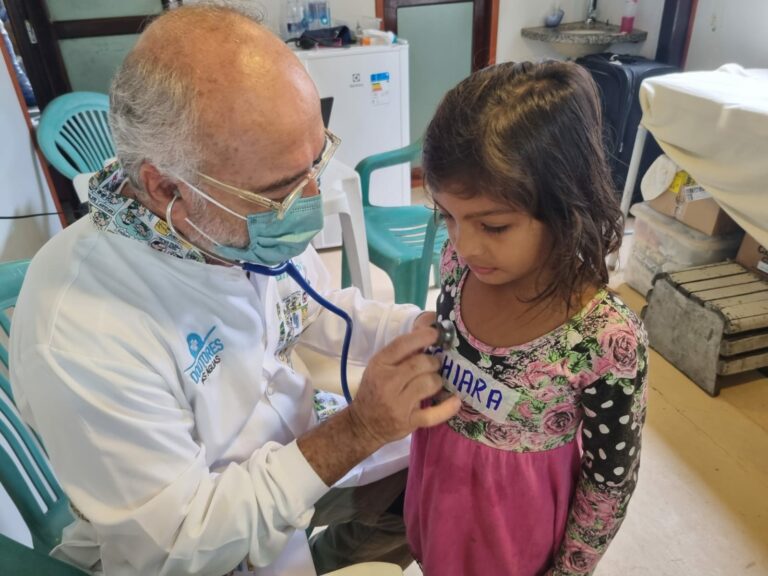
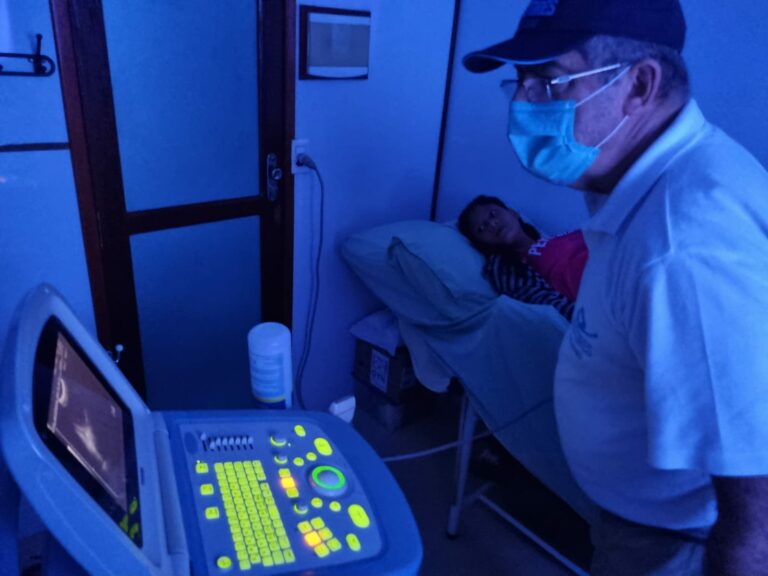
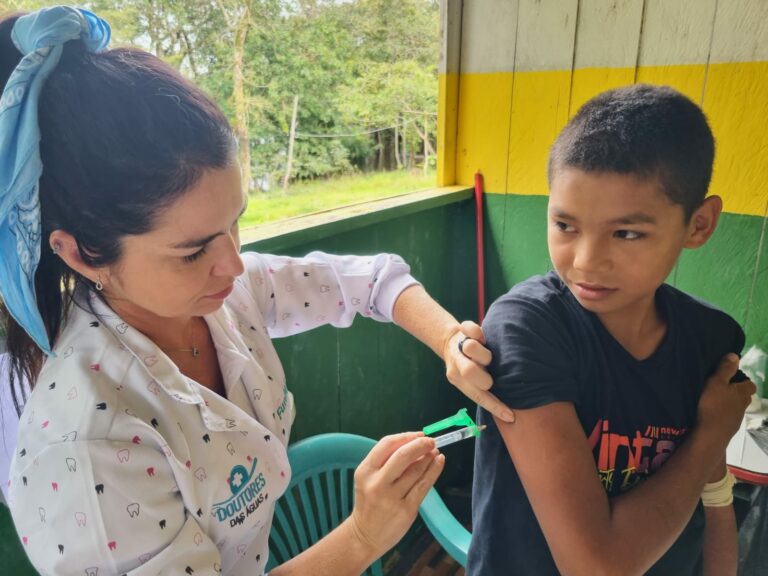
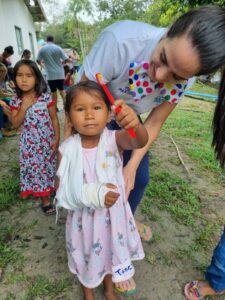
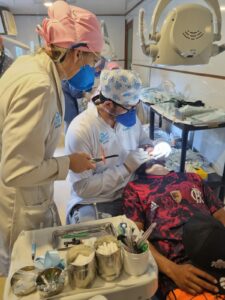
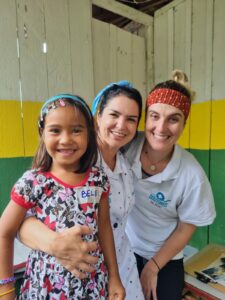
SCHOOLS ON THE JAUAPERI RESERVE: REBUILDING THE BEATING HEART OF COMMUNITIES
We are pleased to share the latest results of the Strengthening Education project in the Jauaperi Reserve, which apart from providing environmental education, also focuses on rebuilding and renovating the reserve’s schools.
This mission, driven by the urgency following the devastating floods of 2021-2022, is carried out by the local cooperative CoopXixuaú with the support of Amazônia and Amazon Charitable Trust, in partnership with the Rorainopolis Department of School Education and the reserve authority Instituto Chico Mendes de Conservação da Biodiversidade (ICMBio).
Schools are not just places of learning but the beating heart of local communities, the link to education for young people. Improving their conditions is crucial to support learning within unique forest contexts while preserving precious natural resources and traditional ways of life which rooted in the Amazonian culture.
Some schools, like the one in the Bela Vista village, required more than just renovation; they needed complete reconstruction. Thanks to the joint effort of CoopXixuaú and local residents, the reconstruction is now almost complete, and the inauguration of the new school is scheduled for next June!
Schools in the communities of the Jauaperi Reserve need to be rebuilt and teaching improved after the long interruption caused by Covid-19, worsened by the record floods of 2021 and 2022, and the latest extreme drought – phenomena that have caused significant structural damage to the schools. It is necessary to repair the water and sanitation systems and rehabilitate the kitchens to support municipal and national school meal programs, such as the National School Meals Program (PNAE). Some schools are inadequate for teaching and need materials to provide a safe and suitable learning environment for students and teachers, as well as conditions to ensure adequate food and water security in the schools. Therefore, the project is essential to complement the educational strategy of local governments, which struggle to provide basic materials and renew schools in the reserve’s villages.
The project’s purpose is to strengthen the basic education of children and youngsters by improving the school environment to allow better learning conditions and contribute to the development of the students. To achieve this goal, it focuses on two more specific objectives:
- School Reconstruction: renew and rebuild, when necessary, the kindergartens and elementary schools in the reserve’s communities, providing construction materials according to their structural needs, as well as furniture and teaching equipment for the classrooms and kitchens;
- Environmental Awareness: develop environmental awareness workshops with students and teachers, focused on nature conservation, including the proper disposal of solid waste and other care for the rivers and forests in the reserve region.
We thank the partners Fosit, Rothoblas, Trentino Insieme, Riccio Giramondo, Fondazione Quarta de Matteis e Torchiani Servizi Ecologici for the valuable support.
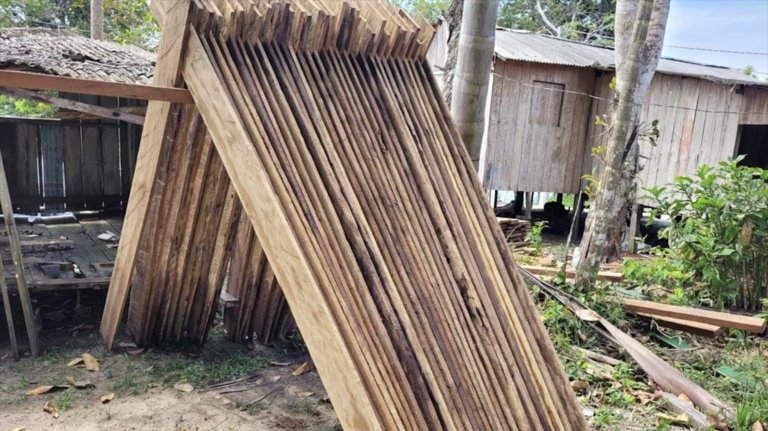
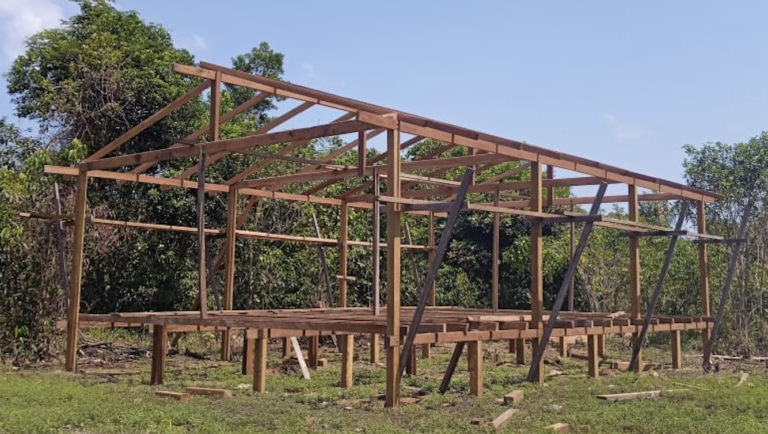
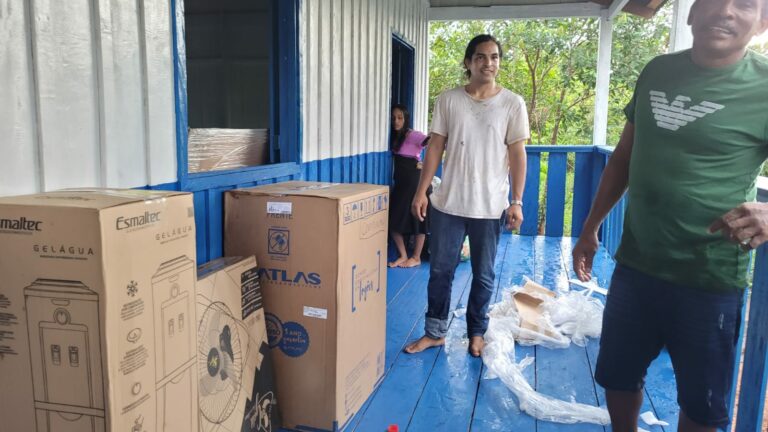
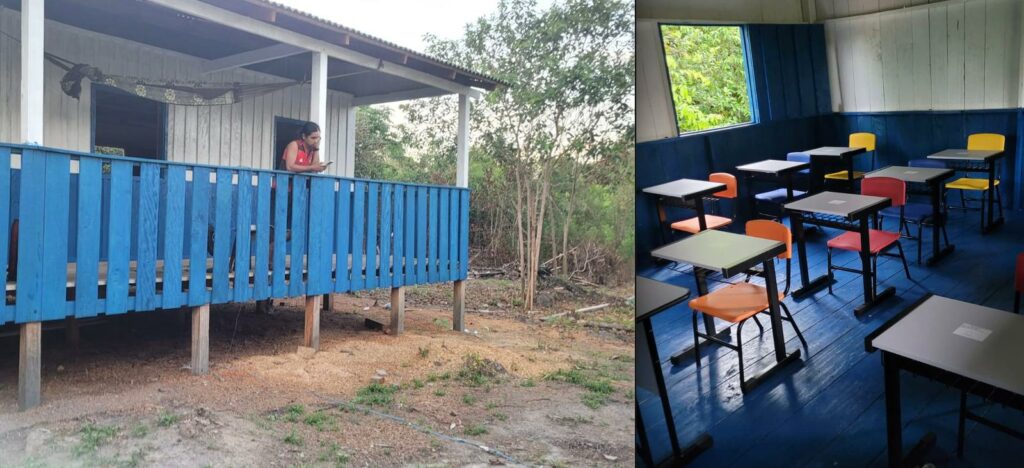
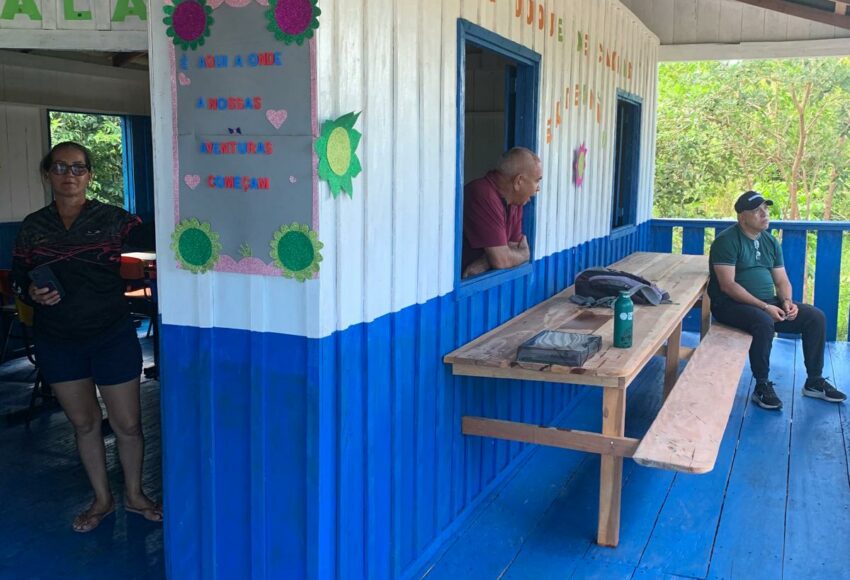
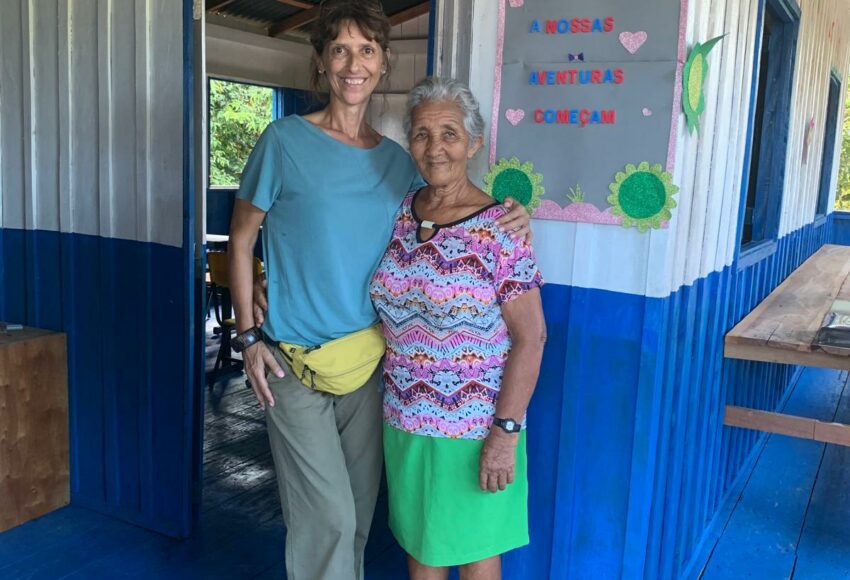
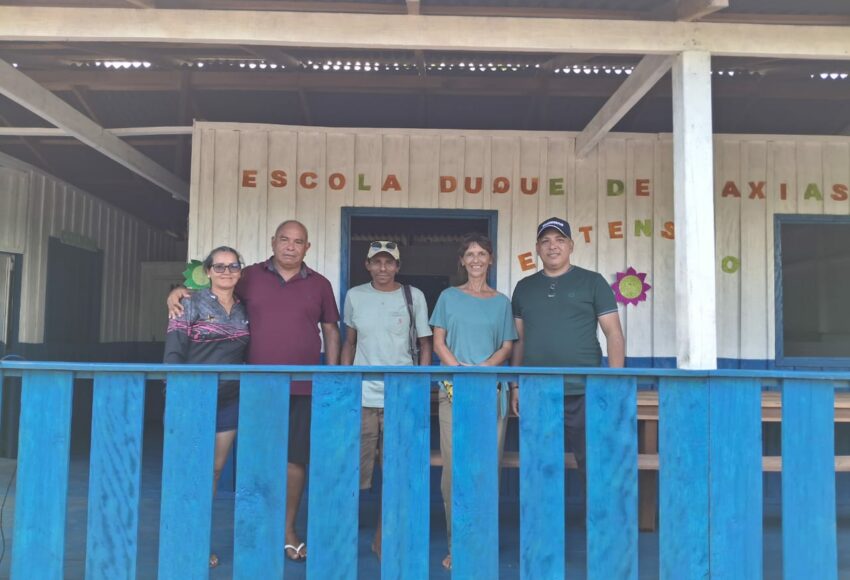
Back to the Amazon Forest and Communities
Great joy in the Amazon for the recent visit of our vice president!
After a long absence, Tiziana Faraoni came back to visit the Jauaperi Reserve, where Amazônia has been working for many years.
“It was nice to see the many improvements, the tangible results achieved over the years. CoopXixuaú is a doing fantastic work with its community-based ecotourism, bringing income and better living conditions to many families of the park.
We reached several villages and visited the works carried out with the support of Amazônia, such as the community center of the indigenous village Gaspar and that of the Itaquera community. In the Bela Vista community, we verified the progress of the education project we are carrying out together with the English partner ACT, with whom we are rebuilding the schools of the reserve.
It was beautiful to come back and spend time with friends, seeing those who once were children become fathers. One emotion after another!”
Tiziana is the picture editor in charge of the important Italian news magazine “L’Espresso” and the TOFM – The Official Ferrari Magazine. During her stay, the vice president and the team of our partner VisionAir filmed and took photographs that will enrich the local cooperative’s image archive, our partner for the creation of projects in the reserve.
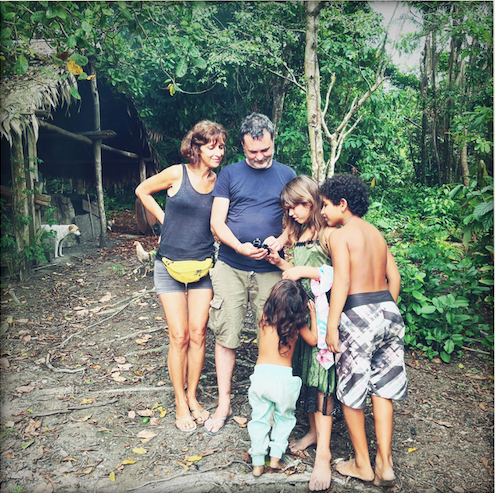
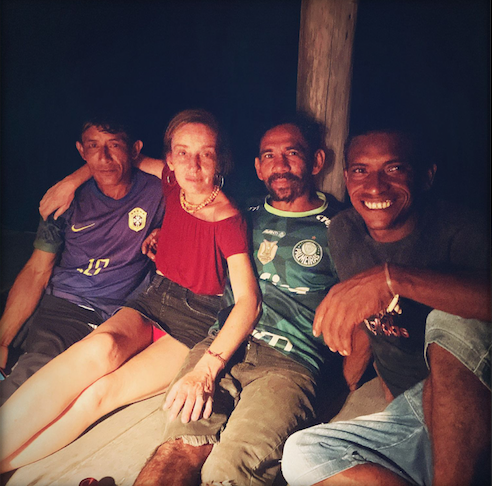
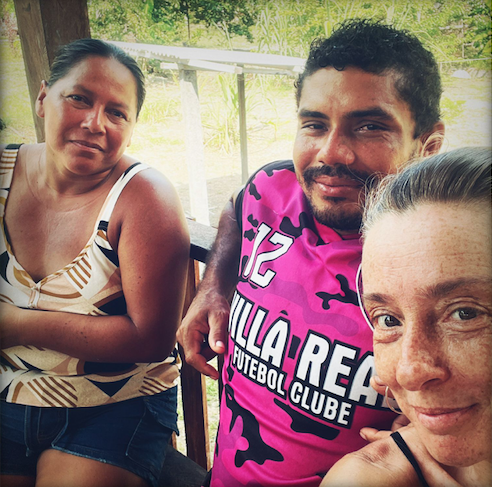
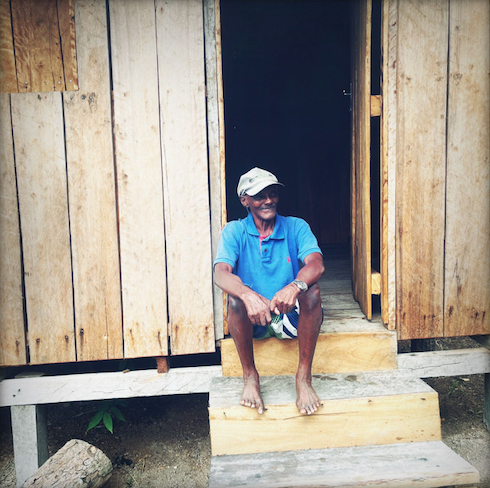
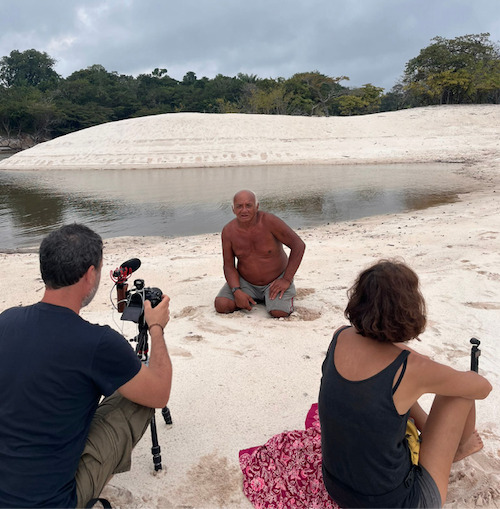
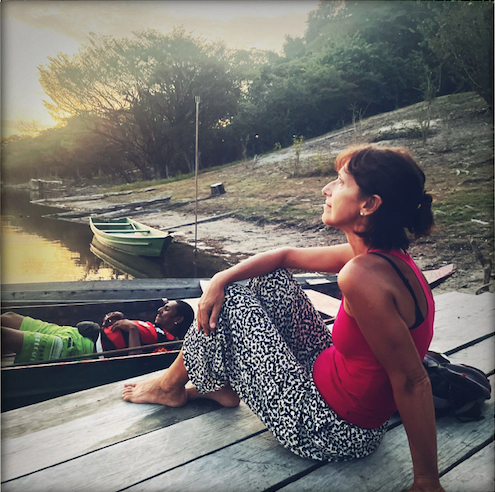
River of Light: concluding chapters of success
“Having participated as an educator in the Rio de Luz Project was a process that illuminated my professional and personal trajectory.”
Thus, in a note, educator Renata Almeida describes her two-month experience in the Baixo Rio Branco and Jauaperi Extractive Reserve.
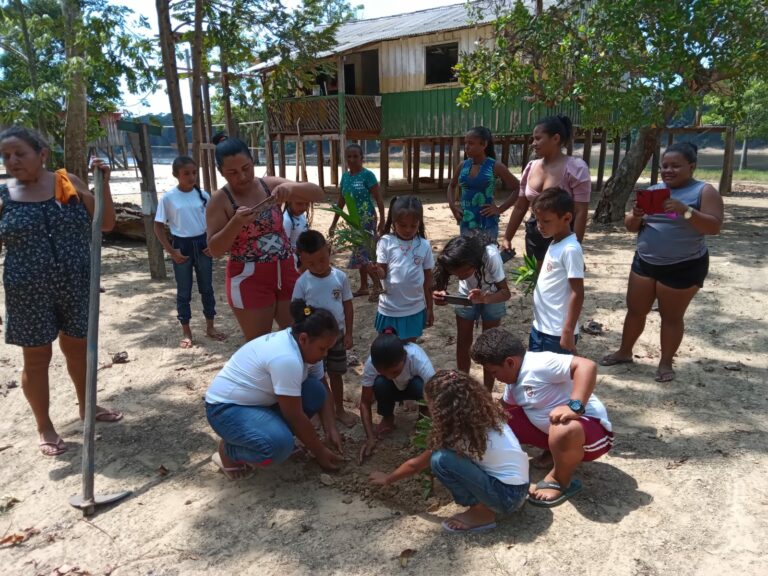
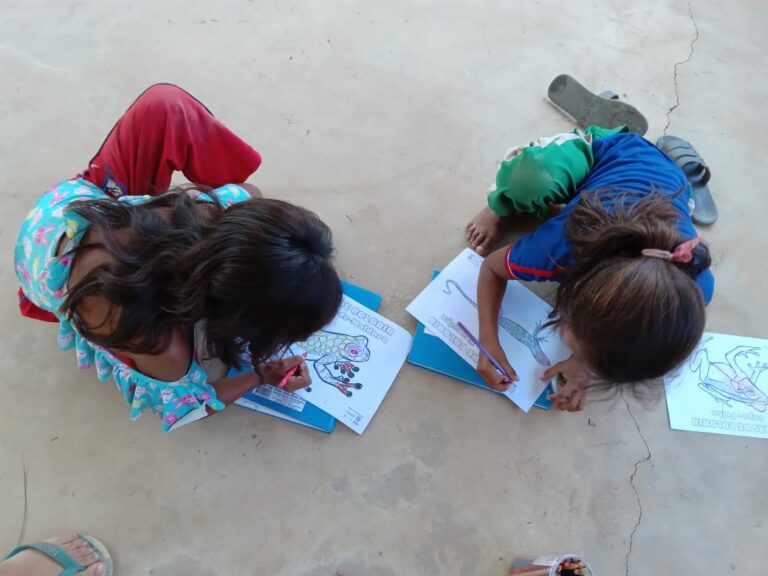
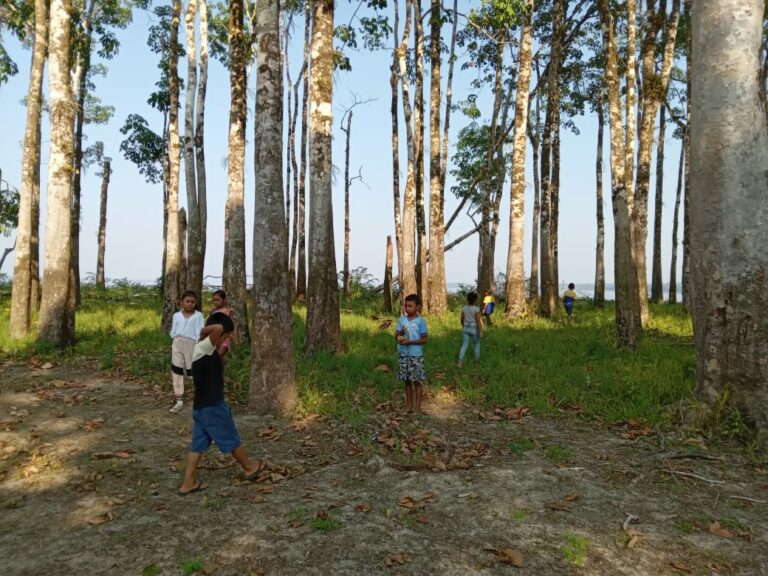
“I learned a lot about being a child, living connected with nature, about rural education, about simplicity, skills, being in a community, and above all, I learned many ways to respect the forest and its charms. I understood that education is happening and being built all the time: in the collective preparation of flour, in fishing, in the balance that the canoe requires, in working the fields, in games and in socializing.
In each of the ten communities I passed through, I could feel the strength of the forest, the river and the people who live there and take care of the territories. I had the privilege of meeting incredible, inspiring people and learning about caring for nature, the spirits of the forest and many ways of living simply, nourishing oneself with what the Earth and water provide. In fact, I was able to taste different fish, prepared in different ways, always very tasty, which nourished my body and filled me with indescribable riverine energy.
Still filled with joy and teachings, I feel the power that activities such as the environmental education workshops of the Rio de Luz Project have in the communities and, therefore, long life to the Project, so that it continues to illuminate and flow in the lives of many people, allowing people and communities to share more and more experiences and knowledge.
I thank each and every one who crossed my path in this immensity of the Amazon, especially the children, teachers and professors! I take this experience with affection, in my mind and in my heart! Thank you very much to CoopXixuaú, the NGO Amazônia and the Amazon Charitable Trust, for the opportunity and trust!”
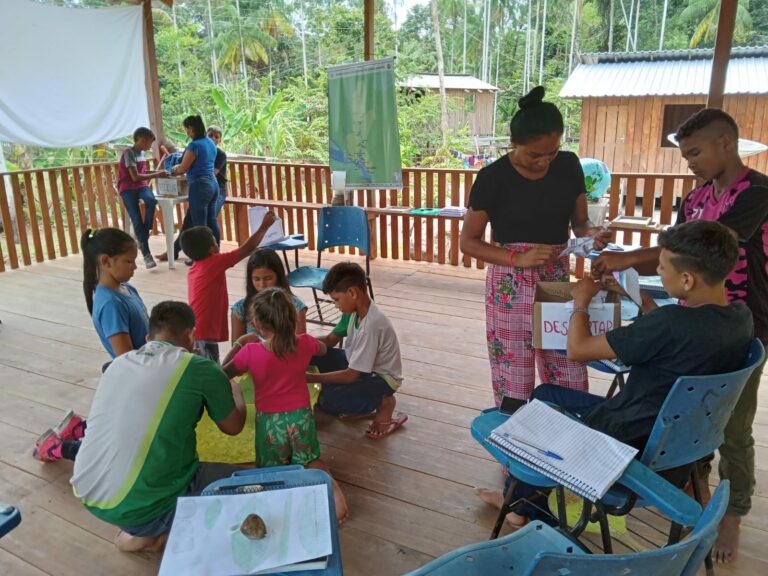
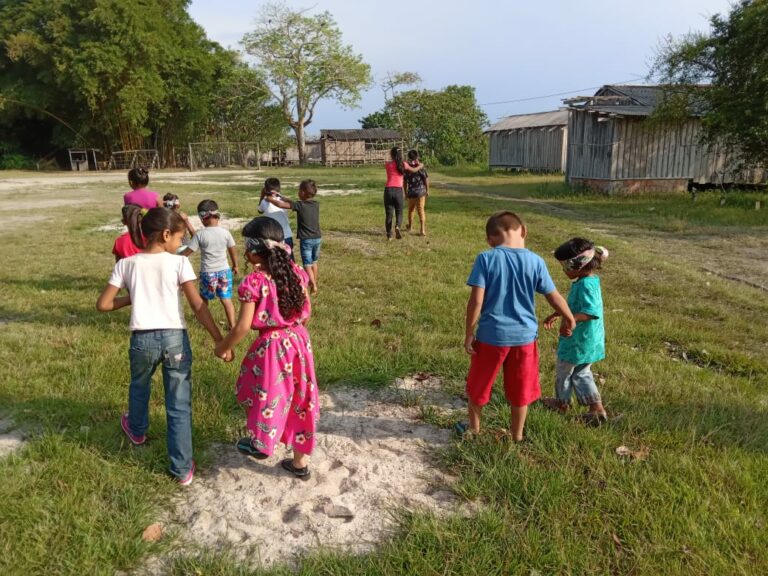
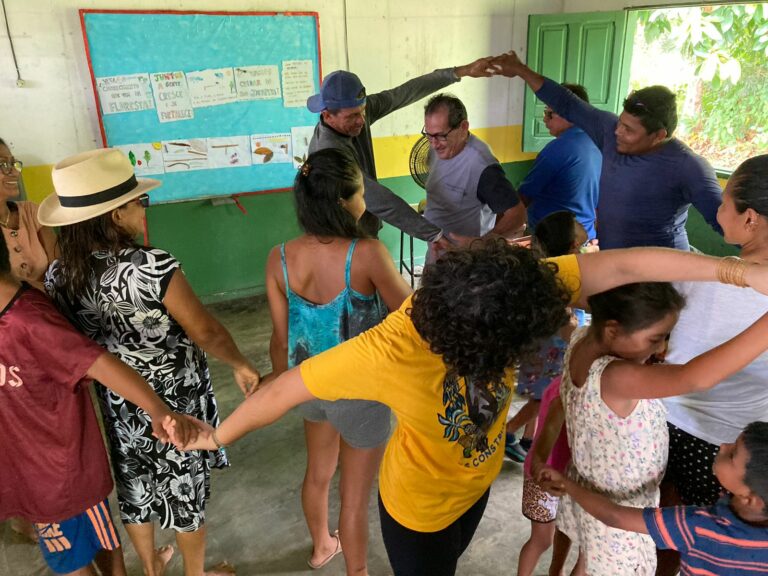
We at Amazônia would like to thank Renata, the coordinators of rural schools Alzilete and Oscar, all the teachers and parents and community leaders who made the project a success!
The project is the result of collaboration between the education departments of Amazonas and Roraima, ICMBio, CoopXixuaú, Amazônia and Amazon Charitable Trust, with the support of Rothoblaas, Trentino Insieme, Fosit, Riccio Giramondo, Fondazione Quarta de Matteis and Torchiani Servizi Ecologici.
A big thank you to Projeto BioClimAmazônia – INPA and FAPEAM, Laboratório de Psicologia e Educação Ambiental – INPA for the teaching material.
This collaborative effort is a shining example of what can be achieved when diverse entities come together with a shared purpose.
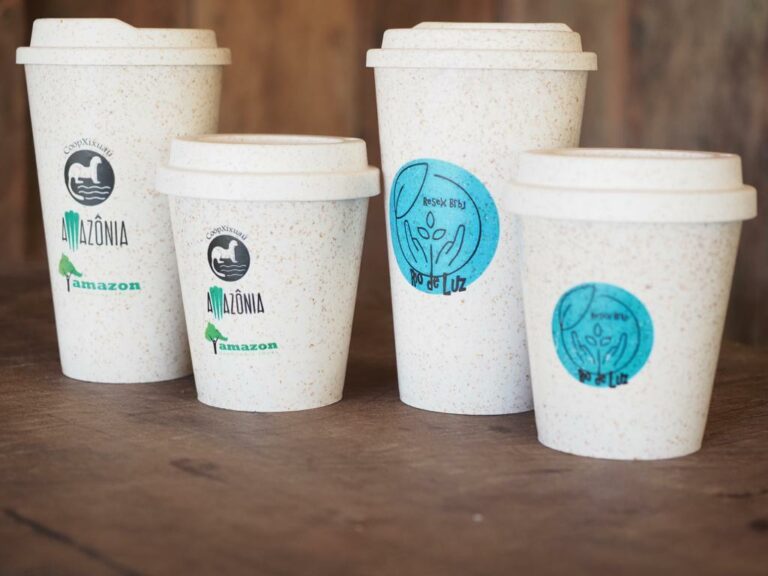
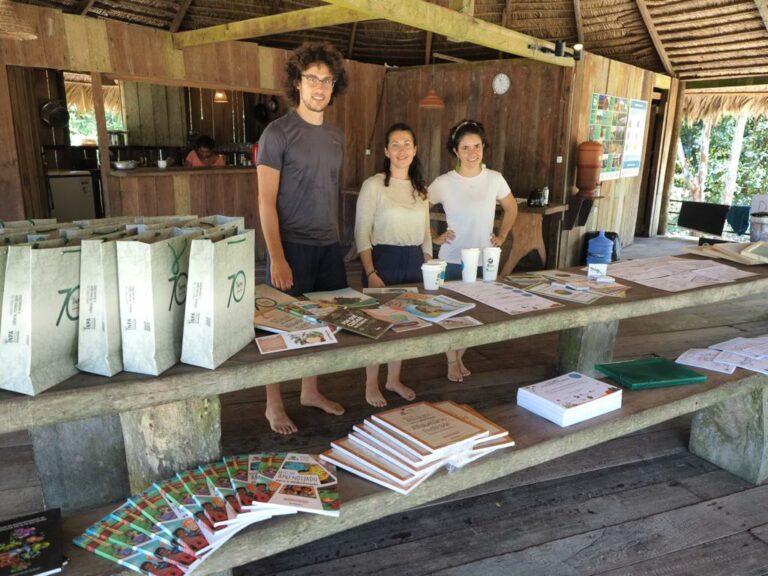
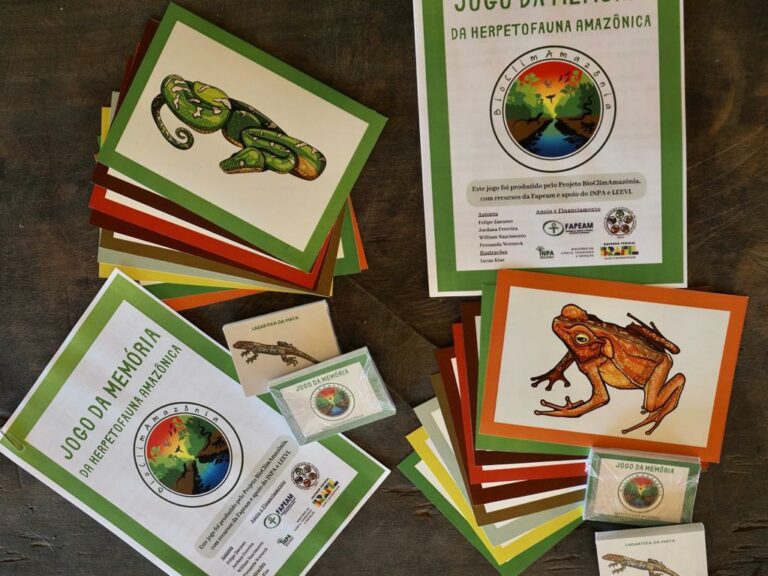
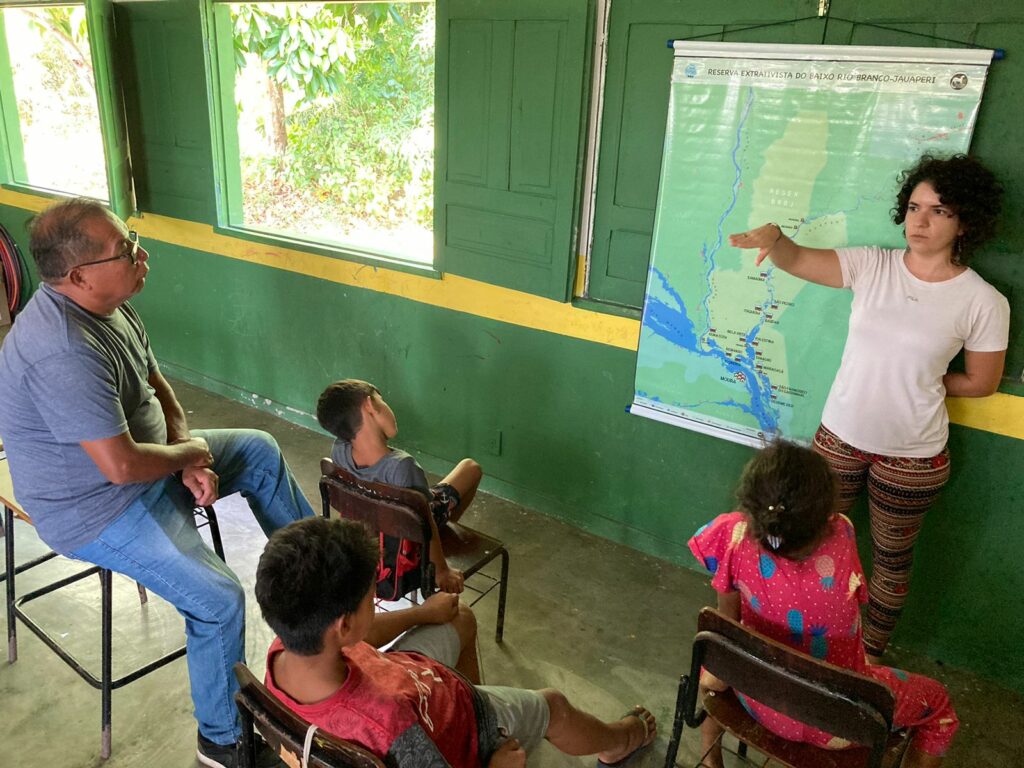
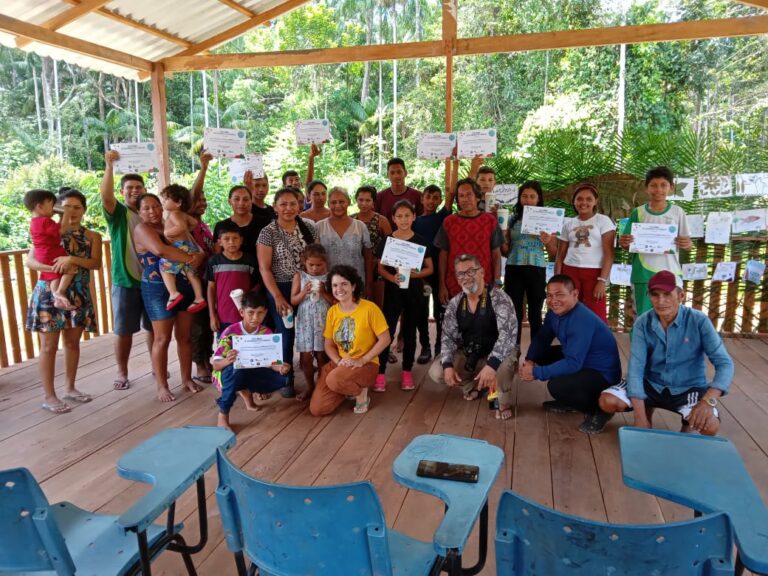
EMANUELA EVANGELISTA BRINGS THE AMAZON TO ITALY WITH HER BOOK
Amazônia president’s tour to Italy to present her book “Amazzonia. Una vita nel cuore della foresta” (Editori Laterza) has just ended.
The author declares, “In the book I tried to tell about the humanity and the spaces that make this heterogeneous place one of the most fascinating on the planet, the beauty of the territories and its inhabitants, not only human, as well as the fear and the enchantment that spring from the unmediated contact with nature. But also violence, illegal mining, logging, speculation, poaching, the struggle of the natives in defense of the forest. The book is meant to be my personal contribution to the debate on the environmental issue and the current and future challenges the planet is facing.”
Emanuela’s tour touched numerous Italian cities, including Milan, Lucca, Florence, and Rome, but also reserved a special space in Lanuvio, the biologist’s hometown. During this tour, the audience had the opportunity to immerse themselves in the depths of the Amazon rainforest through Emanuela’s engaging descriptions. In addition, the tour offered a valuable opportunity to learn firsthand about the significant work done by the Amazônia Association in preserving and protecting this extraordinary and vital part of our planet. The book was so successful that it was reprinted only thirty days after its debut in bookstores.
Between October and December Emanuela gave several interviews and participated in numerous radio and television broadcasts, emphatically stressing the importance and urgency of pursuing the construction of a model of society based on criteria of greater responsibility in the social, environmental and economic spheres.
During her public appearances, she did not fail to highlight the current situation of extreme and unprecedented drought afflicting the Amazon and forest peoples, with devastating consequences for the ecosystem and the communities̀ that depend on the forest and rivers for subsistence.
Together with partner Amazon Charitable Trust Emanuela also attended COP 28 in Dubai, closely following the negotiations at the UN World Climate Conference. This important event discussed the fate of our planet and possible solutions to counter the growing climate crisis.
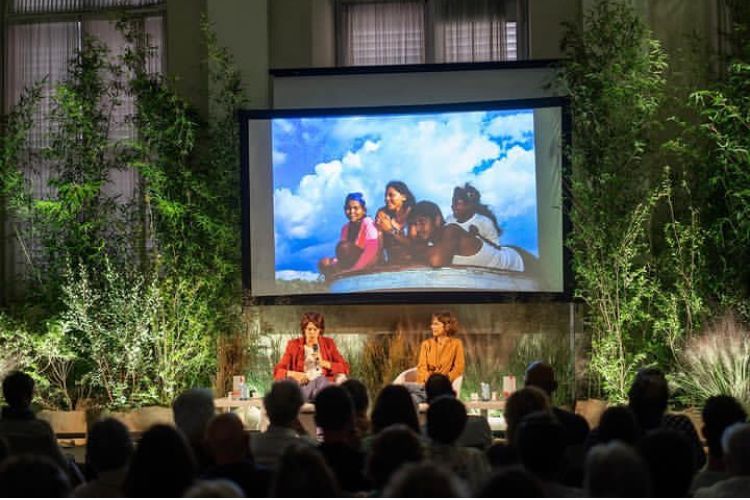
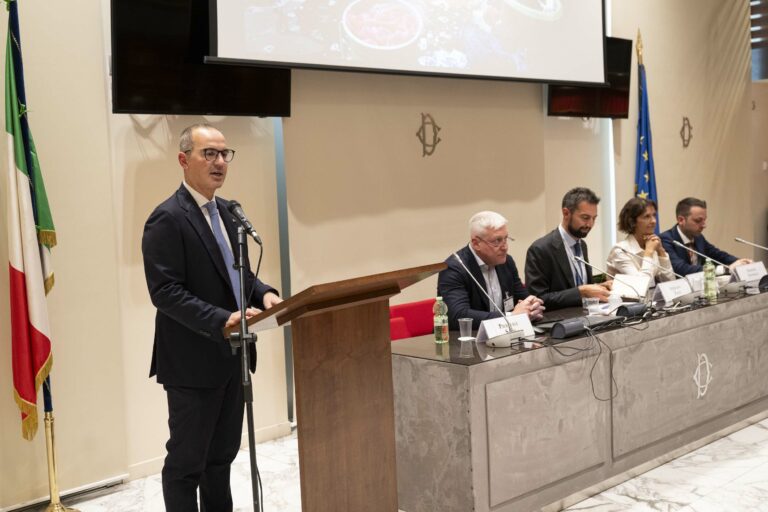
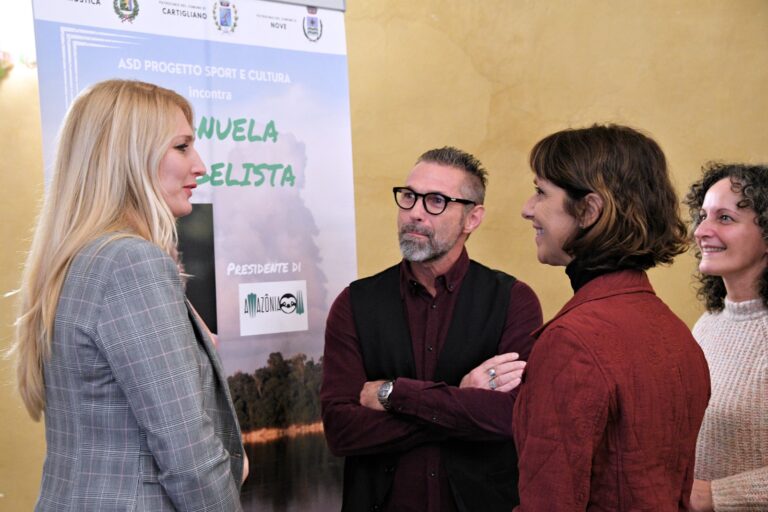
Pianeta Terra Festival, Lucca
Camera dei Deputati, Roma
Marostica, Centro Culturale
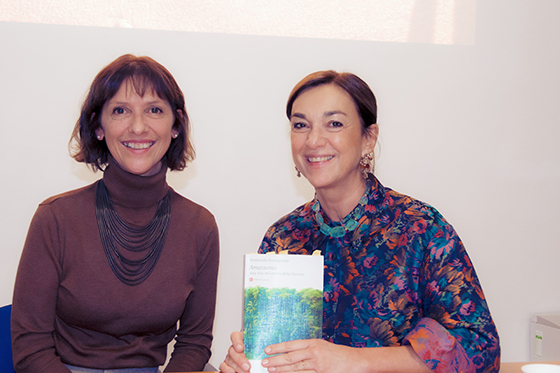
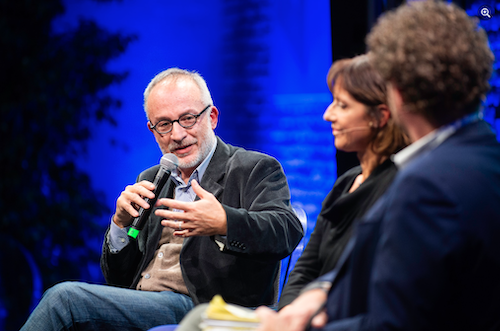
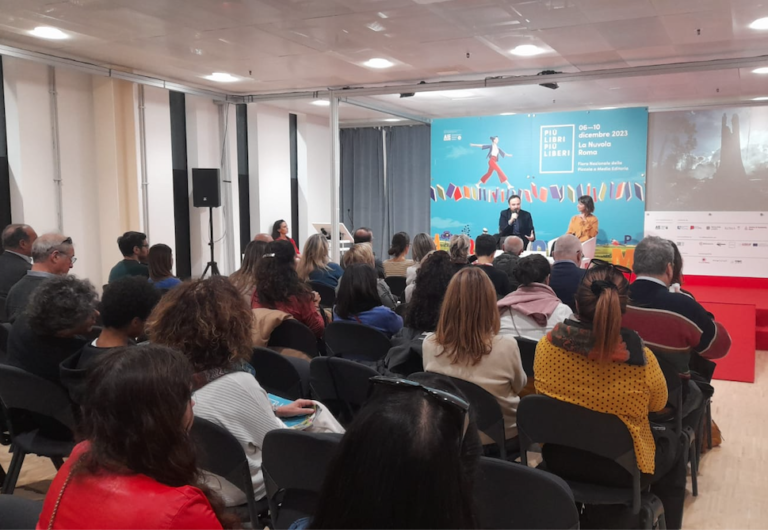
BookCity, Milano
Festival L’Eredità delle Donne, Firenze
Fiera Più Libri, Più Liberi
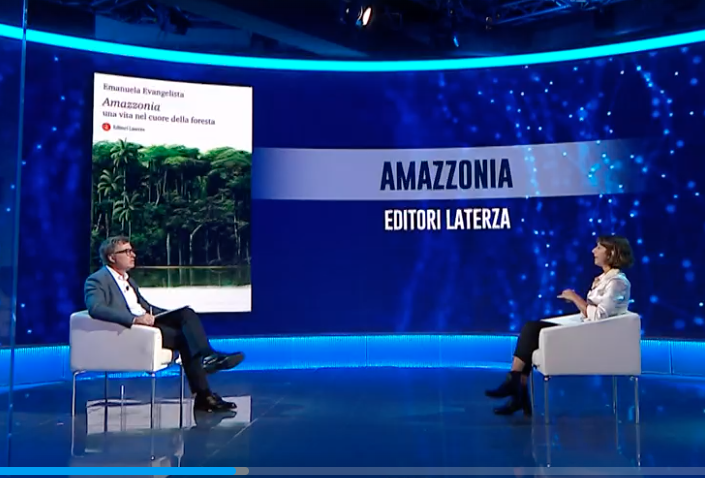
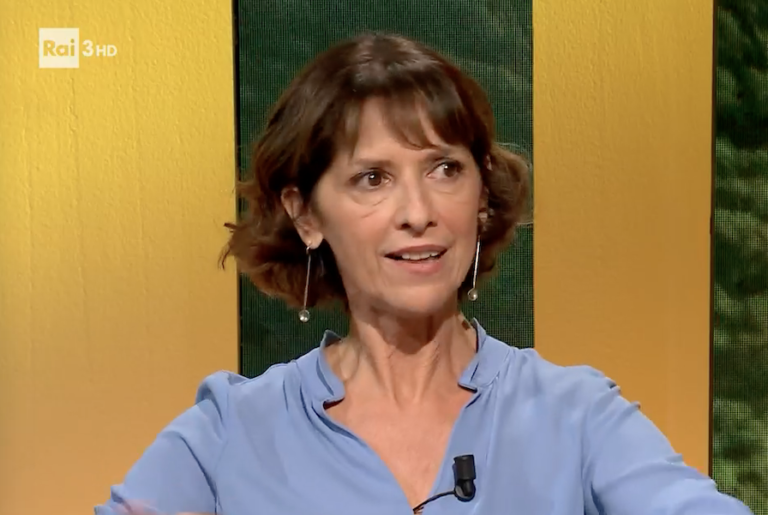
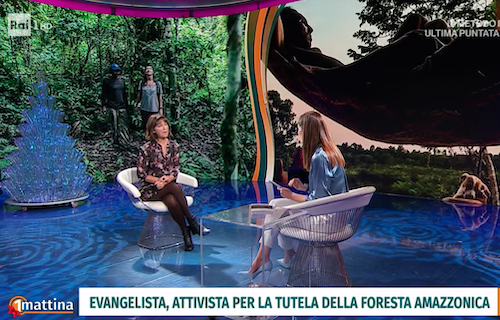
Quante storie, RAI 3
Alla scoperta del Ramo d’Oro, RAI 3
La Forza delle Donne, Uno Mattina RAI 1
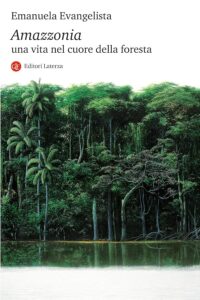
Click here for the book details and to purchase ‘Amazzonia. Una vita nel cuore della foresta'(In Italian)
Click here for articles, interviews, radio and TV appearances
List of appointments on the book presentation tour:
8/10 – Lucca – Festival Pianeta Terra, in dialogo con Alessandra Viola.
15/10 – Reggio Emilia – Festival Finalmente Domenica, Dialogo con Davide Papotti. Ridotto del Teatro Valli.
16/10 – Borgomanero – Oratorio di Borgomanero, in collaborazione con PIME.
23/10 – Roma – Camera dei Deputati, Sala Matteotti, Piazza del Parlamento 19. Saluti Istituzionali: On. Andrea Volpi (Deputato della Repubblica), On. Fabio Porta (Deputato della Repubblica). Moderato da Stefano Zago (Direttore Teleambiente); Interventi di Simone Santilli (Assessore all’Ambiente – Lanuvio), Pierluigi Sassi (Presidente di Earth Day Italia).
28/10 – Albano Laziale – Le Promesse Libreria Bistrot, in dialogo con Francesca Guercio.
7/11 – Lanuvio (RM), Sala delle Colonne Villa Sforza Cesarini, in dialogo con Antonella Rizzo. Interventi del Sindaco di Lanuvio on. Andrea Volpi e del Presidente del Consiglio Comunale Alessandro De Santis.
10/11 – Roverè della Luna (TN), Circolo Culturale Ricreativo.
12/11 – Marostica (VI), Centro Culturale ex Chiesetta San Marco, a cura di ASD Progetto Sport e Cultura.
13/11 – Cartigliano (VI), Villa Morosini Cappello, a cura di ASD Progetto Sport e Cultura.
14/11 – Modena, Sede Foreste per Sempre ODV – Gev Modena.
16/11 – Brescia, Nuova Libreria Rinascita, in dialogo con Giovanni Mori (Fridays For Future).
17/11 – Bergamo, Libreria Incrocio Quarenghi.
18/11 – Milano, Fabbrica del Vapore, nell’ambito di BookCity Milano, in dialogo con Daria Bignardi.
25/11 – Firenze, Festival L’Eredità delle Donne, Manifattura Tabacchi, Sala Ridotto, in dialogo con il Edoardo Vigna.
10/12 – Roma, Fiera Più Libri, Più Liberi, in dialogo con Paolo Di Paolo.
Drought emergency in the Amazon
An extreme and unprecedented drought afflicts the Amazon and the forest peoples
The levels of the Amazon rivers have dropped dramatically and reached never-before-recorded records. The extreme heat, the lack of rain and the smoke from numerous fires are bringing local populations to their knees, triggering a humanitarian, health and environmental crisis.
AMAZÔNIA participates in relief operations to bring food, drinking water, medicines and basic necessities to hundreds of families left isolated in the most remote regions of the forest.
Join the fundraiser by donating even a small contribution: you will help indigenous and traditional communities overcome a crisis for which they are not responsible, so that they can continue to be the guardians of the largest rainforest on the planet.
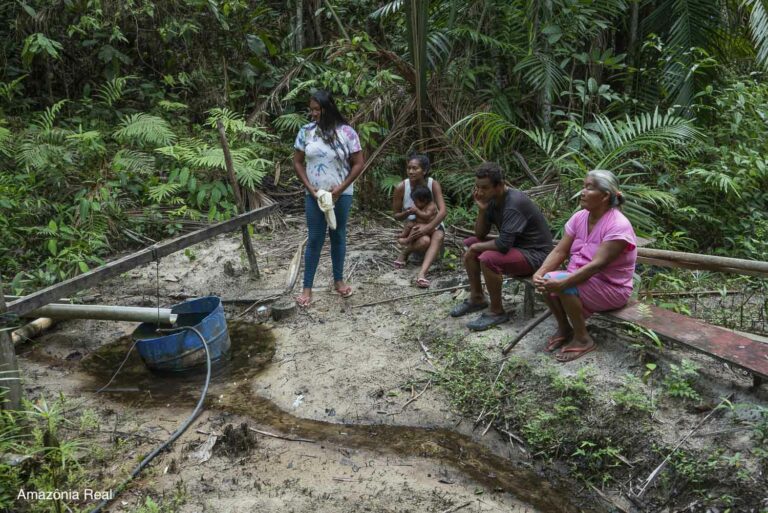
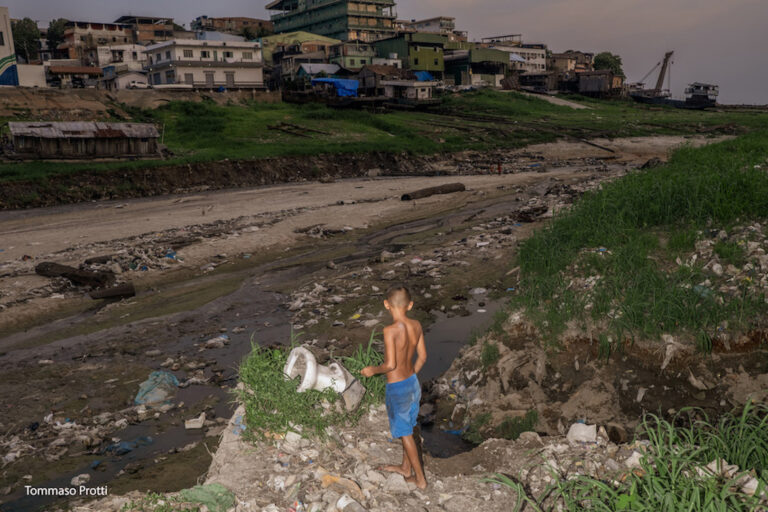
The Brazilian Amazon is experiencing the most extreme dry season ever recorded.
Aggravated by man-made global warming and strengthened by the El Niño phenomenon, which has not yet reached its peak, this exceptional drought has caused the Negro River – one of the main ones in the entire region – to fall to the lowest levels recorded in the last 121 years. Other major rivers such as the Solimões, the Purus, the Madeira and the Amazon itself are experiencing extreme levels of drought. According to forecasts, these severe climatic conditions will last at least until mid-2024.
The environmental consequences are dramatic, the thermal stress suffered by billions of trees increases their mortality, reducing the forest’s ability to generate its own rainfall. Over 150 dolphins have been found dead in an Amazon River lake where the water temperature reached 39°C, two degrees above human body temperature. Huge numbers of fish and other aquatic species are dying due to rising temperatures in reservoirs and decreasing oxygen content in the water.
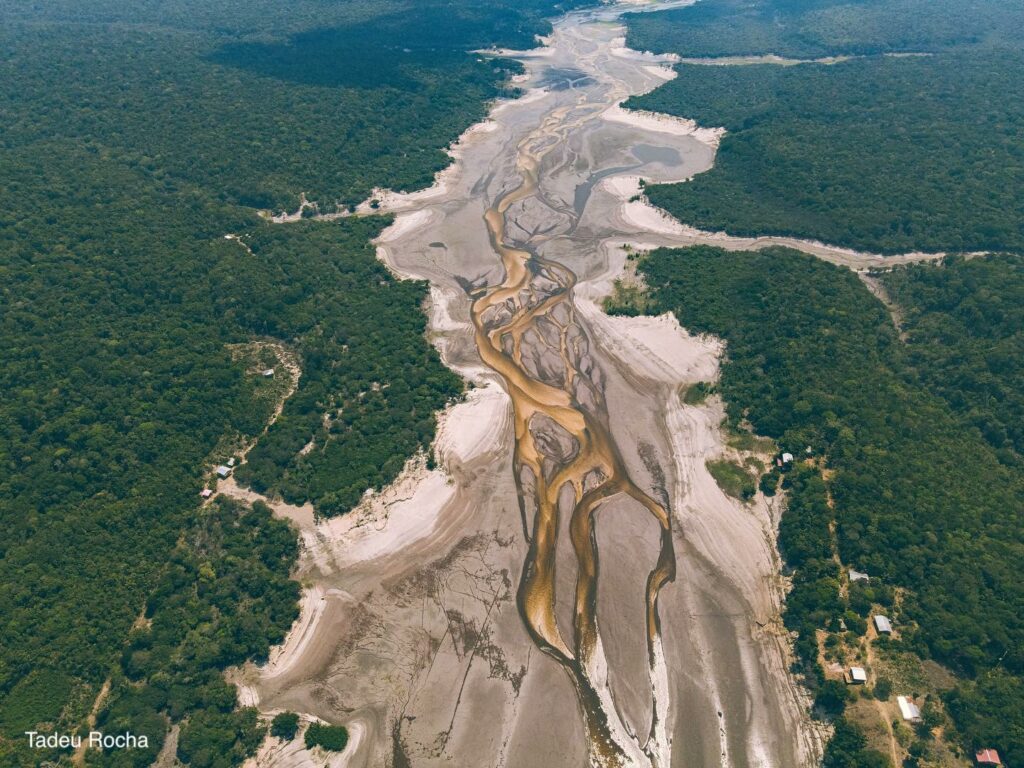
Water scarcity also has a direct impact on the lives of forest people.
Thousands of people are isolated in the most remote regions, the lowering of river levels hinders the flow of boats, the main form of transport in the region and the only means of access to health and educational facilities for many families. Drought threatens the daily subsistence of populations who traditionally depend on fishing and agriculture. In many villages the water is no longer drinkable and the risk of diseases and infections is becoming increasingly high.
We need urgent action and your contribution is essential!
- With a donation of 20 euros, you will guarantee drinking water for a native family for a week;
- With a donation of 45 euros, you will guarantee food for a week for a native family;
- With a donation of 70 euros, you will guarantee drinking water and food for a week for a native family;
- With a donation of 170 euros, you will guarantee drinking water, food and essential medicines for at least 3 weeks for a native family.
Thank you!
Special thanks to the photographers who kindly gave us these extraordinary images e to organize the crowdfunding campaign:
Amazônia Real IG @amazoniareal
Tommaso Protti IG @tomprotti
Tadeu Rocha IG @eu.tadeu
River of Light: children as Guardians of the Amazon – 2023 edition
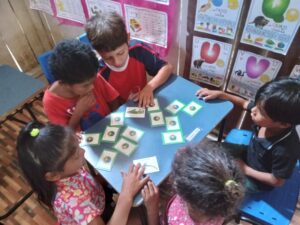
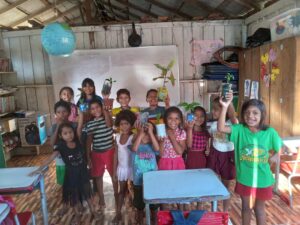
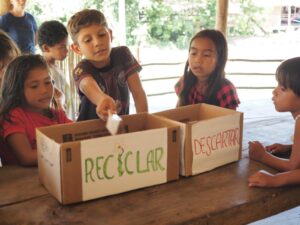
We believe that children are the key to a sustainable future: we want to transform them into bearers of knowledge, respect for the environment and defenders of the Amazon ecosystem.
The Baixo Rio Branco-Jauaperi Reserve is inhabited by approximately 1,500 people, divided into 14 communities. In the region there are no public policies for the management of solid and liquid waste (mainly plastic, sheet metal, aluminum and glass objects, household appliances, fuels, detergents and chemical products, etc.) and each village must independently provide for collection and disposal of the waste, eliminating it on site or transporting it to the disposal centers in the cities of Manaus and Novo Airão, approximately 400 km away. In the majority of cases, villages do not have river and economic means to deal with this transport and the waste produced lies near inhabited areas or is discharged into the river.
Despite the strong bond and dependence on the surrounding environment for food, travel, the construction of residences and means of transport, the inhabitants of the reserve have acquired habits and customs specific to the urban context in recent decades such as consumerism, use of plastic and fossil fuels.
The notion of the environmental risk inherent in the use of industrialized products did not arrive together with the globalization of consumption, There is a lack of knowledge to carry out adequate separate waste collection and correct separation of waste materials. There is a lack of awareness of the polluting potential of waste sewage and fossil fuels which are often discharged into rivers, deteriorating the water resources used for food consumption and personal hygiene.
Environmental education, understood as awareness of the value of the forest, its natural resources and the integrity of the environment, is an essential cornerstone for the conservation of the forest environment and therefore, for the survival and sustainable development of the populations of the region .
Over the years, Amazônia has carried out various environmental education actions, including the organization of courses and seminars for adults residing in the reserve, with the aim of containing harmful activities to the forestry heritage. We organized intensive workshops with theoretical lessons and practical exercises in the forest, with particular attention to climate issues. For the younger segment of the population, including children and adolescents, we have created numerous environmental education opportunities, through moments of reading, drawing, and educational games.
In 2022 we carried out a pilot project involving 5 schools in the Jauaperi Reserve. The project ended with great success and a unanimous request to continue from local communities, parents, teachers and authorities. autorità.
In 2023, River of Light expands, carrying out environmental education actions in the 14 schools of the reserve to disseminate the value of the forest, its conservation and traditional knowledge, waste management and its correct disposal and the measures necessary to prevent pollution of river waters.
Our Key Objectives
-Raise awareness in 10 communities about the importance of preserving the environment and the Amazon rainforest.
-Involve 185 children in cleaning the villages and the surrounding environment.
-Enhance the teaching skills of 10 teachers.
-Economically benefit 25 adults involved in the execution of the project.
-Involve 100 native families in the educational and economic benefits of the project.
-Contribute to strengthening the education of Native youth and the sustainable management of their communities.
How do we do it
Educators are helping to bridge the gap between traditional wisdom and contemporary understanding. Through engaging lessons and hands-on experiences, they are cultivating a generation of environmentally conscious individuals who will serve as guardians of the rainforest’s future.
Engaging Lessons: We use an approach that combines explanatory lessons with multimedia material adapted to the children’s age. Through educational videos, animations and photographs, we want to raise awareness among young people about the importance of protecting the environment.
Fun and educational activities: We have designed fun and engaging activities both in the classroom and outdoors. Through games, creative workshops, experiments and moments of sharing, we intend to strengthen children’s motivation and create a stimulating learning environment.
At the end of the journey, there will be a ceremony for the delivery of certificates of participation, inviting the families to take part.
The project is the result of collaboration between the education departments of Amazonas and Roraima, ICMBio, CoopXixuaú, Amazônia and Amazon Charitable Trust, with the support of Rothoblaas, Trentino Insieme, Fosit, Riccio Giramondo, Fondazione Quarta de Matteis and Torchiani Servizi Ecologici.
A big thank you to Projeto BioClimAmazônia – INPA and FAPEAM, Laboratório de Psicologia e Educação Ambiental – INPA for the teaching material and to the educator Renata Almeida for the precious work carried out.
This collaborative effort is a shining example of what can be achieved when diverse entities come together with a shared purpose.
Follow us to stay updated on this extraordinary journey and if you can, contribute to its success!
A NEW GRAPHIC LOOK
Our story begins 18 years ago, as a direct consequence of an encounter with the peoples of the forest. In the heart of the Amazon, in a small remote village, nestled in a luxuriant and intact primary forest, a group of experts, connoisseurs and passionate defenders of the environment establishes a pact of trust with the native population, with the common goal of protecting the forest. Forever.
Step by step, we have achieved increasingly ambitious goals and implemented projects to spread knowledge, protect delicate environments and chang the lives of many people.
This is why we decided to give ourselves a gift and renew our graphic design: a new logo, a new site, a new colour.
How do you like them?

New logo
The sloth has always been our symbol and describes our deep bond with the forest. We have stylized it, transformed it, even hidden it a little, but it is always him: the animal that best represents the spirit of our organization, the result of a slow adaptation to the environment, with which it lives in total harmony.
The species has a long evolutionary history, whose roots go back to the Eocene. For 35 million years, sloths have lived in tropical forests and have an intimate relationship with the trees on which they depend.
The evolutionary success of this slow and peaceful species is still a mystery. An exclusive inhabitant of the tropical forest, the sloth climbs high into the trees in the morning to get energy from the sun and, when it is very hot, returns to the shade. If sloths didn’t live in warm, humid environments covered by trees, perhaps they would move faster. But over countless generations, they have achieved a pace of life perfectly suited to its environment.
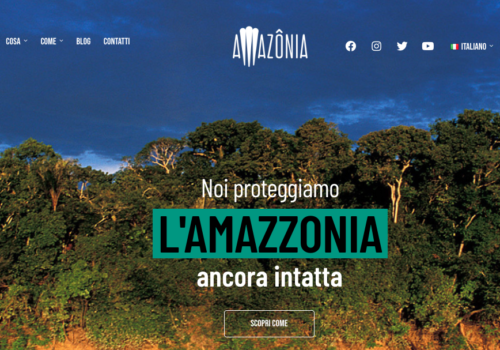
New website
The restyling also affected our website, which changed its look, becoming richer in updated content and information, more dynamic and engaging.
Through this new website we want to communicate and transmit what the Amazon has taught us in twenty years, to share experiences, successes and failures with you. We want to engage with you, tell you the stories of the people who live in the forest, share ideas and projects and spread a message of harmony and respect.
We want to continue to be inspired by nature, observe its balance and learn to respect it for what it is.
And who, if not the local people, can teach us the culture of respect?

New colors
The Amazon Biome contains the largest remaining tropical forest on the planet and the largest river, both in terms of length and flow.
If you have taken a look at our new website you will surely have noticed the uniqueness of the colour: a hybrid between green and blue, a mix of colors that wants to make us fly to the beating heart of the Amazon.
In that forest that is our home, where the bright green plants are reflected in the waters of the streams that flow through them.
Where the boundaries between heaven and earth are undefined. And undefined is also the color that was created especially for us.
We can call it Amazonian green, turquoise blue or forest blue… whatever name we give it, the fact is that by closing our eyes it will take us back there, to that magical distant world.
A big thank you to our partner VisiOnAir for the splendid graphic restyling. A precious gift for our 18 years!
River of Light, environmental education for traditional Amazonian communities
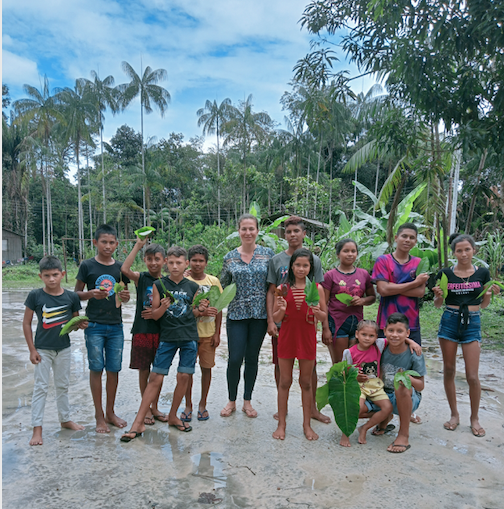
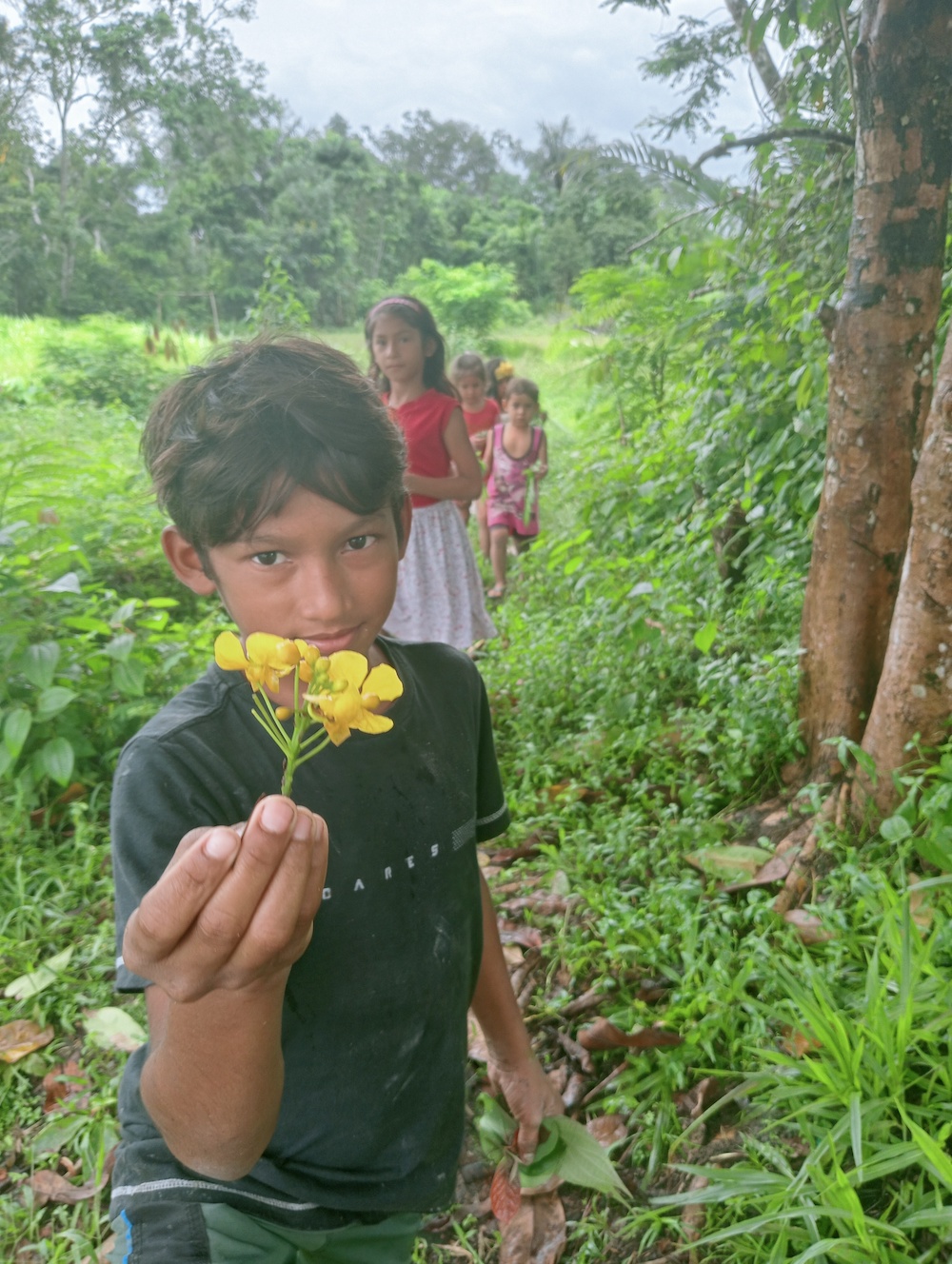
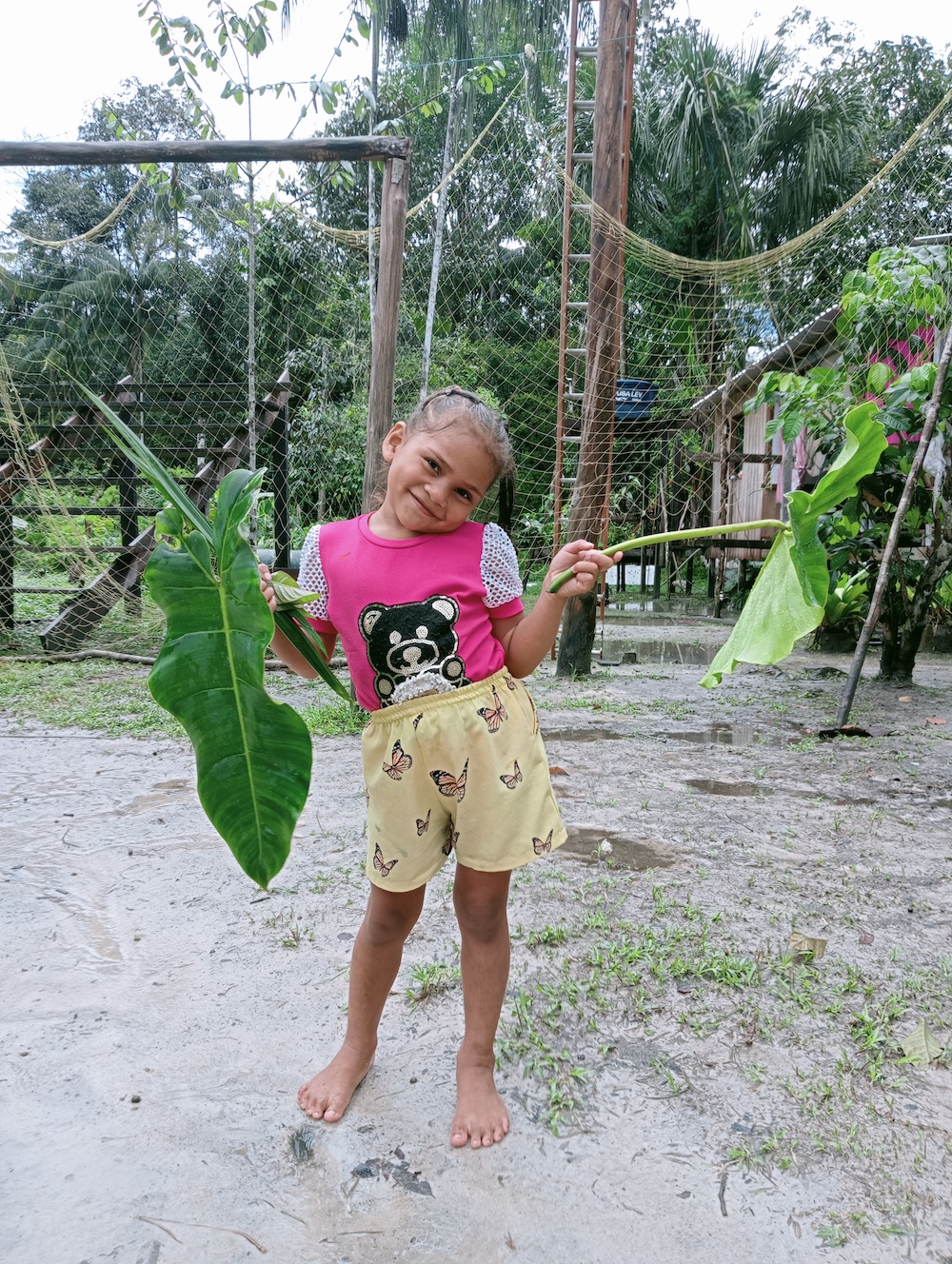
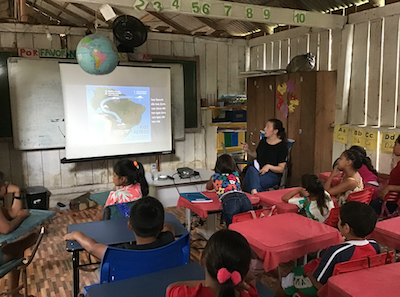
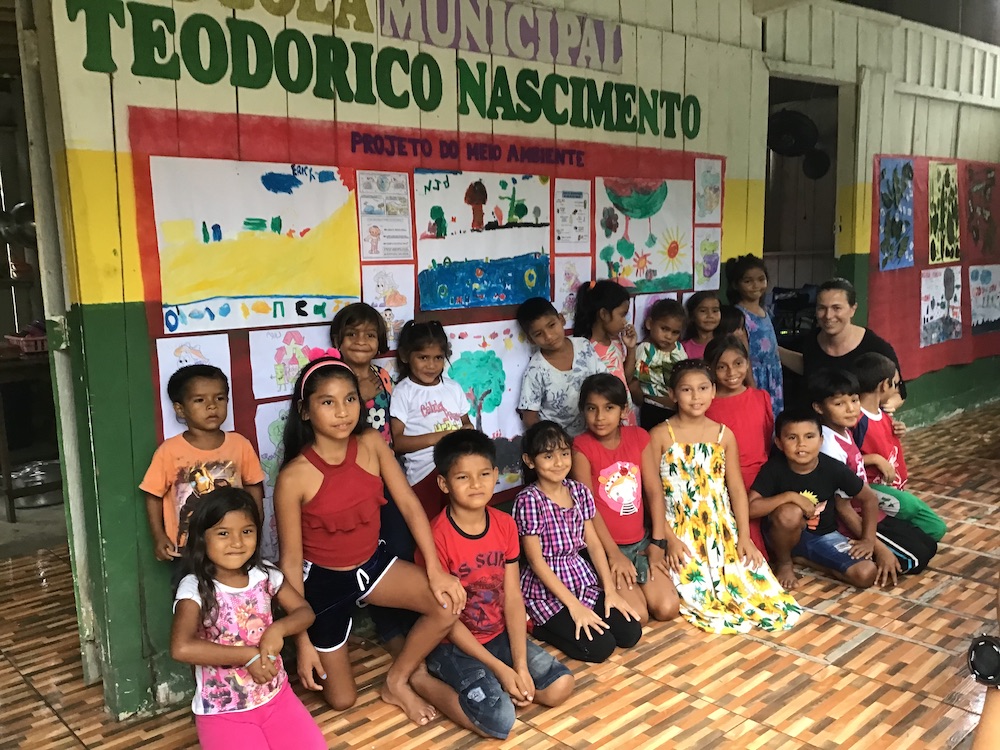
Our environmental Education project in the Amazon ended with success!
Peoples of the forest are its guardians and, for millennia, have lived in harmony with the surrounding environment. However, even in the most remote places of the Biome, new generations are facing difficult challenges: the transition to modernity, the use of technology and the approach to urban reality and consumerism.
With this pilot project, a partnership between Amazônia, Amazon Charitable Trust and CoopXixuaú, financed by Cerchi d’onda Onlus, we wanted to give new generations of people living in the forest some necessary tools to understand the value of a healthy and balanced environment and the need to keep it that way.
The project received the symbolic name “Rio de Luz” (River of Light), which links the river environment where the students live to the concept of light as a symbol of life and knowledge.
The activities, launched in January 2022 and concluded in June of the same year, involved five schools of the Jauaperi Extractive Reserve, in the heart of the Brazilian Amazon. The project wanted to offer the young generations of the beneficiary communities a model of environmental education in order to spread awareness about issues such as the value of the forest, its conservation, traditional knowledge, waste management, river water pollution and appropriate measures to avoid environmental degradation.
The lessons were held by an environmental education teacher, with the support of our staff and local teachers. The initiative received the patronage of the municipal school authorities and the support of the leadership of the traditional communities involved. Various methods were adopted to develop the goal: for the little ones we decided to carry out creativity and drawing activities; for the older ones, we opted for a greater depth of contents. The 70 pupils who benefited from the project watched videos and cartoons, listened to podcasts, had theory lessons and participated in practical training experiences such as separate waste collection. The activities were carried out both in classroom and outdoors, and allowed children and teens to independently reflect on the main themes of the course. Those activities made used various tools for each age group: games, drawing, music, creative and experiential workshops.
At the end of the course, a small ceremony was held to deliver participation certificates, in the presence of families, reinforcing the importance of environmental preservation in traditional communities and rewarding the commitment of the children and teenagers.
Today the Amazon Forest plays a crucial role in containing climate chaos and, therefore, in the future of humanity. The well-being of the forest also depends on the next generations of native inhabitants, who will be the most important guardians of this immense heritage of tropical biodiversity!
We thank all the participants, teachers and partners involved and we look forward to new collaborations in favor of the forest and for the future of the Amazon and humanity.
ABC, Amazon Biodiversity and Carbon Expedition
An unprecedented scientific expedition. The first large-scale and multidisciplinary one built in the Jauaperi Extractive Reseve.
The team, based in Xixuaú and led by prof. Carlos Peres of the National Institute of Research in the Amazon (INPA), brought together 24 people, including researchers and students from numerous Brazilian institutions including the famous Emilio Goeldi Museum in Belém and the federal universities of Amazonas, Santa Catarina and Rio Grande do Sul.
Amazon, Biodiversity and Carbon Expeditions is the full name of the project that mobilized an unprecedented task force in uncharted forest areas for 15 days of intensive research.
The purpose of the expedition was to carry out a quantitative survey of the biodiversity of the undisturbed terra firme forest, including vertebrates, plants and non-vertebrates, such as small and large mammals, birds, lizards, frogs, fish (using eDNA from water samples), ferns, trees, beetles, bees, ants, termites and other dipters. The survey also included the measurement of forest carbon stock and epigeal biomass, soundscapes using automatic recorders and the use of photographic traps.
In the coming years, ABC Expeditions will carry out a multi-taxa expedition in each of the 12 main river basins, covering all 9 states of the Brazilian Amazon and gathering important information for the future of the Biome.
We are proud to have contributed to the first major scientific expedition in the reserve and very eager to see (and show you!) The first results and the first images recorded!
Stay tuned!
————————————————– ————————————————– ———————————————
The expedition was made possible thanks to the support of the Norwegian University of Natural Sciences, the Amazon Charitable Trust and Amazônia Onlus, with the logistical support of CoopXixuaú and the consent of the Chico Mendes Institute for Biodiversity – ICMBio.
All team members were doubly vaccinated and tested for Covid 24. All activities were carried out in the open air and all anti-Covid protocols respected.
Doctors of the waters – health by sailing
The Doutores Das Águas ambulance boat goes upstream against the current, bringing treatment and medical assistance to the most isolated villages of the Amazon River basin. Weeks of navigation, dozens of stops to visit around 2000 natives in each expedition. For many of them it is the only opportunity to meet a doctor or a dentist and the only opportunity to obtain basic medicines for their own well-being and that of their children.
Normally, the boat is full of volunteers: doctors, nurses, dentists, dental technicians, educators and animators form a team of 50 people on board. This year, due to the restrictions imposed by the anti-Covid protocols, the medical team was reduced to personnel with double doses of the vaccine and the activities were rethought in line with the anti-contagion security measures to avoid gatherings and contain the spread of the virus.
The staff, reduced to 20 specialists, offered specialist visits, dental and minor surgery, medication, ordinary vaccines as well as tests for hepatitis and sexually transmitted diseases, the latter of which (in particular syphilis) were found with a higher incidence than what emerged from the screening carried out in 2019.
Amazônia supports health actions with the aim of promoting the improvement of health indicators and the quality of life among the peoples of the forest.
For this reason, we also support the vaccination campaign against Covid19. In collaboration with the Health Departments, we work to raise awareness among the population, keep the natives informed about the arrival of vaccines and support the transport costs of the most isolated families to vaccination places.
A special thanks to ACQUASAN for allowing the trip of the “river doctors”!
Watch the video of the trip!
Rio Negro record: flooding emergencies in the Amazon
Amazônia Onlus’ appeal: “Floods cause vulnerability, loss of property and disease. Families have to leave their homes. We need everything. “
“In the Amazon we are experiencing exceptional flooding. This year the port of Manaus recorded a record level of 30.02 meters on the Rio Negro, the highest since 1902, when the measurements began. With water invading the houses on the banks of rivers, the local population is in a situation of extreme vulnerability. They are losing their assets and are increasingly exposed to the risk of contracting diseases, as well as food safety problems. Covid was not enough “. Emanuela Evangelista, directly from the Amazon, tells what is happening in the rainforest: an emergency that is still not talked about abroad.
“Floods are ordinary seasonal events to which local populations are accustomed and normally prepared to face, but the Amazon is increasingly affected by extreme phenomena, probably exasperated by climate chaos”, says the president Amazônia Onlus, highlighting that this year all the normal precautions were not enough.
The Amazon basin has its natural cycle: from June to November, with the so-called “vazante”, the water drops and from December to May the water rises, flooding the area. In the last decade, according to the findings of the Rede Hidrometeorológica Nacional, the ebb and flow process has become more pronounced, with increasingly extreme water levels in rivers.
Following the exceptional floods in progress, crops are ending up under water along with small farms, fishing is becoming increasingly difficult due to the vastness of the flooded areas. Getting food has become increasingly difficult and many families have had to leave their homes in the midst of the pandemic, despite living on stilts. Everything is needed: food, drugs, hygiene products, fuel for travel, economic resources to repair the damage and rebuild.
We have alerted local authorities, collected images and testimonies and sent petitions for a state of emergency to be declared. We will bring help in this difficult time and in post-flooding, when it will be necessary to assess the damage and remedy it.
Let’s not leave them alone.
Make your donation and help the forest and its inhabitants in need.
Donate by clicking here.
The forest is protecting us – with your help
Exactly one year ago, on February 17th, Emanuela Evangelista, president of Amazônia Onlus, was appointed Officer of the Order of Merit of the Italian Republic by the President of Italy Sergio Mattarella, who spoke the following words: “For her continued commitment, at an international level, to protect the environment and the indigenous people, and to fight deforestation”. At that specific moment, no one could imagine that only a month later – on March 11th, 2020 – the World Health Organization would have declared a pandemic. And we, Amazônia Onlus, could not envisage the challenges to come. In 2020, the Covid emergency had a devastating impact on the Amazon and, recently, it has intensified.
A new strain of the virus has swamped the health system in Manaus for the second time, and it is quickly spreading inland now. The daily oxygen requirement in the capital of Amazonas is 80,000 liters per day – 3 times the normal amount – and the local production cannot keep up with the tremendous demand. Indigenous and traditional communities have only one way to protect themselves from the virus: stay in the forest.
The small Amazonian villages, which are isolated and accessible only by boat, have neither food shops, nor health care, nor medicines, nor emergency transport. This situation makes the inhabitants extremely vulnerable in case of infection. Fishing, hunting, and harvesting supply most of the food, but they also rely on exchanges with faraway cities. Isolation in these regions creates a food security problem. They need provisions, equipment for getting food, medicines, hygiene products, and goods for basic necessities.
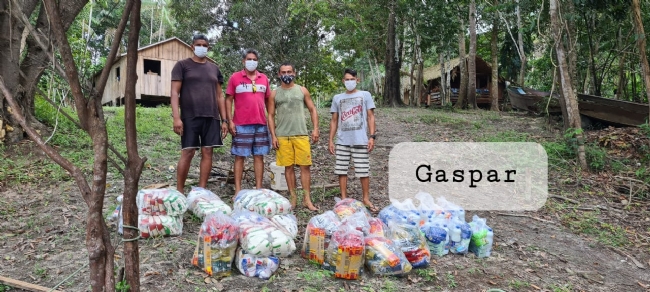
The lack of supplies can compromise their self-isolation attempt and endanger the entire population. For this reason, since the beginning of the pandemic, Amazônia Onlus has focused its actions to protect the natives from infection. It is a new challenge to us and we carry it out with the methods and the means typically employed by a humanitarian emergency organization. With our partner Amazon Charitable Trust we developed an action plan to increase the resilience of local communities, disseminated important information, rapidly transferred funds from Europe to Brazil, created and strengthened a network of organizations. Since April 2020, we have already delivered 40 tons of products to the 250 families of the Jauaperi National Park, with approximately 1,200 inhabitants.
Today, we are constantly in contact with the closest hospitals to which, with your help, we want to donate cylinders and oxygen concentrators. The forest is protecting us, but the emergency continues, and our campaign goes along.
With € 100, we can guarantee food and basic goods to a family for a month.
With € 1,000, we can purchase an oxygen concentrator and save a life.
Let’s not leave them alone! Donate by clicking here.
Deforestation and pandemic in Brazil – the Amazon Forest in flames
The current COVID-19 pandemic has been aggravating the situation of deforestation in the Amazon, further endangering the survival of poor people and local communities. Brazil is currently the epicenter of the COVID-19 pandemic, with nearly 80 K deaths and more than 2 million cases. With the fire season that is about to arrive, their effects will further worsen Amazonian deforestation and breathing problems caused by the virus. According to the Brazilian National Institute for Space Research (INPE), in the first three months of the year 2020 there has been a 50% increase in deforestation if compared to the previous year. Farther, researchers of the Andean Amazon project (MAAP) counted more than 900 hundred fire outbreaks in the first half of June, leading to a 40% increase compared to the same period of 2019. Specialists also believe a rise in forest fires could increase breathing difficulties in a population already badly hit by the new coronavirus. Hence, the combination between the virus and the fires could have severe consequences on health conditions of the local population. These issues are affecting poor people and local communities, whose incapacity to practice social distancing and limited access to health facilities is undermining their chances of surviving. LET’S NOT LEAVE THEM ALONE!
Amazonia Onlus, Xixuau Amazon Ecolodge and Amazon Charitable Trust support local people, who have always protected the Amazon Forest.
To donate via Credit card, Google pay or Apple pay CLICK HERE
To donate via Paypal or Bank transfer CLICK HERE
Thank you!
Brazil: Amazonians hit hard by Covid19
New infections and new deaths occur every day in Brazil but the Amazon region is the highest risk region. The virus is spreading with great speed, 90% of the municipalities are already affected, even inland, in isolated villages and in indigenous lands, where numerous deaths have occurred. It is impossible to say exactly how many cases there are.
Thousands of infections are reported every day but the figures are underestimated because the availability of tampons is scarce and the lack of communication with isolated populations does not allow a widespread control. From the small village of Xixuaú, on the banks of the Rio Jauaperi, where the local cooperative runs the Xixuau Amazon Ecolodge, the Italian biologist Emanuela Evangelista, president of Amazônia Onlus, an organization that since 2004 has worked to offer health, training, work, income and sustainable development to the inhabitants, speaks to us. “The pandemic in the Amazon still shows exponential growth and without immediate action the impact will be disproportionate. The state of hospitals is dramatic: beds are missing, there are not enough respirators and supplies.
The bad social and economic conditions of the region and the great distances are not helping to deal with the emergency. ” The Jauaperi National Park, in the northern Brazilian Amazon, is home to around 1000 natives residing in 14 villages on the banks of the river, 400 km from the nearest city. The small villages are isolated and accessible only by boat, they have no food shops and no health care or medicines, which makes the inhabitants extremely vulnerable in case of infection. The population thrives on traditional activities such as fishing, hunting and the collection of forest products, but survival also depends on distant cities which constitute an essential network of trade and commerce.
To reduce the risk of contagion, the natives have stopped moving towards urban centers, taking voluntary measures of isolation and staying in their forest. However, isolation creates a problem of food safety and supplies: they need food and materials to hunt and fish, they need medicines, hygiene products and basic necessities.
The shortage of supplies can compromise the attempt at self-isolation and endanger an entire population with children, pregnant women, the elderly and vulnerable people. “We are delivering the necessary for the survival of all the families of the Park. More than 300 families have already received 20 tons of supplies, but that will not be enough, so our mobilization continues”, says Evangelista. The closest city to the National Park is Manaus, capital of the state of Amazonas, a metropolis with the highest rate of contagion and death in the region, where the pandemic forces cemeteries to collective burials. Some raw materials are already in short supply and the organizations involved are racing against the clock. To finance the operation, a crowdfunding campaign has been launched and all the money that is collected will be entirely dedicated to supporting the families of the Park at this critical moment. To contribute through credit card, Google Pay or Apple Pay hereTo contribute via Paypay or Bank Transfer here The campaign is supported by Amazônia Onlus and Amazon Charitable Trust, thanks to the collaboration of Lojas Bemol, ICMBio, Doutores das Aguas and with the logistical support of CoopXixuaú and representatives of the park villages.
Emanuela Evangelista Officer of the Order of Merit of the Italian Republic
February 17, 2020, Quirinale Palace, Rome. The ceremony for the appointment of Officer of the Order of Merit of the Italian Republic to Emanuela Evangelista was held.
“For her constant commitment, internationally, to environmental protection, the protection of indigenous peoples and the fight against deforestation” these are the words of the President of the Republic Sergio Mattarella for Emanuela Evangelista.
An undoubtedly touching but also rewarding ceremony for the Roman activist, who came to Italy from Brazil for the award ceremony. “I am very excited and happy to be here – said Emanuela – this title is not only mine. It also belongs to the people in the association and to the natives who are constantly engaged in this huge job. All this will push us to do more, but it is necessary that Italy and the Italians become aware of the great responsibility we have in the ongoing destruction. For this I thank President Mattarella for his sensitivity in identifying the urgency of a theme that needs continuous attention, not momentary, and on which the future of humanity depends. “
Member of the Species Survival Commisson (SSC) of the International Union for the Conservation of Nature (IUCN), Emanuela Evangelista is also President of Amazônia Onlus, based in Milan and Vice President of the Trentino Insieme association, based in Trento.
In the Amazon since 2000, Emanuela lives in the small village of Xixuaú, on the banks of the Jauaperi River, in the heart of the forest. “Our work aims to eradicate poverty – she explains – in order to reduce the trend towards urban migration, typical of the region. We work to offer health, training, work, income and sustainable development to the natives, indispensable guardians of the forest. Indigenous peoples have always needed the forest to survive but the forest today, in the current scenario, needs its inhabitants in order to remain standing. “
The role of ecotourism is fundamental which, together with the sustainable harvest of forest fruits, crafts and scientific research, constitutes an important source of income for many families. Training of health and agricultural technicians, management, leadership, IT and language courses, artesian wells, community gardens and medical missions and, moreover, schools, internet connection, boats and motorboats to get out of isolation and to start new activities. There have also been many opportunities for cultural exchange through travel to other regions of the Amazon and Brazil but also to Europe and Africa.
In 2018 this area of 600 thousand hectares of protected tropical forest aimed at the sustainable use of natives (about 1000 people distributed in 14 villages), was recognized as a National Park (Extractive Reserve of the Lower Rio Branco and Rio Jauaperi), becoming symbol of conservation and fight against climate chaos.
“The Amazon risks becoming a savannah in just 15 years. My appeal to the Italians – the biologist concludes – is to act. We are still on time, but we must act now. We have the economic resources and the necessary technologies and to reverse the course and return the planet to a safe area. But we’re not going fast enough. It is necessary that citizens and all Italian consumers put pressure”.
Order of Merit for our work!
Emanuela Evangelista has been awarded the position of Officer of the Order of Merit of the Italian Republicby Sergio Mattarella, President of the Republic.
The high honor was communicated on 21 December 2019 and motivated “for her constant commitment, internationally, to environmental protection, the protection of indigenous peoples and the fight against deforestation”. “I am honored and moved by this recognition,” said Emanuela. “I receive news of it just as I am in Manaus, the chaotic capital of the state of Amazonas, which expresses with its contradictions the suffering of native populations and at the same time the urgency and complexity of the necessary solutions. My first thoughts and thanks go to the inhabitants of the forest, for without them no work to protect the immense Amazonian heritage would be possible.
Understanding their needs is the basis of our work, which offers them concrete alternatives for development in harmony with the environment. Understanding the reasons that move a country towards choices that we can apparently not share is the first step in constructive and necessary dialogue. I believe that environmental protection is a tool for fighting poverty and therefore an instrument of peace in the world, for this reason I hope that the concession of this important honor will bring more and more attention to the theme of the future of the Amazon and multiply the efforts towards common and possible solutions. “ Biologist and environmental activist, Emanuela Evangelista is a member of the Species Survival Commission (SSC) of the International Union for the Conservation of Nature (IUCN), President of Amazônia Milano Onlus and Vice President of Trentino Insieme, organizations engaged in international cooperation, aimed at promoting the conservation of the forest and the contrast to the exodus of the natives, about 1000 people gathered in 14 villages.
Together with the inhabitants of the Jauaperi River, located between the Brazilian states of Amazonas and Roraima, the organizations have carried out sustainable development projects and actions in defense of the right to health and education. Ecotourism, for example, has become a source of income and work for many families, together with the sustainable harvesting of forest fruits such as the Brazil nut and the protection of endangered river turtles. The region has recently been recognized as a National Park (Extractive Reserve of the Lower Rio Branco and Rio Jauaperi), 600 thousand hectares of tropical forest protected and designated for the exclusive sustainable use of the natives. The area, more than half the size of Jamaica, is added to an important corridor of conservation units and represents a key result for the fight against climate chaos.
School in the forest
Diversity of forests, diversity of schools and lifestyles: in this way the children of the Xixuaù elementary school and of the elementary school Tomasi of Villazzano in Trentino discover the two worlds at a distance and grow together in respect for the environment.
For the past two years children have been communicating with letters and drawings, raising funds for the restoration of the Xixuaú school and forming a training alliance for their growth. Thanks to our volunteers Giacomo Pontara and Laura Raia who came to visit us!
A new protected forest in the Brazilian Amazon
The native inhabitants of the Brazilian Amazon are celebrating a new protected forest!
On the 5th of June, World Environment Day, 581,173 hectares of forest around Xixuaú were granted legal protection. The area, more than half the size of Jamaica, integrates an important corridor of conservation units and is a key area to tackle climate change.
The new Reserve is superb news for the people engaged in the fight for the conservation of the Amazon as it is a step further in the protection of the forest and its traditional inhabitants.
Named the Extractive Reserve of the Lower Rio Branco-Jauaperi (RESEX), the new protected area has been created responding to a request formulated 17 years ago by the community of Xixuaú. In 2004 other villages along the Jauaperì joined the original request and since then the inhabitants of the Rio Jauaperi and the Rio Branco, in the states of Roraima and Amazonas, about 1.000 natives grouped in 10 villages, have militated with the support of local and international NGO’s such as Amazônia Onlus, Fundação Vitoria Amazônica, ISA and WWF Brazil to guarantee a long term sustainability of their forest.
The area presents a great biodiversity and a high state of conservation, with a priceless landscape and biological value.
A RESEX is a Conservation Unit specific to the territory of traditional extractive populations. The basic objective of this category is to conserve the livelihoods and culture of these populations, which maintains local biodiversity and the forest, and whose way of life is based on low impact fisheries and plantations, as well as collecting Brazil nuts, copaiba and fibres.
Victorious in a battle that lasted 17 years, we all look at the new phase starting now as the possible end of a cycle of conflicts and illegal exploitation of resources.
We would like to thank the many people that have dreamt with us and supported our work at Amazônia Onlus during this long journey with the words of our partner Claudio Maretti, vice-president of the World Commissionon Protected Areas of IUCN:
“Thanks to each of us, and all of us, many people, but above all the native inhabitants of the forest, in every place we have been, in every position we occupy, in the way we have been able to contribute! You cannot get something important by yourself. Never! A new phase starts now!”
Amazon illustrations exhibition
A big success for the new Amazonia Onlus exhibition, entitled “Amazzonia Bambina” and set up in Brescia at the PInac Foundation.
The exhibition collected the beautiful illustrations made by the native children of the villages of the Jauaperi River, in the Amazon, and the traditional handicraft market made by the women.
The inauguration of the exhibition presented suggestive classical and baroque music shows, as well as an exciting moment of poetry.
Thanks to everyone for having so warmly participated and a special thanks to Anna Compagnoni of Celacanto Cultural Association, Paola and Chiara, the excellent artists Franco Anzalone and Maria Antonietta Belotti and all the volunteers!
Medical supplies for the Jauaperi
Plasters, bandages, latex gloves, surgical masks, syringes, sterile gauze and disinfectant for the Amazon natives.
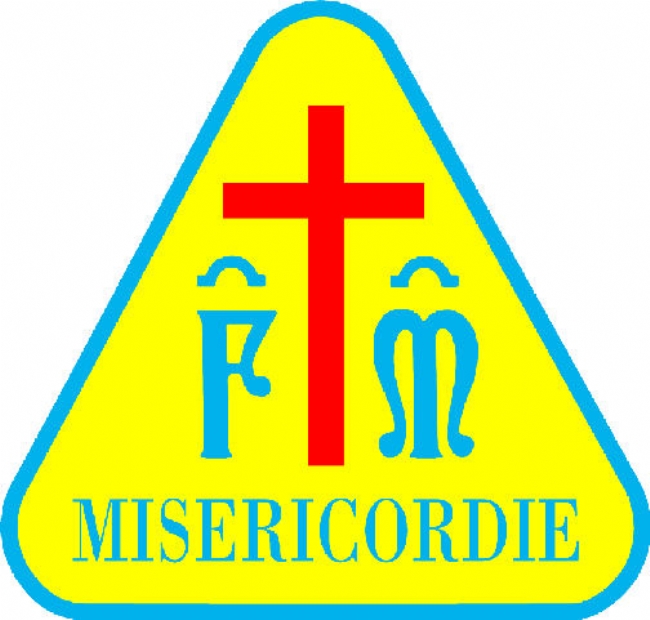
It is the precious contribution donated by the Misericordia di Viterbo to our Health Project, aimed at enhancing the health care in the local communities of the Jauaperi river.
Maryba Project: environmental education
In collaboration with our partner Trentino Insieme Association we organized a series of lectures and meetings in class for the high school teenagers and the elementary school children in Trentino, in the north of Italy.
A special thank to our environmental educator Giacomo Pontara and to the Autonomous Province of Trento for the long term support to our projects!
(Drinking) Water to the rainforest!
The community of Xixuau has recently received a donation from Amazonian Alliance of two sandbase water filters to provide the community the access to safe drinking water.
Because of their effectiveness, ease of use, and lack of recurring cost, biosand filters are considered the best technology to bring clean water in remote community areas.The installation of the water filters has been organised by Amazon Charitable Trust with the contribution of Amazônia Onlus.
The Xixuau at the 2016 Agenda Brazil
During its 5th edition, Agenda Brasil takes a look on the stories about the increasingly multifaceted and richly problematic Brazilian reality, seeking new accents and reinterpret the proposals of the previous editions. Cinema, live music, literature: voices from Brazil.
Included in the 2016 Agenda Brasil, there’ll be also our Xixuau Project, presented in many events, concerts and happenings organized in Milan in November. In partucular, the Xixuau project will be introduce by Chiara Tosi during the charity music show “Vaporosa”, with the famous musicians Rinaldo Donati e Roberto Taufic.
All the funds raised will be donated to Amazonia Onlus for the Amazon natives.
A coffee for the Amazon!
We are honored to receive the support of the association 1 Caffи, founded by the famous Italian actor Luca Argentero! We thank him and all his staff for choosing to help us promote and support the Xixuau Project!
Xixuaú at EXPO 2015!
Xixuau as a model of environmental sustainability, through the use of solar panels and electric motors, new sustainable energy solutions for the countries of the South.
30 October at 2.30 pm, at Cascina Triulza, EXPO MILANO 2015. Spokesperson: Chiara Tosi, Amazonia Onlus.
Education and training in Xixuau
We have just completed the new training courses dedicated to the inhabitants of Xixuau.
Thanks to the MarybaProject, also financed by the Autonomous Province of Trento, we were able to organize lectures and practices of tourism management, receiving visitors and English. Some lessons involved the local children, who took part in recreational games, didactic activities and workshops.
Medicines for Xixuau
With support of the environmental organization ForPlanet, our historical partner, an important result for the Health Project has been achieved to improve health care for local people.
The Pharmaceutical Bank Foundation, a non-profit organization founded in 2000 through collaboration between Federfarma of Milan and the CDO, has decided to ensure the Xixuaú and neighboring communities the periodic supply of medicines, health centers and surgical instruments.
Cooperativism at Xixuau
We continue our active collaboration with the Fundação Vitoria Amazonica, an important organization committed to the protection of the rights of the caboclos.
We have just concluded a professional course entitled “Management of Cooperatives and Associations”, held in the Community Xixuau and later in the village of Caicubi, the Rio Jufaris.
The course was attended by the leaders of CoopXixuaú (3 directors, 3 Fiscal Councilors, two secretaries), workers of the hospitality and reception of ecotourists (1 administrator, 1 operator in Manaus, 4 assistants, 4 cooks, 5 attendants) and the staff in charge of relations with ecotourists (17 environmental guides).
The lessons were conducted by qualified personnel from the Brazilian organization Fundação Vitoria Amazonica, our partner in the Getting Reddy project and certified body at national level for education and training activities for the benefit of the natives of the Amazon.
The reliability and success of the course was guaranteed by the competence of the Fundação Vitoria Amazonica and its deep knowledge if the socio-environmental issues in the region of Rio Jauaperi.
Xixuau’s new outboard
Xixuau community finally has a new boat, which will be used for the transport of the local inhabitants in case of medical emergency and also to speed up the journey of our eco-tourists. A big thank you goes to the association Trentino Insieme and the Autonomous Province of Trento, which helped us to achieve this important result!
The natives of Xixuaú in Italy
In September 2014 two natives of the Amazon rainforest visited the main Italian cities – Rome, Trento, Milan, Modena – to give the public their testimony on the importance of tropical forests and on the social status of traditional populations of the Amazon. As the spokespeople of the Xixuaú Community, they also told the audiences about the benefits of the projects implemented by Amazonia Onlus, which for over 10 years has worked to ensure education, health and sustainable development for the traditional communities of the Amazon forest.
Thanks Aluisio, thanks Francisco, it was nice having you with us!
The Amazon goes to Africa
Thanks to the project Getting Reddy, after the visit of our Tanzanian friends and partners to the Amazon in April 2012, for the first time the Xixuau community leaders undertook an adventurous trip to Africa. A Brazilian delegation went to Tanzania to visit the area of the forest which is protected through the project. There, the Caboclos could admire the stunning mountains of the Udzungwa, one of the richest biodiversity hotspots in Africa. They could also see wild animals in Mikumi National Park and the pristine beaches of the Tanzanian coast. During the many meetings with the African authorities, the Amazonian leaders explained their method on how to protect the forest through ecotourism and the sustainable management of forest resources. See the photo report.
Written by Chiara Tosi
A visit from Africa
A delegation from the organization Tanzania Forest Conservation Group and the Tridentino Museum of Natural Sciences came to Xixuaú. The visit was one of the activities of the project Getting REDDy, in partnership with Trentino Insieme and funded by the Government of Trento, fostered cultural exchange and sharing of experiences between the Amazonian and African realities.
The Tanzanian representatives spent ten days at Xixuau and had the opportunity not only to get to know the ribeirinho culture and the environmental characteristics of the region, but also to explain the activities conducted in their country, including beekeeping, sustainable agriculture and Community forest management.
Written by Emanuela Evangelista.
New Malocas
A large communal Maloca hut for eating and relaxing and five smaller Malocas with two twin bedrooms and private bathrooms mean that we can now host up to 20 people. These malocas are still in traditional local style but with red tile roofs instead of thatch, to reduce maintenance and increase their life span.
They also have solar powered electricity.
The new structure was inaugurated during a visit by Rolando Pizzini, from the association Trentino Insieme which helped obtain funding, as well as a team from RAI Italian Tv, a reporter from National Geographic and another documentary team led by the presenter Tessa Gelisio.
Written by Emanuela Evangelista
